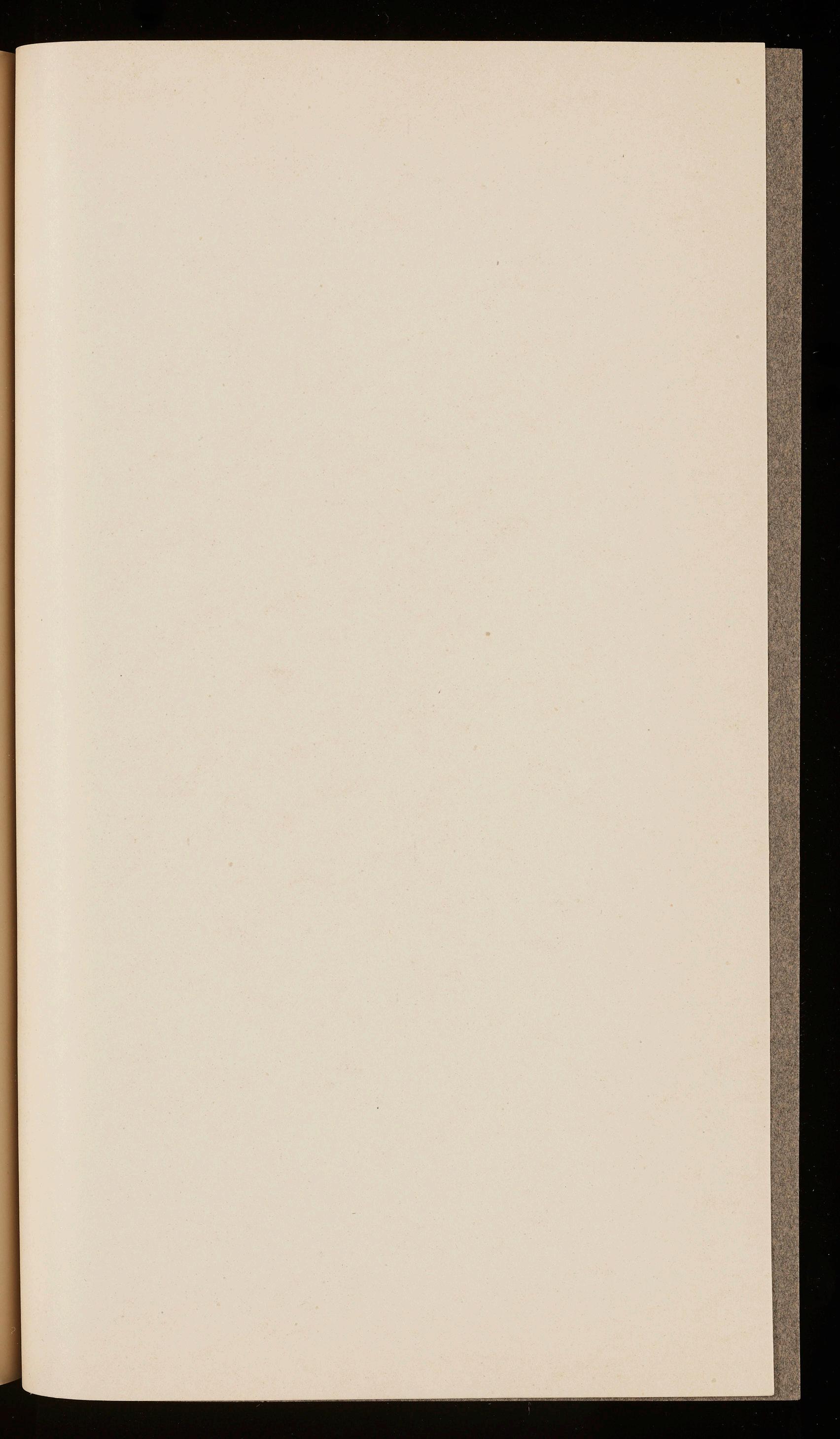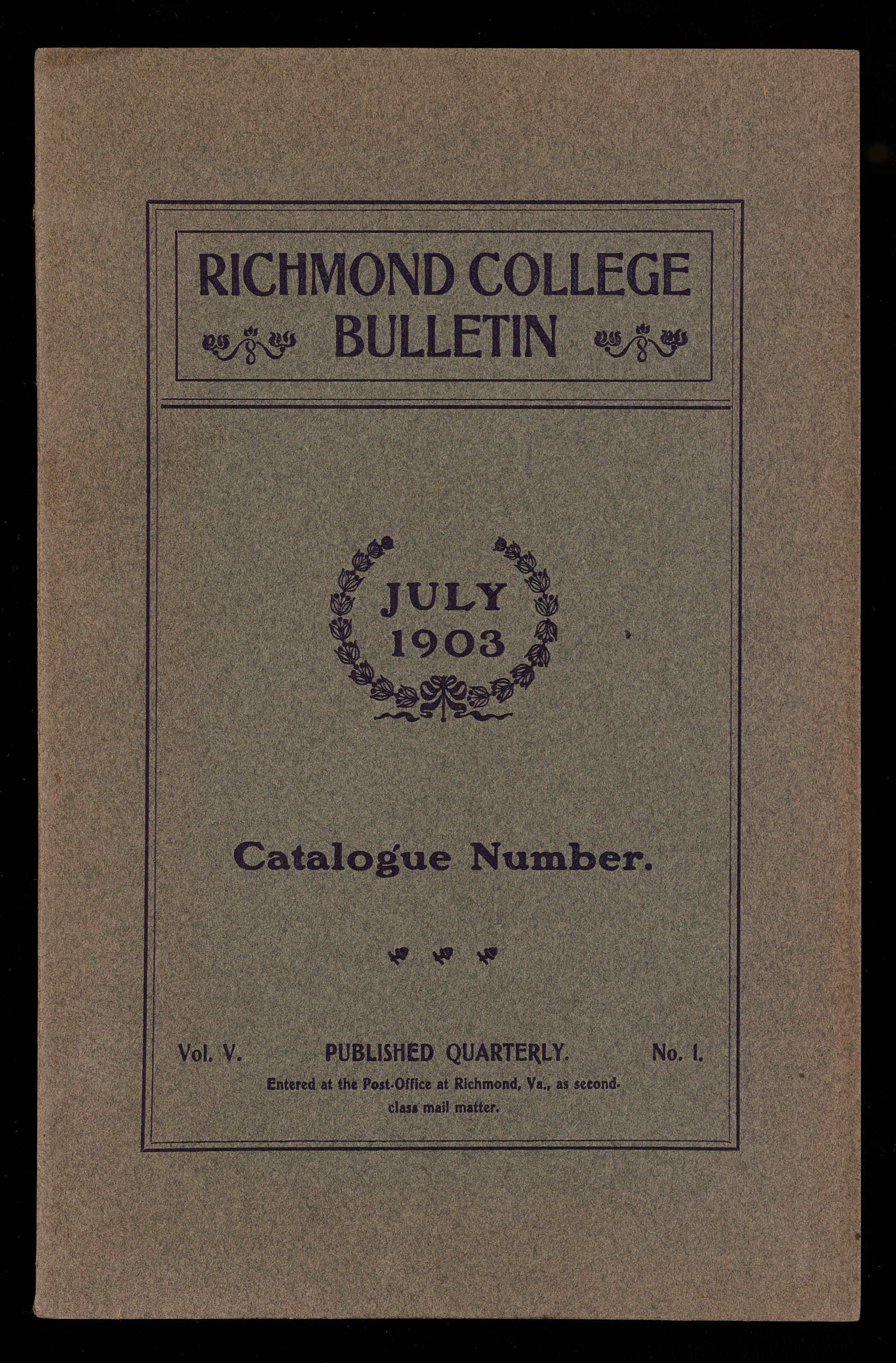
Enteredat the Post-Offtceat Richmond,Va t as setond. clua ·m~JImatter.


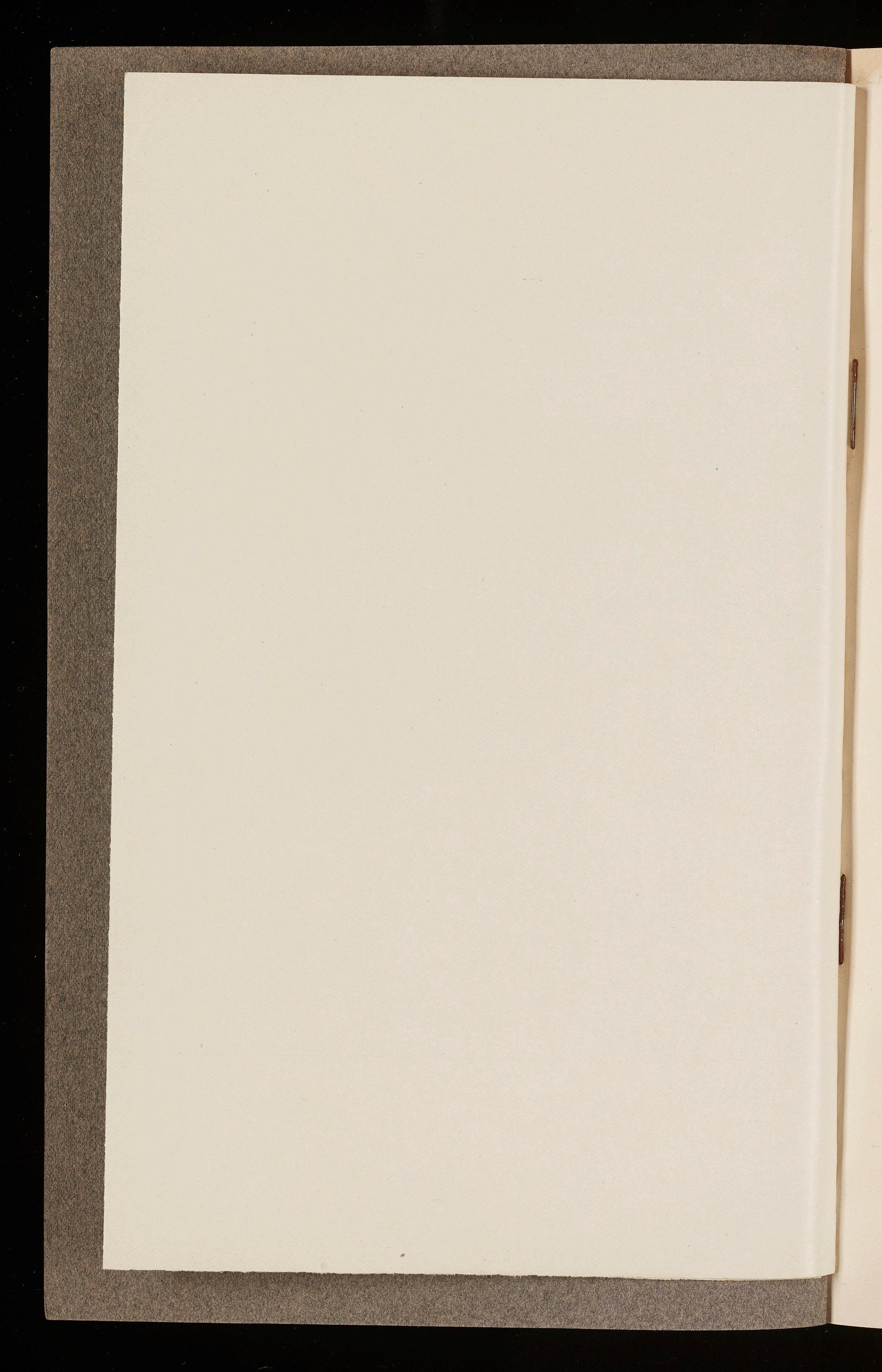


Enteredat the Post-Offtceat Richmond,Va t as setond. clua ·m~JImatter.



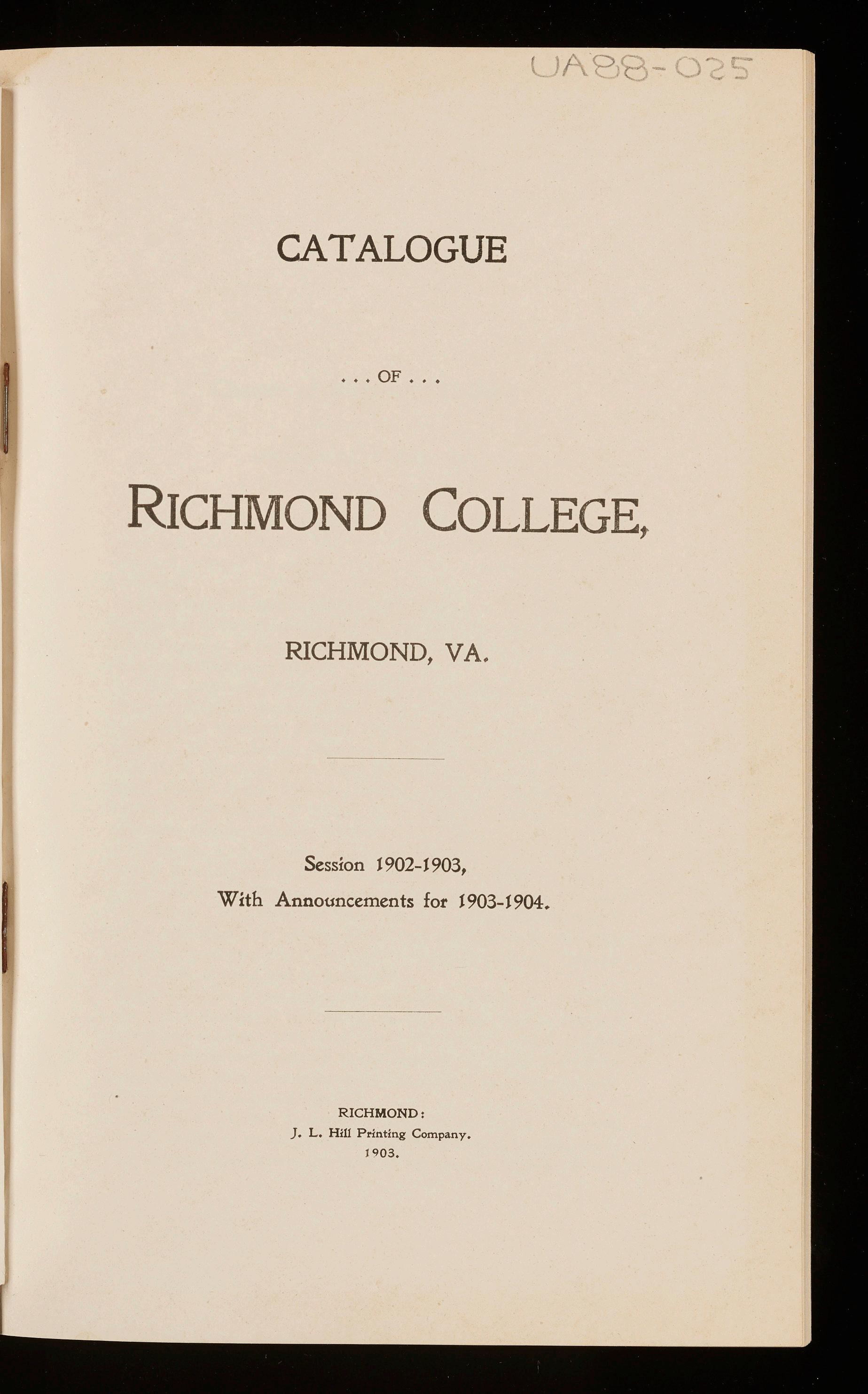
Session l 902-l 903, With Announcements for 1903-1904.
RICHMOND: J, L. Hill Printing Company. J q03.
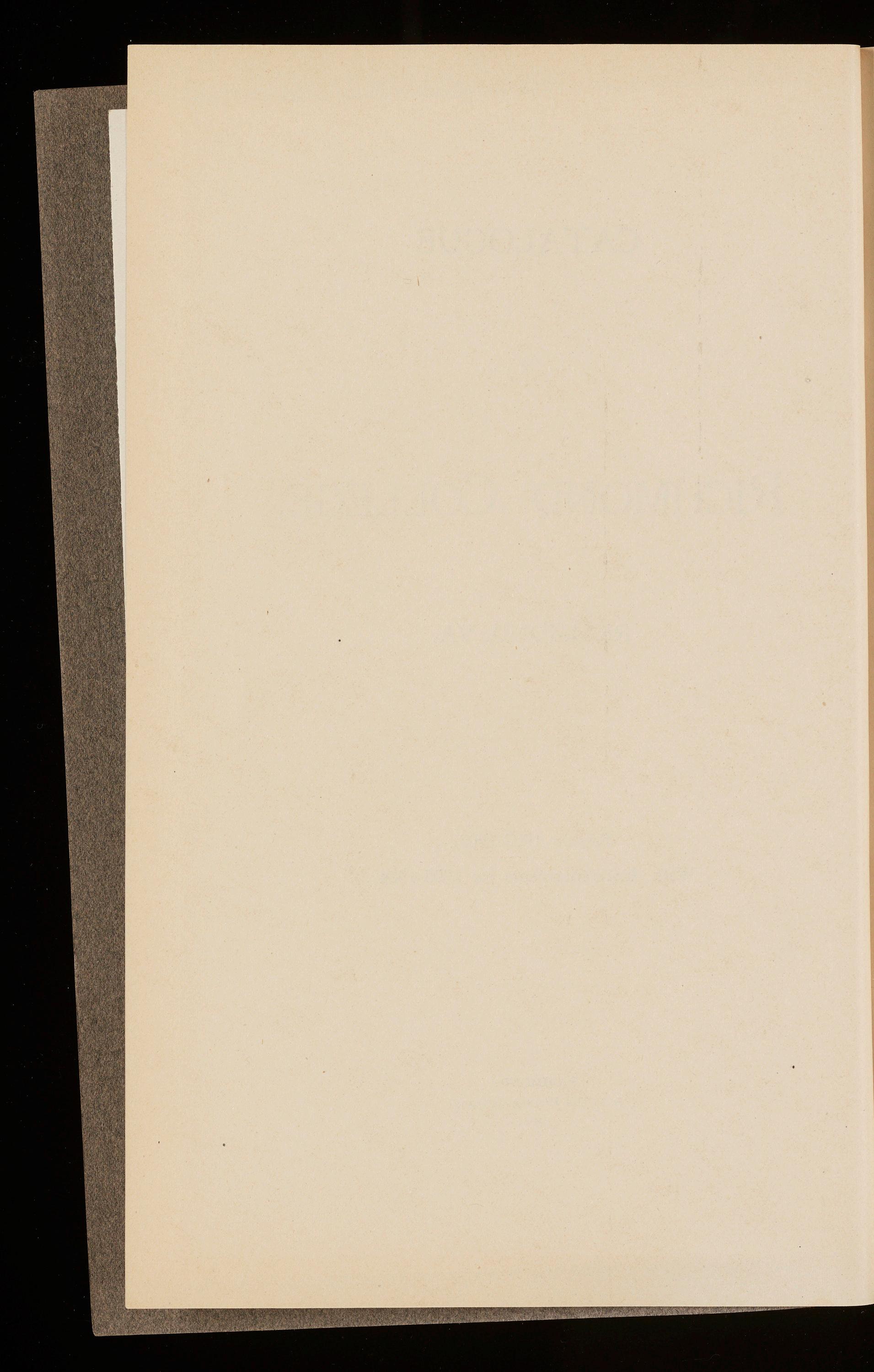

ADOPTED DECEMBER, 1891.
I. Be it enacted by the General Assembly, That the act passed March 4th, 1840, entitled "An Act to Incorporate the Trustees of Richmond CoUege," be, and the .same is hereby, so amended as to read as follows:
1. That there be, and is hereby, established at or near the city of Richmond a Seminary of learning for the instruction of youth in the various branch e s of Science and Literature, which shall be known by the name of Richmond College.
2. That Archibald Thomas, J. B. Jeter, AJ.exander Fleet, Barnet Grimsley, William Sands, Daniel "\Vitt, Robert Ryland, James B. Taylor, Edwin Wortham, John M . Murray, Samuel G. Mason, Thomas Hume, A. M. Poindexter, Thomas N. W,elch, Addison Hall, L. W. Allen, W. A. Baynham, L. W. Seely, Basil Manly, Jr., A.G. Wortham, Albert Snead, James Thoma.s, Richard Reins, A. Judson Crane, Charles T. Wortham, C. F. Fisher, L. R. Spilman, Thomas J. Evans, Wellington Goddin, Thomas Wallace, J. B. Stovall, L. M. Coleman, R. H. Bagby, A. J. Goons, J. Lansing Burrows, Edward J. Willis, John A. Broadus, Roscoe B. Herth, and J. R. Chambliss be, and are hereby, constituted Trusteru of said College, who, and their successorn, shall be a body corporate under the name and style of Richmond College, who shall have perpetual succession and a common seal, may receive and hold property for the benefit of said College, and may sue and be sued, implead and be impleaded.
They shall have power to appoint and remov•e officers for their own body, and a Faculty of in,truction for the College, and to regulate all fees and salaries. They shall al-so have power to make By-Laws and Regiilations, not contrary to the laws of the land. Any s even Trustees shall form a quorum, and a less number may adjourn from time to time till a quorum be had.
3. The said Trustees, or any seven of them, are hereby authoriz·ed and empowered to confer Literary Degrees upon such persons as, in their opinion, shall merit the same in as ample a manner as any
4

RICHMOND COLLEGE.
other college in this State, and under the corporate seal to grant testimonials thereof.
4. The said Trustees shall elect a Ti·easurer, who shall give bond, with approved security, payable to said College, conditioned faithfully to discharge the duties of his office, and on failure so to do he may be proceeded against, by motion upon ten days' notice, before the Circuit or Hustings Court of the city of Richmond.
5. The said Trustees shall have power at any annual or other stated meeting, ten of them being present and concurring, to remove any Trustee, and at any time to supply any vacancy.
The number of Trustees shall never be less than twenty-four nor more than forty.
There shall be annual and other stated meetings of the Trustees at such time and place a s their By-L'.Lws shall prescribe. There may be special meetings at the call of their presiding officer; or any three Trustees, due notice of all such meetings being given.
6. The said Trustees are hereby authorized and required to admit to instruction in all the classes of the College, free of all charges except qoard, and in all r.espects upon terms of equality with other students, all ministers and preachers and candidates for the ministry belonging to the denomination of Christians called the Regular Baptists, who may be recommended by the Education Board belonging to the Baptist General Association of Virginia, in which Board all the rights, properties, privileges, powers, duties, and obligations of the Virginia Baptist Education Society are hereby declared to be vested. And said Trustees may also admit gratuitously such other students as they may think proper. And said Trustees may receive donations, bequests, and devises, or, in their di,scretion, purchase and hold property, real and personal, in any county or corporation of this Commonwealth, and use and control the same for educational purposes, in the founding and maintaining of schools or academies, under such rules and regulations as may be prescribed by the said Trustees.
7. All rights, claims, privileges, and appurtenances now belonging or any wise pertaining to "the Trustees of Richmond College," as heretofore incorporated by act of the General Assembly, passed March 4, 1840, are hereby transfened to "Richmond College."
II. This act shall be in force from its passage.

The Trustees of Richmond CoHcge have abundant c:mse for reJOlCing. The College year, in the increased patronage, in the devoted service of the Faculty, in the excel l ent order and in the signally fine progress of the students, has been almost unequalled in the history of the institution. 1\.hile there have been no large gifts for the _ College during the pa,,t year, it is gratifying to report that those who subscribed on the $25,000 offer of the American Baptist Education Society are showing the higlrnst sense of honor and faithfulness in redeeming their bond ,s as they become due. A hurtful report went abroad during the past year that the $75,000 which it was necessar;v to raise in order to ;;ecure Mr. RockefeJJ.er's offer had really never been secured. The rumor was absolutely without foundation, and gave needless alarm to some friends of the College. Their subscription list is trustworthy in the fullest measure. It is possible that by reason of death or misfortune, or exceptional cases of forgetfulness, a few of these bonds may not be redeemed, but it will please the friends of Richmond College to know that any shrinkage that may unavoidably occur will be carefully looked after. Gifts may be made by our liberal-minded people with a view of guarding against any possible dl'ficiency that may occur hereafter.
It may be well to remind the public that the mo,·cment to endow the Greek chair in honor of H. H. Harris, the late eminent professor of Greek in Richmond Collge, has not yet been brought to completion. A handsome sum for that purpose is in hand, but it is by no means sufficient. Donations for this memorial will be gladly accepted.
It i,, to be regretted that our College is still without a Depart;nent of Biology. The money for the endowment and equipment of such a department should not long be Jacking.
The constituency of Richmond College must understand that fees for higher education can never pay the expenses of instruction. It is only the endowed college that can girn higher education, and the efficiency of this work must al ways be in proportion to the income from the endowment. Our College ha,s a scholarly and efficient corps of teachers, but they are not receiving a support worthy of their
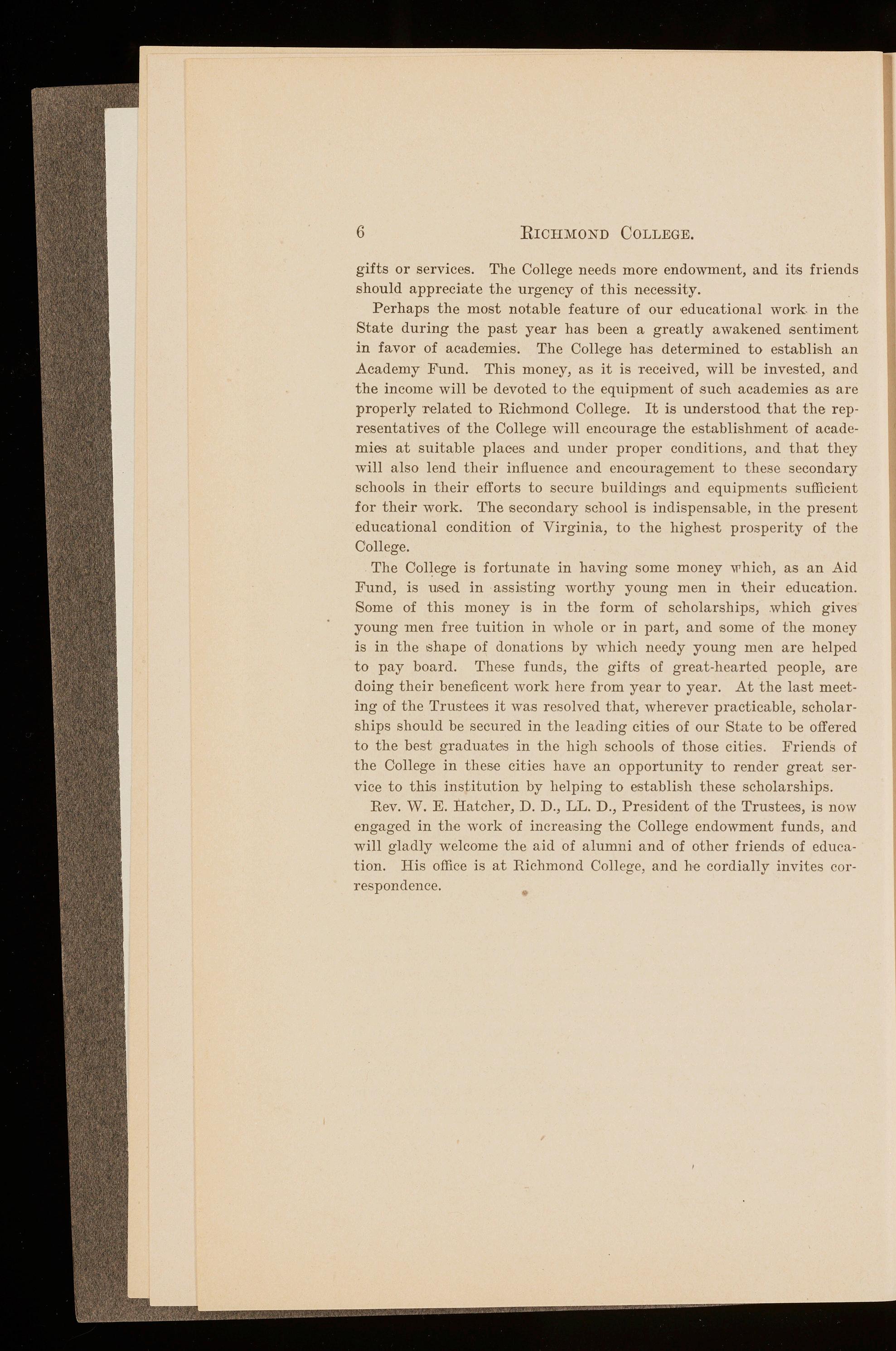
RICHMOND COLLEGE.
gifts or services. The College needs more endowment, and its friends should appreciate the urgency of this necessity.
Perhaps the most notable feature of our •educational work in the State during the past year has been a greatly awakened sentiment in favor of academies. The CoHege has determined to establi;;h an Academy Fund. This money, as it is r,eceived, will be invested, and the income will be devoted to the equipment of such academies as are properly related to Richmond College. It is understood that the rep· resentatives of the ColJ.ege will encourage the establishment of academies at suitable plaoes and under proper conditions, and that they will also lend their influence and encouragement to these secondaTy schools in their efforts to secure building1s and equipments sufficient for their work. The secondary school is indispensable, in the present educational condition of Virginia, to the highest prosperity of the College.
The College is fortunate in having some money which, as an Aid Fund, is us,ed in assisting worthy young men in their education. Some of this money is in the form of scholarships, .which gives young men free tuition in whole or in part, and some of the money is in the o,hape of donations by which needy young men are helped to pay board. These funds, the gifts of great-hearted people, are doing their beneficent work here from year to year. At the last meeting of the Trustees it was resolved that, wherever practicable, scholarships should be secured in the leading cities of our State to be offered to the best graduat •es in the high schools of those cities. Friends of the College in these cities have an opportunity to render great service to this institution by helping to establish these scholarships.
Rev. W. E. Hatcher, D. D., LL D., President of the Trustees, is now engaged in the work of increa;sing the College endowment funds, and will gladly welcome the aid of alumni and of other friends of education. His office is at Richmond College, and he cordially invites correspondence.

Never in the history of the world has there been such enthusiasm in favor of higher education as now prevails among the American people. There is also an increasing dispooition among public-spirited people to make their gifts while they live. It is not wonderful that this should be the case The fluctuations of fortune are many, and it is a sign of thougthfulness for people to give their money while they have it and lest they should lose it. :Moreover, there is intrinsic joy in doing our own giving and in seeing our gifts accomplish their good work while we live. There is a peculiar contagion and inspiration in the gifts of the living. They are especially effective in moving others to generosity. There is also additional motive for giving our money to Christian education , and this is the di,stinct type of work in its essence and spirit which Richmond College is pledged to do. The quick gift is the self-doubling gift But we know well that it i,s not eo1wenient for all to make large gifts during their lifetime. They cannot take their capital from their business without crippling their living. At the same time their hearts burn with large desires and they cherish the thought that as they come to the end of life they will devote their substance entirely, or in part, to Christian education. There are many names which the friends of Richmond College always utt€r with gratitude and aff.cction-tlwse who in dying remembered the College and gave of their fortune for its upbuilding. Their names are forever identified with the College, and will not be forgotten. Let not the trustees of God ' s gifts forget to handle them carefully for the good of humanity l'ncl for the glory of God.
"I give and devise to Richmond College, located at Richmond, Va., the following real estate--to-wit (here describe the said real estate as to kind, quantity, and situation).
I also give and bequeath to the said College the sum of . ,... . dollars ( $ ...... ) and the following bonds ( or stocks )-to-wit (here describe the bonds or stocks), all of which are to be used for the following purposes-to-wit (here de scribe the purpose for which it shall be applied).
Trustees.
WILLIAM E. HAT CHER , D . D., LL. D, President.
Hon. J. TAYLOR ELLY SON , Vice-President.
CHARLES H. RYLAND, D. D., Recording Secretary, Fina.ncia.l Secretary, a.nd Trea.surer.
J.M. PILCHER , D. D., A uditor.
MAJOR A. R COURTNEY .. Richmond :\1R. 'l'. 0. W 1LL I AM8, J1<. ... Rlchmond
W. E. HATCHER, LL. D. . Richmond MR T. II. Er,LWl"l'. ...... Richmond
A E. DICKfNSON, D. D. . Richmond MR. JonN T G1<1FFJN.... Portsmouth
MR. JOIIN C. WILLIA,1s .. Richmond MR A. J MoN'l'AOUK Richmond . Richmond
J. R. GARLICK, D. D ..
C.H. RYLAND, D. D . Richmond MR. J T ELLYSON Richmond GEORGE ,v . BEAJ,E, D. D ... HeathSYille
T S DUNAWAY, D. D., Fredericksburg JUDGE B. A HANCOCK Manchester
H. WY'l'llE DAVIS, M. D ... Richmond
I. B. LAKE, D. D. . Uppcrviile
GEORGE B. STF.EL, D. D. s., Ri<-hmond
A. E. OWEN, D. D Portsmouth
JUDGE w . R. BARKSDALE .. Ho u s t o n
R. IT. Pt-r• r , D D .. Richmond
MR. H.'\V. STRALEY,Ju.,Princeton,W.Va
MR. R s. BOSIIER. . . .. Richmond
MR HENRY L. SCJiil[ELZ Hampton
MR. GEO. B. , v ,,:sT ..•. Ne w port News
MR. C. V i\JEREDITll. Richmond '\V. R. L. S)CITH, D. D ..... Richmond
H. R. POLLARD, LL. D .... Richmond
GEORGE COOPER, D D . .. Richmond
PROF. GEORGE SWANN . Danville
MR. CONWAY R SANDS . Richmond
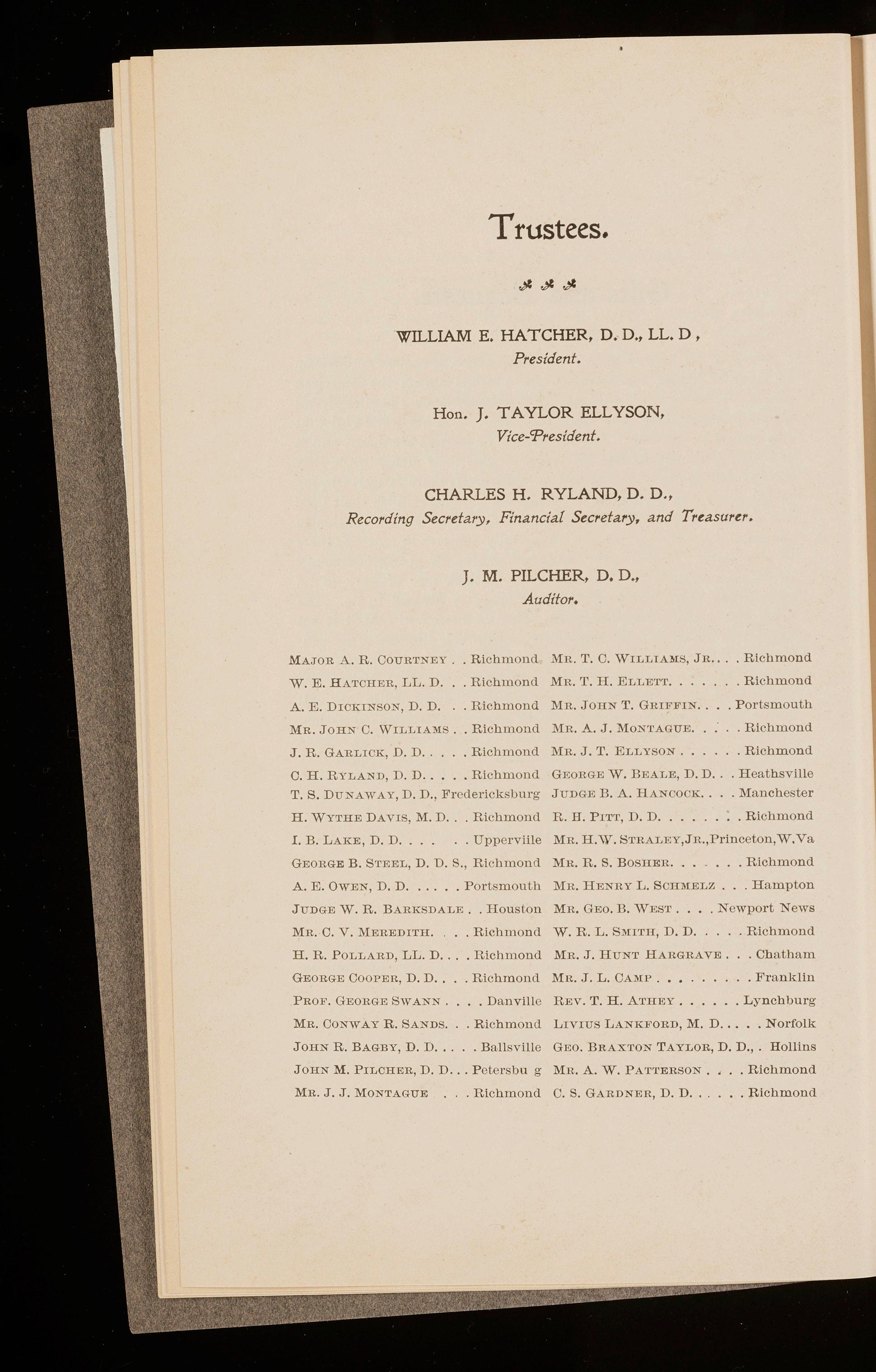
MR. J. Uu:wr HARGRAVE. . Ch at h am
MR J. L. CA )l P . • . F r a n k li n
REV. T H. ATHEY. Ly n chburg
LIYIUS LANKFORD, M. D . .•. N o r folk
J onN R. BAGBY, D D ..... Ba.ll sville Giso. BRAXTON T AYLOR, D. D. ,. H oll ins
JOUN M . PILCIIER, D. D ... Potorsb u g M u A w. PAT' l'EUSON
MR. J. J. MONTAGUE .. R ichmond c. s . GARDNER, D. D ... R ichmond Ri chmond
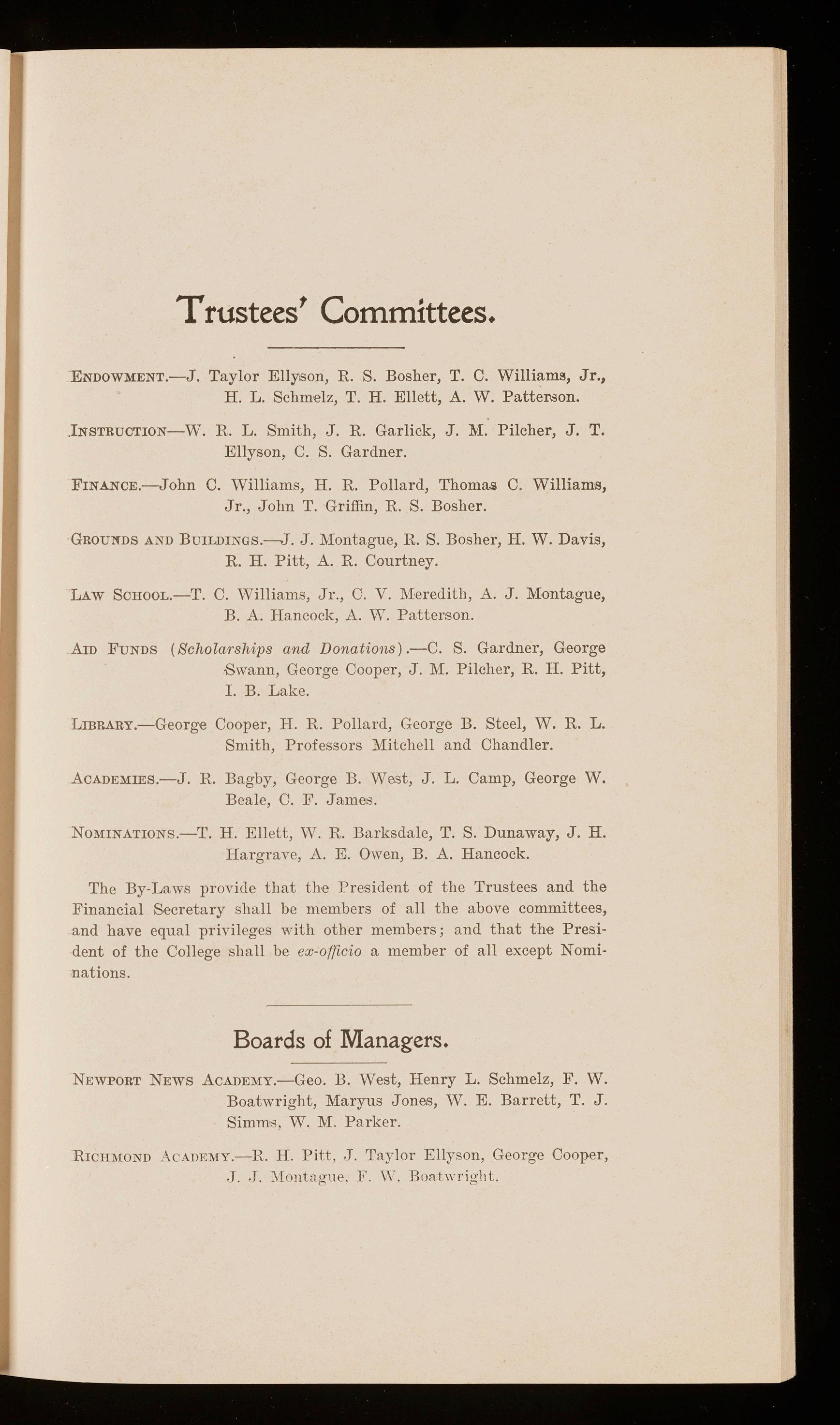
-ENDOWMENT.-J. Taylor E ll yso n , R. S. Bosher, T . C. W ill i a ms, Jr., H. L. Schmelz, T. H. Ellett, A. W. Pattenion .
.lNSTRUCTION-W. R. L. Smith, J. R. Garlick, J. M. Pilcher, J. T. Ellyson, C. S. Gardner.
FINANCE.-John C. Williams, H. R. Pollard, Thoma.s C. Williama, Jr., John T. Griffin, R. S. Bosher.
GROUl'fDSANDBUILDINGS.--J. J. :Montague, R. S. Bosher, I-I. W. Davis, R. H. Pitt, A. R. Courtney.
LAw ScHOOL.-T. C. Williams, Jr., C. V. Meredith, A. J. Montague, B. A. Hancock, A. vY. Patterson.
Arn FUNDS (Scholarships and Donations) .-C. S. Gardner, George Swann, George Cooper, J. M. Pilcher, R. H. Pitt, I. B. Lake.
LIBRARY.-George Cooper, IL R. Pollard, George B. Steel, W. R. L. Smith, Professors Mitchell and Chandler.
AcADEMIES.-J. R. Bagby, George B. West, J. L. Camp, George W. Beale, C. F. Jame,;;.
NOMINATIONS.-T. H. Ellett, W. R. Barksdale, T. S. Dunaway, J. H. Hargrave, A. E. Owen, B. A. Hancock.
The By-Laws provide that the President of the Trustees and the Financial Secretary shall be members of all the above co=ittees, and have equal privileges with other members; and that the President of the College shall be ex-officio a member of all except Nominations.
NEWPORTNEWS AcADEMY.-Geo. B. West, Henry L. Schmelz, F. W. Boatwright, l\faryus Jones, W. E. Barrett, T. J. Simm~, W. M. Parker.
RICHMONDAcAnEMY.-R. H Pitt , .J. Tay l or Ellyson, George Cooper, ,J.. J :\[onL1gue. F. \Y Bm1twright.
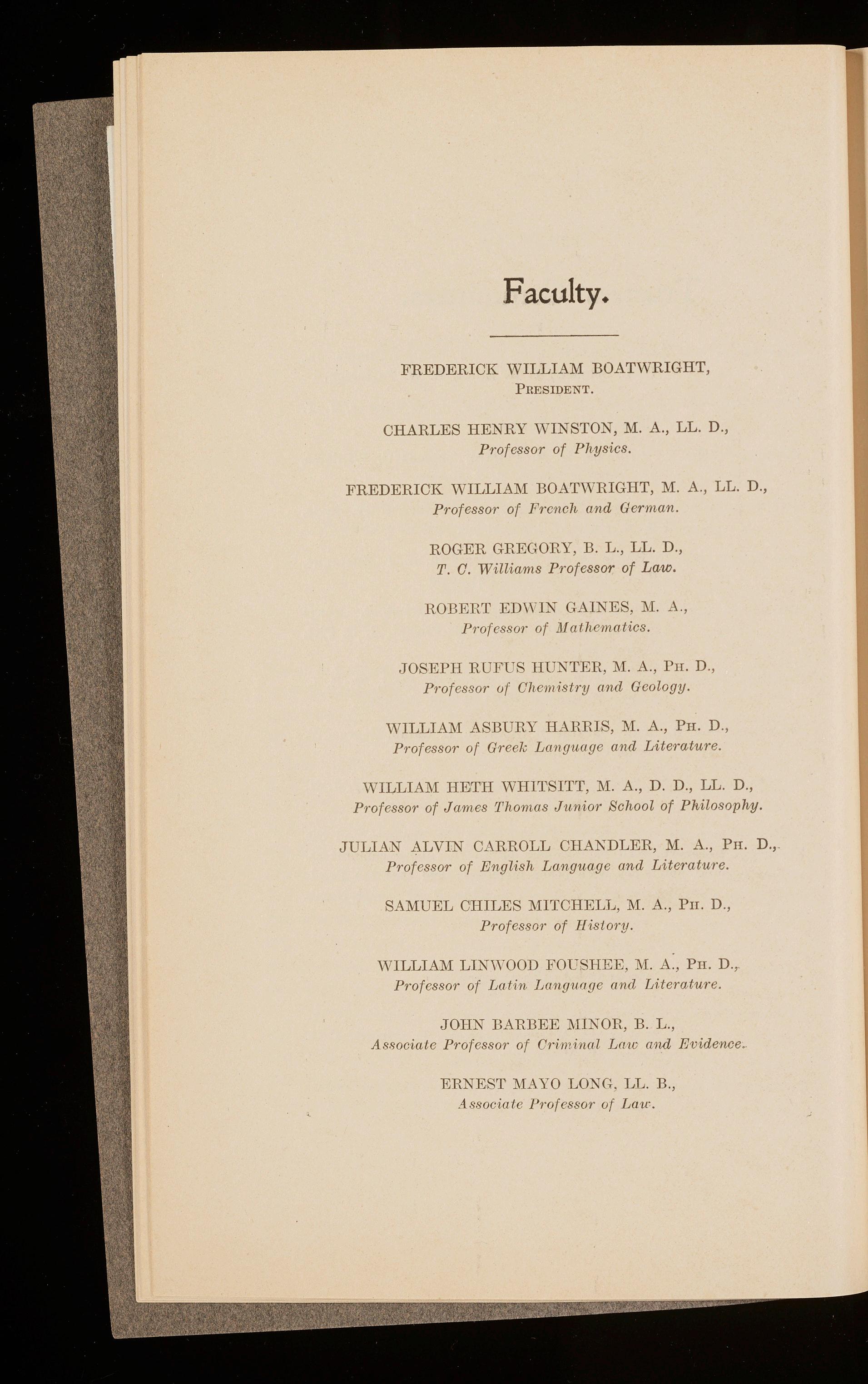
FREDERICK WILLIAM BOATWRIGHT, PRESIDENT
CHARLES HENRY \\'INSTON, M. A., LL. D., Professor of Physics.
FREDERICK WILLIAM BOATWRIGHT, M. A , LL. D., Professor of Frc11ch and German.
ROGER GREGORY, B. L., LL. D., T. C. Williarns Professor of Law.
ROBEhT ED\\"lN GAl JES, M. A., Professor of Mathematics.
JOSl~PH RUFUS HUNTER, M. A., rn. D., Professor uf Chemislry ond Geology.
WILLIAM ASBURY HARRIS, M. A., Pn. D., Professor of Greek La11g1wge anci Literature.
WILLIAM HETH WHITSITT, M. A., D. D., LL. D., Professor of James Thomas Jm1ior School of Pkilosophy.
JULIAN ALVIN C_\RROLL CHANDLER, M. A., PH. D., Professor of English Language and Literature.
SAMUEL CHILES MITCHELL, M.A., Pn. D., Professor of Hi story.
WILLIAM LlN\YOOD F0l1STIEE, M.A., Pn. D., Professor of Latin l1ong11oge oncl lAterature.
JOHN BARBEE :i\UKOR, B. L., AssociClle Professor of Criminal Lnw ond Evidence.
ERNEST ~L.\YO LONG. LL. B., A ssocia Ie l'rofessor of Lau·.
LORADO TAN. ( 1902-3.) Art.
G. STANLEY HALL, Ph. D., LL. D. (1902-3.) Psychology.

CHARLES HILL RYLAND , CJ>.CJ>.,Librarian.
.
HUGH S. WOR<J'HING'TON,M. A. ( 1902-3.) French and German.
W. M. THALHIMER. ( 1902-3.) Laboratory Assistant in Physics.
W. GOODWIN WILLIAMS, B. L., M. A. (1902-3.} Physical Culture.

il.903-Thursday, September 24th.-Opening of the Session.
Wednesday, December 23d.-Close of Fall Term.
Thursday, December 31st.-Beginning of Winter Term.
1904-Saturday, March 20th.-Close of Winter Term.
Monday, March 22d.-Beginning of Spring Term.
Sunday, June 13th.-Commencement Sermon.
Monday, June 14th.-Exercises of Graduating Class.
Tuesday, June 15th.-Annual Meeting of Trustees.
Wednesday, June 16th.-Clo.sing Exercises.
The Annual Sermon was preached Sunday, June J.4th, by Rev. W. ·C. Tyree, D. D., of Raleigh, N. C. The Commencement Address was delivered by President Lyman Hall, LL.D., of the Georgia School of 'Technology, Atlanta, Ga.

The next Session begins September 24, 1903.
New students who inform the President of the hour of their expected arrival in Richmond will be met at train on September 23d or 24th by a member of the College Y. M. C. A., wearing the College colors, crimson and blue. The Y. M. C. A. offers this courtesy only on the clays mentioned.
The Refectory opens for the reception o_fboarders Tuesday, September 22d.
Students furnish their own rooms. The articles, conveniently brought from home, are one pillow and cases, one quilt, one pair of blankets, sheets, towels, and toilet articles .
Rooms will be assigned whenever application is made. The best are usually engaged before opening of the session.
A committee from the College Y. M. C. A. will be in the President's office to assist new students in the selection of rooms, room-mates, and to show them other courtesies.
Matriculation begins on Wednesday, September 23d. On Thursday evening the students are publicly welcomed by representatives of the city and the College.
College classes are organized on Friday.
Interesting reunion exercises are held by the Literar y Societies on Friday and Saturday evenings.
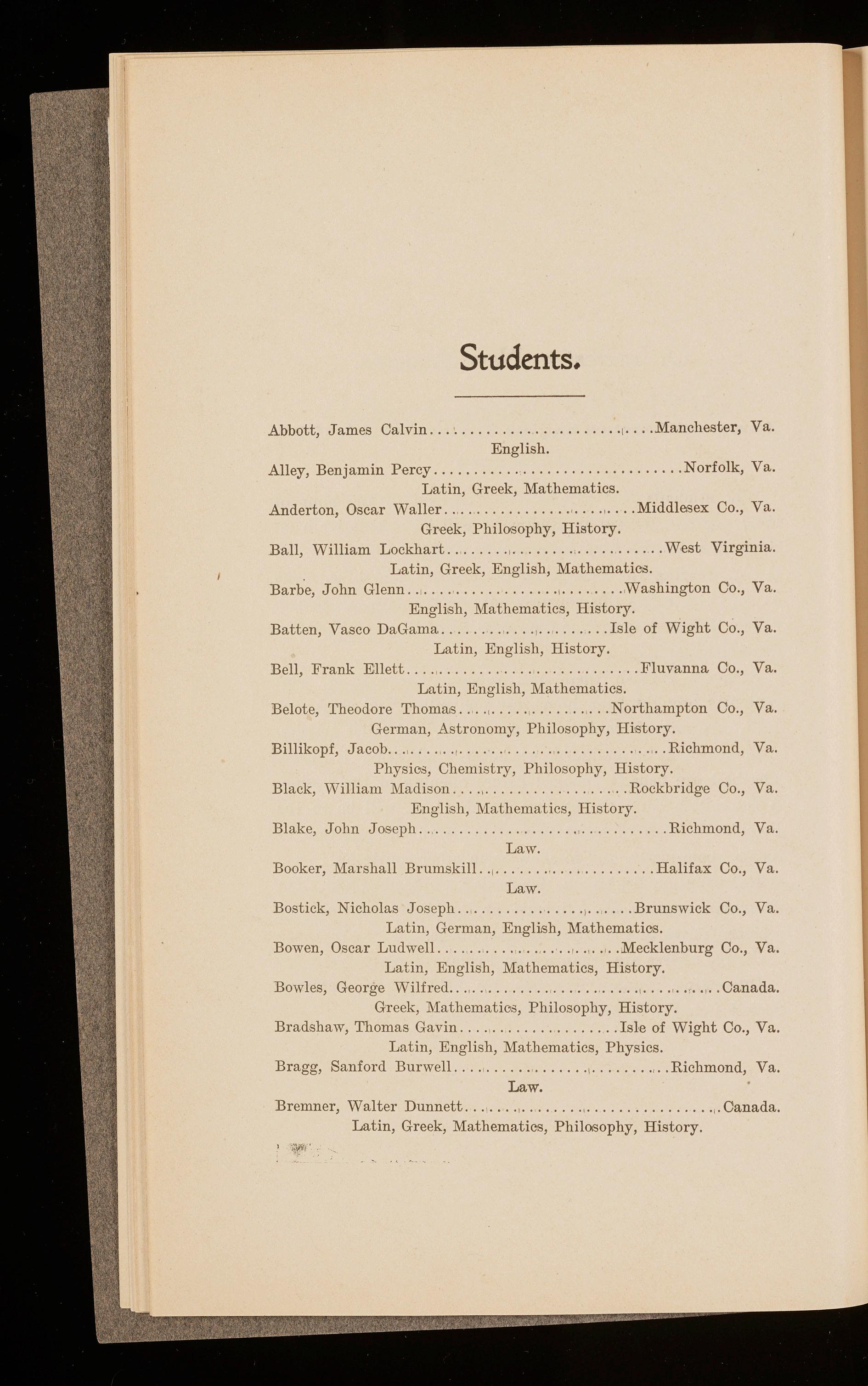
.Abbott, James Calvin ........................ 1•••• Manchester, Va. English .
.Alley, Benjamin Percy ............................... Norfolk, Va. Latin, Greek, Mathematics .
.Anderton, Oscar Waller .. Middlesex Co., Va. Greek, Philosophy, History.
Ball, William Lockhart West Virginia. Latin, Greek, English, Mathematic,.;;.
Barb·e, John Glenn ......... .......... , Washington Co., Va. English, Mathematics, History.
Batten, Vasco DaGama ..................... Isle of Wight Co., Va. Latin, English, History.
Bell, Frank Ellett .................. ........... Fluvanna Co., Va. Latin, English, Mathematics.
Belote, Theodore Thomas .... ,............... Northampton Co., Va. German, Astronomy, Philosophy, History.
Billikopf, Jacob ......... , Richmond, Va. Physic,.;;, Chemistry, Philosophy, History.
Black, iYilliam Madison .... ,.................. Rockbridge Co., Va English, Mathematics, History.
Blake, John Jos eph ... . ...... .. ... Richmond, Va. Law.
Booker, Marshall Brumskill ......... .... . ........ Halifax Co., Va. Law.
Bostick, Nicholas Jo seph Brunswick Co., Va. Latin, German, English, Mathematios. Bowen, Oscar Ludwell , ,. .. Mecklenburg Co., Va. Latin, English, Mathematics, History.
Bowles, George Wilfred ................................... Canada. GTeek, llfathematic,s, Philosophy, History.
Bradshaw, Thomas Gavin .................... Isle of Wight Co., Va. Latin, English, Mathematics, Physics.
Bragg, Sanford Burwell ................. ,........ , .. Richmond, Va. Law.
Bremner, Walter Dunnett ............... , ,.Canada. Latin, Greek, Mathematic,s, Philosophy, History.

Bristow, Arthur Brantly ........................ Middlesex Co., Va. Latin, English, Mathematics, Philosophy.
BTistow, Joseph Chambers .... , Middlesex Co., Va. Law.
Broaddus, Maurice Edwin, Jr Isle of Wight Co., Va. Latin, English, Mathematics, Philosophy, History.
BToaddus, Frances Broo~e ,.................... Caroline Co., Va. English, History.
Brooke, William Seldon .................. ,.. King and Queen Co., Va. Latin, English, Mathematics.
Browning, George Preston Rappahannock Co., Va. English, Mathematics, Physics.
Bruce, Henry buff ,.......................... Hanover Co., Va. Latin, English, Mathematics
.Burt, Hugh Valentine ............................. West Virginia. English, Mathematics, Physics .
Buxto n, Ernest Perry , .,..................... N-ewport N•ews, Va. Mathematics, Literature, Physics, HLstory.
Campbe ll, Clarence ........................ King William Co., Va. Latin, English, Mathematics, Physics.
Carve-r, David June .................................... Tennessee. Latin, Greek, Mathematics, Philosophy.
Cary, John Barry ................................ Henrico Co., Va. Latin, Mathematics, Physics.
Clark, Wesley Plummer .. ,......... Chesterfield Co., Va Greek, French, Chemistry, Philosophy. Clarke, Gertrude .................................. Richmond, Va. Lit erat ure.
Clarke, Heath Christian .... ,..................... Henrico Co., Va. Latin, English, Mathematic.s, History.
Cole, Andrew Howard ....................... Buckingham Co., Va. Latin, English, Mathematics. Coleman, Thomas Campbell ...................... Nottoway Co., Va. Latin, Greek, English, Mathematics. Compton, Ursa ................................. Culpeper Co., Va. Latin, Greek, Phy s ics, History.
Daniel, James Currin ............................. Richmond, Va. Law.
Davidson, Arthur Derieux .. , ...... Manchester, Va. Latin, Greek, Mathematics, Philosophy. Davis, Beverly Henderson ........................ Bedford Co., Va. Law.
16
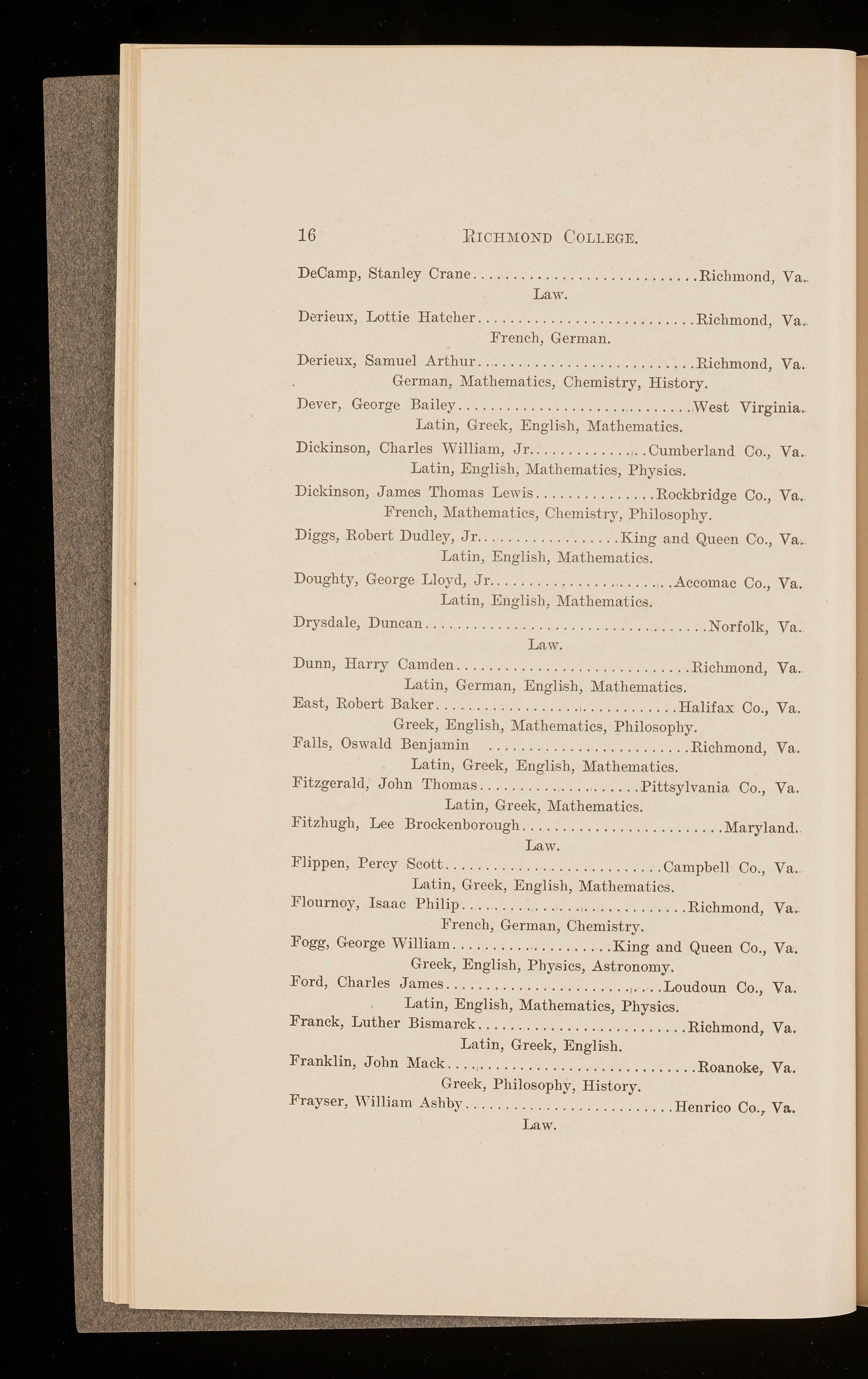
RICHMOND COLLEGE.
DeCamp, Stanley Crane ... . . Richmond, Va. Law.
Darieux, Lottie Hatcher ........................... Richmond, Va. French, German.
Derieux, Samuel Arthur ..................... . ..... Richmond, Va. German, Mathematics, Chemistry, History.
Dever, George Bailey .............................. West Virginia. Latin, Greek, Engli.;h, Mathematics.
Dickinson, Charles William, Jr. .............. Cumberland Co., Va. Latin, English, Mathematics, Physics.
Dickinson, Jame.s Thomas Lewis ............... Rockbridge Co., Va. Fr-ench, Mathematics, Chemistry, Philosophy.
Diggs, Robert Dudley, Jr .................. King and Queen Co., Va. Latin, English, Mathematics.
Doughty, George Lloyd, Jr .................. Accomac Co., Va. Latin, English, Mathematics.
Drysdale, Duncan ............... ... . ............... Norfolk, Va. Law.
Dunn, Harry Camden ............................. Richmond, Va. Latin, German, English, Mathematics.
East, Robert Baker .................. ,............ Halifax Co., Va. Greek, English, Mathematics, Philosophy. Falls, Oswald Benjamin .................. Richmond, Va. Latin, Greek, English, Mathematics. Fitzgerald, John Thomas Pittsylvania Co., Va. Latin, Greek, Mathematics. Fitzhugh, Lee Brockenborough ......................... Maryland. Law.
Flippen, Percy Scott ........ ........... Campbell Co., Va .. Latin, Greek, English, Mathematics.
Flournoy, Isaac Philip ............... , .. ....... Richmond, Va. French, German, Chemistry.
Fogg, George William .......... ,.......... King and Queen Co., Va. Greek, English, Phy s ics, Astronomy. Ford, Charles James ....................... 1•••• Loudoun Co., Va. Latin, English, Mathematics, Physics.
Franck, Luther Bismarck .......................... Richmond, Va. Latin, Greek, Engli.;h, Franklin, John Mack .... ,... ... ..................... Roanoke, Va. Greek, Philosophy, History.
Frayser, William Ashby. . . ................ Henrico Co., Va.. Law.
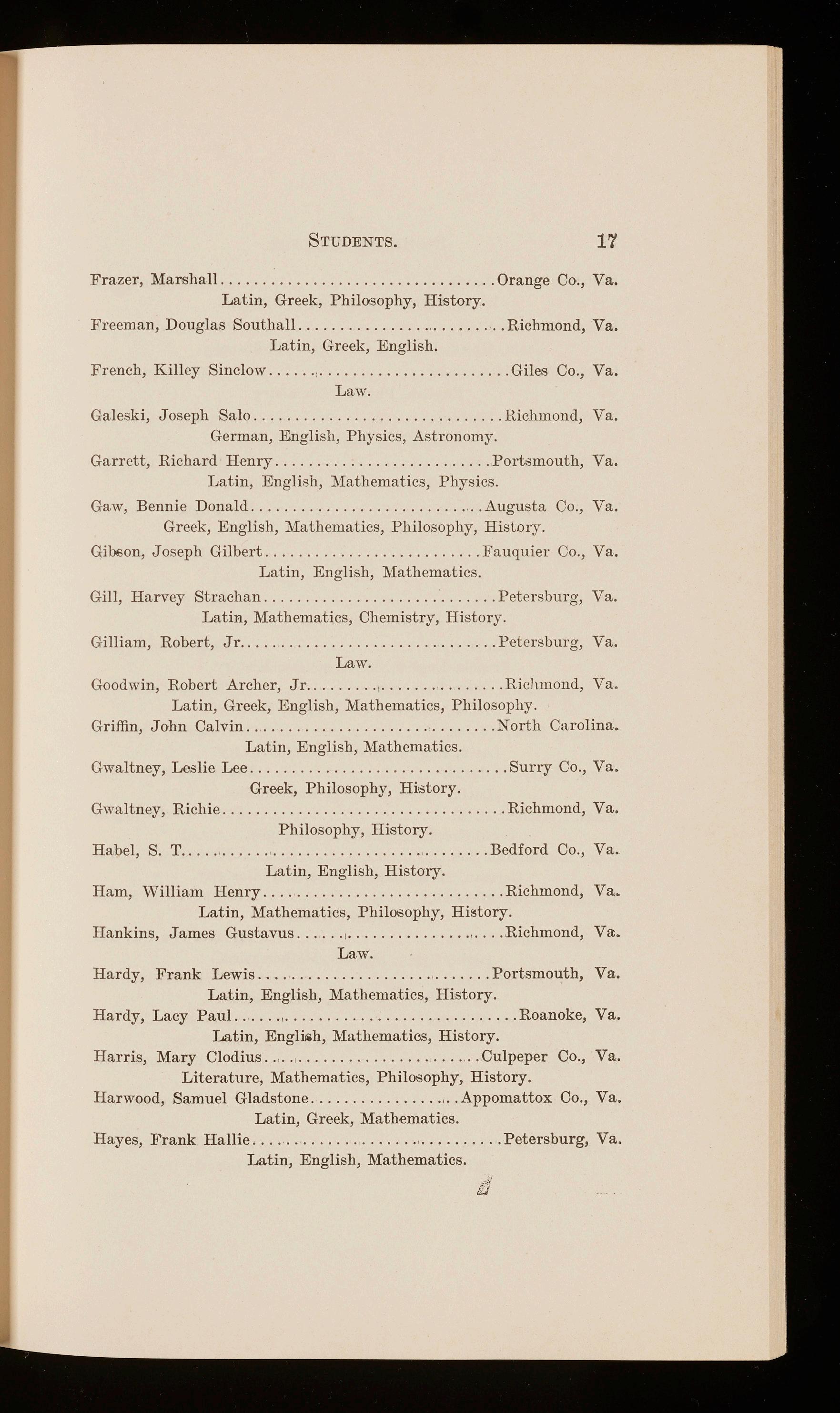
STUDENTS. l'i'
Frazer, Mamhall Orange Co., Va. Latin, Greek, Philosophy, History.
Freeman, Douglas Southall ........ . Richmond, Va. Latin, Greek, English.
French, Killey Sinclow ...... , Giles Co., Va. Law.
Galeski, Joseph Salo Richmond, Va. German, English, Physics, Astronomy.
Garrett, Richard Henry Portsmouth, Va. Latin, English, Mathematics, Physics.
Gaw, Bennie Donald . .. ....................... ... Augusta Co., Va. Greek, English, Mathematics, Philosophy, History. Gibson, Joseph Gilbert .......................... Fauquier Co., Va.
Latin, English, Mathematics.
Gill, Harvey Strachan Petersburg, Va. Latin, Mathematics, Chemistry, History.
Gilliam, Robert, Jr Petersburg, Va. Law.
Goodwin, Robert Archer, Jr ,............... Richmond, Va Latin, Greek, English, Mathematics, Philosophy. Griffin, John Calvin North Citrolina. Latin, English, Mathematics.
Gwaltney, Leslie Lee Surry Co., Va. Greek, Philosophy, H~story.
Gwaltney, Richie ...... ..... .. ... .... ..... .. .... ... Richmond, Va. Philosophy, History.
Habel, S. T .. , Bedford Co., Va. Latin, English, History.
Ham, William Henry Richmond, Va. Latin, Mathematics, Philo.;;ophy, Hi~tory.
Hankins, James Gustavus ...... 1 ••••• •••• Richmond, Va. Law.
Hardy, Frank Lewis ............................. Portsmouth, Va. Latin, English, Mathematics, History
Hardy, Lacy Paul. , Roanoke, Va. Latin, Engli.ih, Mathematics, History.
Harris, Mary Clodius , Culpeper Co., Va. Literature, Mathematics, Philo.;;ophy, History. Harwood, Samuel Gladstone , Appomattox Co., Va.
Latin, Greek, Mathematics.
Hayes, Frank Hallie ...... ............... ,. ......... Petersburg, Va. Latin, English, Mathematics.
18

RICHMOND COLLEGE.
Hellstern, Leon Davis ,,.. Richmond, Va. Latin, German, Mathematics, Physics.
Hicks, Richard Fleet ,.... Powhatan Co., Va. Latin, Greek, English, Chemistry, Philosophy.
Hinds, Frank Crawshaw , Richmond, Va. English, Physics, Chemistry.
Howell, Clifton Herbert ...................... ,.. Botetourt Co., Va. German, English, Mathematics, Physics.
Hubbell, Jay Broaddus ......................... Charlotte Co., Va. Latin, Greek, French, Mathematics.
Hudgins, Edward Wren ...... ....... ,.......... Buckingham Co., Va. Latin, English, Mathematics, Physics.
Hundley, Deane ,...... E&;iex Co., Va, Law.
Ish, George Brooks .. ..... .... ,.. Loudoun Co., Va. Latin, English, Philosophy, History .
.James, Powhatan Wright ....................... Culpeper Co., Va. French, English, Mathematics, History .
Jennings , Lewis Wise Lafayette ................. Culpeper Co., Va. French, English, Philosophy, History.
Johnson, Robert Ewen , , Tazewell Co., Va. Latin, English, Mathemati~, Hie.tory.
Jones, Henry Frederick .................... Mecklenburg Co., Va. Latin, Greek, English, Mathematics.
Jones, Herschell M. B ...... .. ... .......... Fredericksburg, Va. Greek, Chemistry, Philosophy.
Jones, Julian Douglas ....... Fluvanna Co., Va. German, Mathematics, Physics, Philosophy.
Jordan, Robert Alexander ............. ........ Newport News, Va. Latin, Greek, History.
Kenney, James Walter ................ , . iRockbridge Co., Va. Latin , Greek, English, Mathematics.
Kidd, Hugh Tompkins ....................... ,. ..... Richmond, Va. Latin, Greek, English, Mathematics.
Kincheloe, John William ................. , , Fauquier Co., Va. Latin, Literature, Physics, Chemistry, Philosophy.
Lacy, Lane ........................................ Richmond, Va. Law.
Lacy, Richmond Terrell, Jr ......................... Richmond, Va. Law.
Lacy, Samuel Winston ............................ Richmond, Va. Latin, French, English, Mathematics.
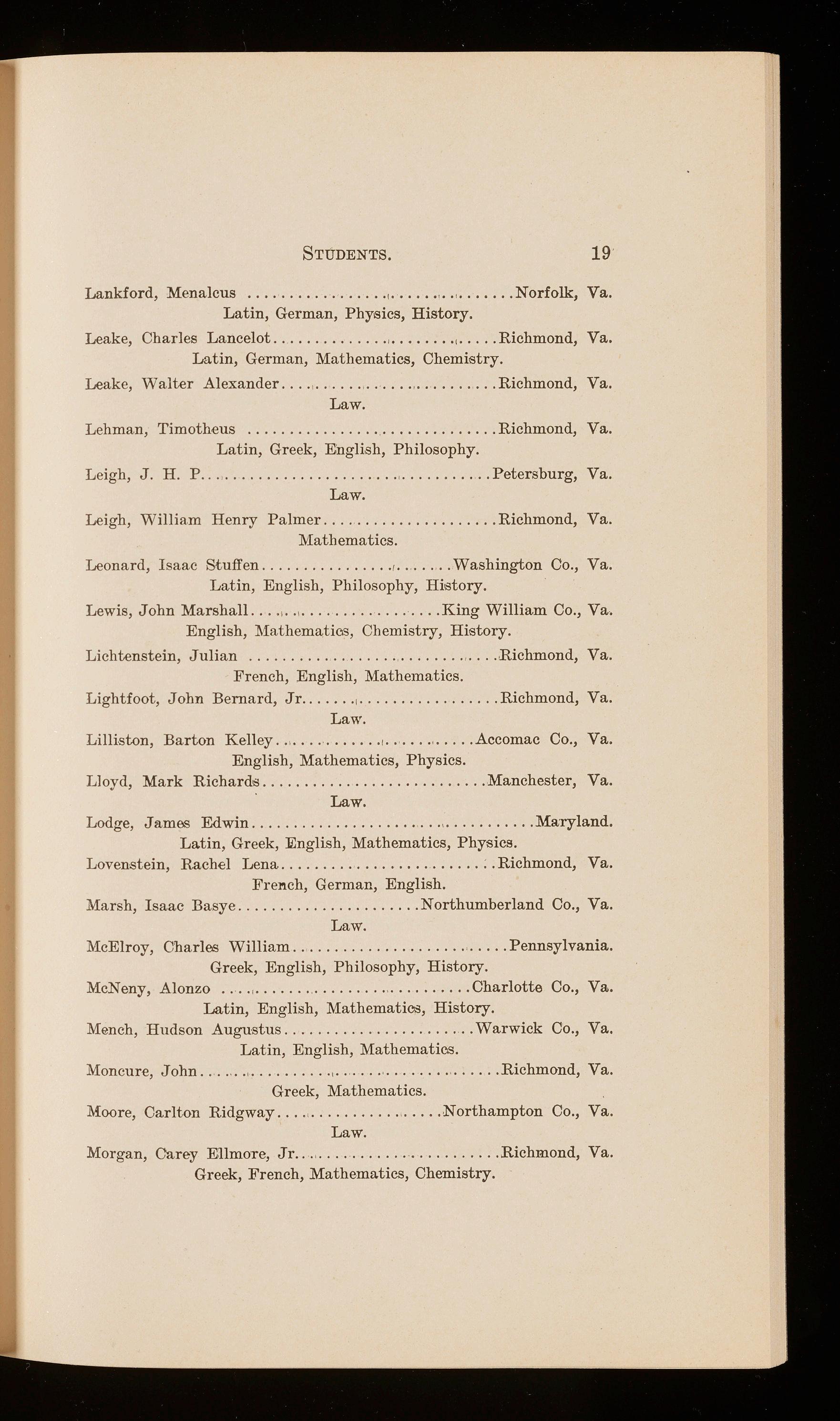
STUDENTS. 19 '
Lankford, Menalcus ................. ,......... , Norfolk, Va. Latin, German, Physics, History.
Leake, Charles Lancelot .............. ,........ ,..... Richmond, Va. Latin, German, Mathematics, Chemistry. Leake, Walter .Alexander , , Richmond, Va. Law.
Lehman, Timotheus ................ ............... Richmond, Va. Latin, Greek, English, Philosophy.
Leigh, J. H. P . . ...................... ,........... Petersburg, Va. Law.
Leigh, Willia.m Henry Palmer Richmond, Va. Mathematics.
Leonard, Isaac Stuffen .. , Washington Co., Va. Latin, English, Philosophy, Hi;;tory.
Lewis, John Marshall , , King William Co., Va. English, Mathematics, Chemistry, History. Lichtenstein, Julian Richmond, Va. French, English, Mathematics.
Lightfoot, John Bernard, Jr ....... ,................. Richmond, Va. Law.
Lilliston, Barton Kelley , , .Accomac Co., Va. English, Mathematics, Physics.
Lloyd, Mark Richard;; Manchester, Va. Law.
Lodge, James Edwin ... ..... .... . .. ............. ...... . Maryland. Latin, Greek, English, Mathematics, Physics. Lovenstein, Rachel Lena : .Richmond, Va. Frel'lch, German, English.
Marsh, Isaac Basye .. ... ............ .. ... Northumberland Co., Va. Law.
McElroy, Charles William , .... Pennsylvania. Greek, English, Philosophy, History. McNeny, Alonzo .... ,........................... Charlotte Co., Va. Latin, English, Mathematics, History.
Mench, Hudson Augustus Warwick Co., Va. Latin, English, Mathematics.
Moncure, John ....... , , Richmond, Va. Greek, Mathematics.
Moore, Carlton Ridgway , Northampton Co., Va. Law.
Morgan, Carey E11more, Jr , ........ Richmond, Va. Greek, French, Mathematics, Chemistry.
20
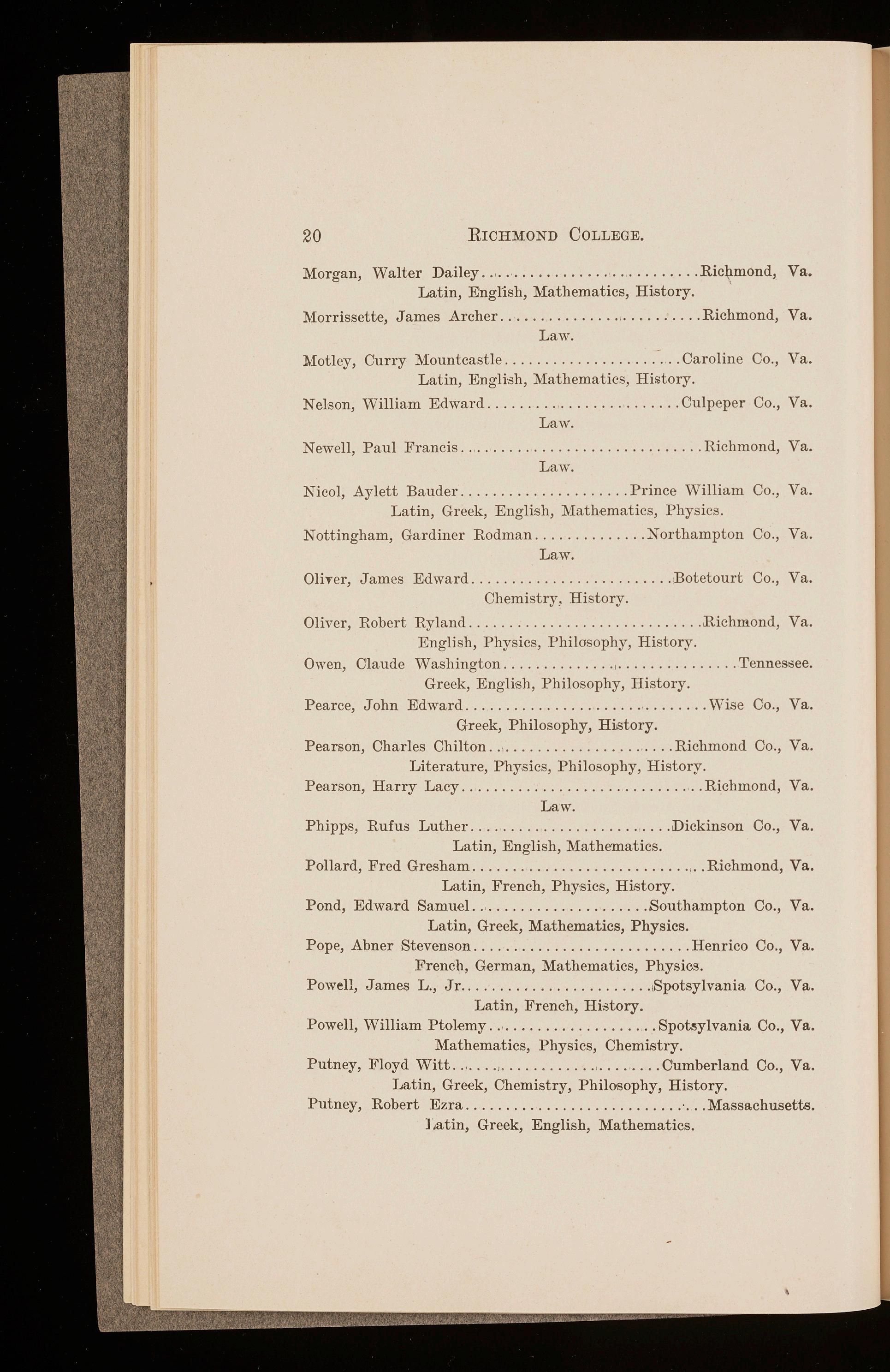
RICHMOND COLLEGE.
Morgan, Walter Dailey Ric~mond, Va. Latin, Engl1sh, Mathematics, History. '
Morrissette, James .Archer ......................... Richmond, Va. Law.
Motley, Curry :Mountcastle Caroline Co., Va. Latin, Engli-.h, Mathematics, Hi£tory.
Nelson, William Edward Culpeper Co., Va. Law.
Newell, Paul Francis Richmond, Va. Law.
Nicol, .Aylett Bauder Prince William Co., Va. Latin, Greek, English, Mathematics, Physics.
Nottingham, Gardiner Rodman :N"orthampton Co., Va. Law.
Oli-ver, James Ed ward ......................... Botetourt Co., Va. Chemistry, History.
Oliver, Robert Ryland Richmond, Va. English, Physic , Philosophy, History.
Owen, Claude Washington , Tenne8'lee. Greek, English, Philosophy, History.
Pearce, John Edward ...................... ,. Wise Co., Va. Greek, Philosophy, History.
Pearson, Charles Chilton .. ,.... Richmond Co., Va. Literature, Physics, Philosophy, History.
Pearson, Harry Lacy .............................. Richmond, Va. Law.
Phipps, Rufus Luther ............. . ........... Dickinson Co., Va. Latin, English, Mathematics.
Pollard, Fred Gresham ........................... , Richmond, Va. Latin, French, Physics, History.
Pond, Edward Samuel.. ,.................... Southampton Co., Va. Latin, Greek, Mathematics, Physics.
Pope, Abner Stevenson ........................... Henrico Co., Va. French, German, Mathematics, Physics.
Powell, James L., Jr ,Spotsylvania Co., Va. Latin, French, History.
Powell, William Ptolemy Spo~ylvania. Co., Va. Mathematics, Physics, Chemistry.
Putney, Floyd Witt .. , , Cumberland Co., Va. Latin, Greek, Chemistry, Philosophy, History.
Putney, Robert Ezra ........................... ·... Massachusetts. 1,atin, Greek, English, Mathematics.
Quarles, James Cowardin
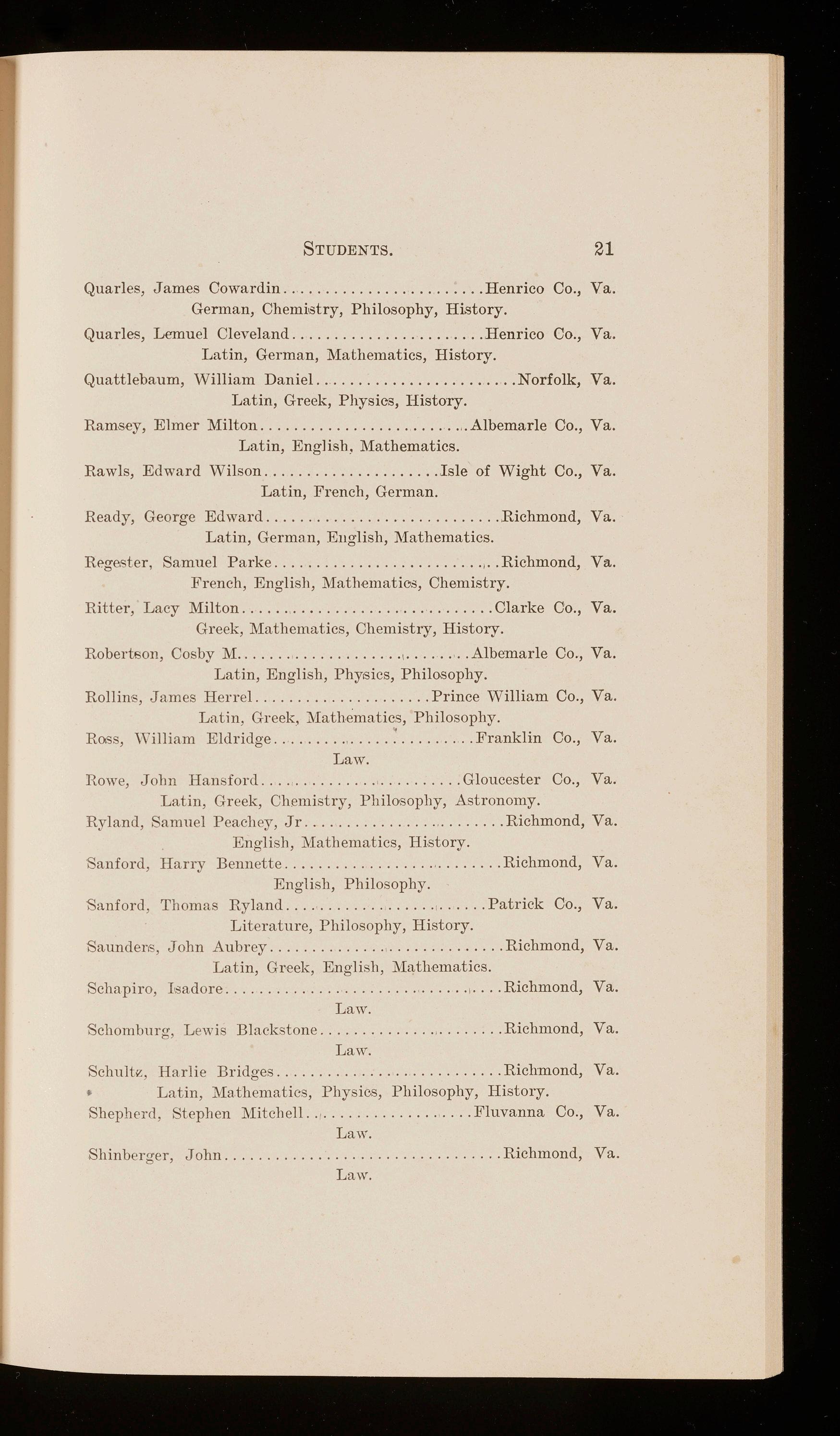
Henrico Co., Va. German, Chemistry, Philosophy, History.
Quarles, Lemuel Cleveland .. ................... Henrico Co., Va. Latin, German, Mathematics, History.
Quattlebaum, William Daniel. ....................... Norfolk, Va. Latin, Greek, Physics, History.
Ramsey, Elmer Milton ,..Albemar le Co., Va. Latin, English, Mathematics.
Rawls, Edward Wilson ...... ............. Isle of Wight Co., Va. Latin, French, German.
Ready, George Ed ward Richmond, Va. Latin, German, English, Mathematics.
Regester, Samuel Parke , Richmond, Va. French, English, Mathematics, Chemistry.
Ritter, Lacy Milton ....... ... .... . ... . ........... Clarke Co., Va. Greek, Mathematics, Chemistry, History.
Robertison, Cosby M , ..... .Albemarle Co., Va. Latin, English, Physics, Philosophy.
Rollins, James Herrel. ... ..... Prince William Co., Va. Latin, Greek, :Mathematics, Philosophy.
R0iss, \Yilliam Eldridge . ........ ,. .... : ...... ... Franklin Co., Va. Law.
Rowe, John Hansford ............. ., Gloucester Co., Va. Latin, Greek, Chemistry, Philosophy, Astronomy.
Ryland, Samuel Peachey, Jr ........... ...... Richmond, Va. Englis h , Mathematics, Hi.story.
Sa nford, Harry Bennette ..... Richmond, Va. English, Philosophy.
Sa nford, Thomas Ryland ........................ Patrick Co., Va. Literature, Philosophy, History.
Saundens, John Aubrey ............................ Richmond, Va. Latin, Greek, English, Mathematics.
Schapiro, I,sadore , ... Richmond, Va. Law.
Schomburg, L ewis Blackstone ,. Richmond, Va. Law.
Schulle, Harlie Bridges ........................... Richmond, Va. Latin, Mathematics, Physics, Philosophy, History. Shepherd, Stephen Mitchell. ., Fluvanna Co., Va. Law.
Shinberger, John .... Richmond, Va. Law.
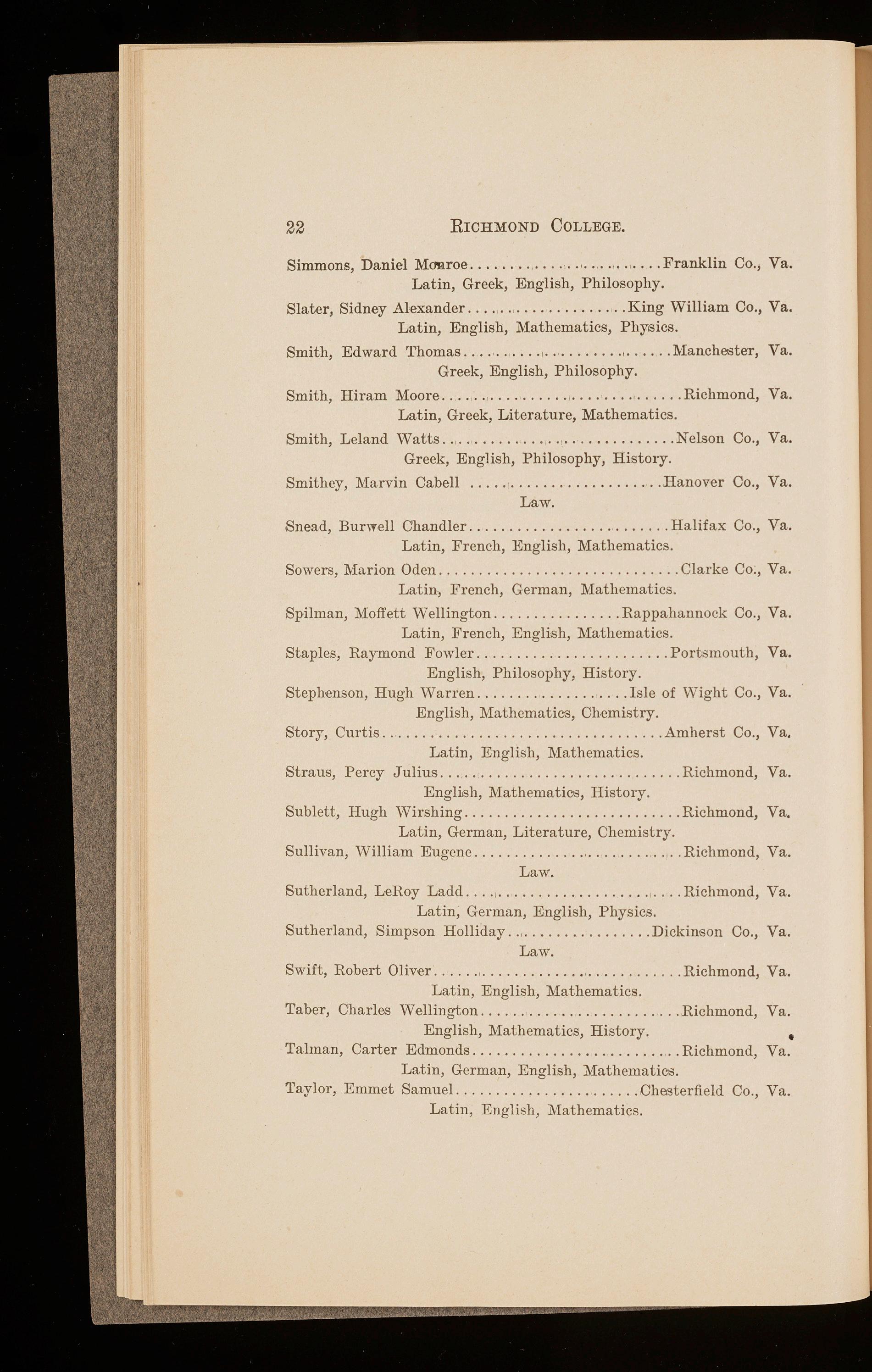
RICHMOND COLLEGE.
Simmons, Daniel M~roe , , ,.... Franklin Co., Va. Latin, Greek, English, Philosophy.
Slater, Sidney Alexander , King William Co., Va. Latin, English, Mathematics, Physics.
Smith, Edward Thomas ,... ..... , Manche,;;ter, Va. Greek, English, Philosophy.
Smith, Hiram Moore ................ ,. ... ,.... ,...... Richmond, Va. Latin, Greek, Literature, Mathematics.
Smith, Leland Watts .. , , Nelson Co., Va. Greek, English, Philosophy, History.
Smithey, Marvin Cabell ..... ,................... Hanov·er Co., Va. Law.
Snead, Bur\Tell Chandler Halifax Co., Va. Latin, French, English, Mathematics.
Sowers, Marion Oden Clarke Co., Va. Latin, French, German, Mathematics
Spilman, Moffett Wellington Rappahannock Co., Va. Latin, French, English, Mathematics .
Staples, Raymond Fowler ... , .......... Portsmouth, Va. English, Philosophy, History.
Stephenson, Hugh Warren ................... lsle of Wight Co., Va. English, Mathematics, Chemistry.
Story, Curtis Amherst Co., Va. Latin, English, Mathematics.
Straus, Percy Julius Richmond, Va
English, Mathemati0s, History.
Sublett, Hugh Wirshing Richmond, Va. Latin, German, Literature, Chemistry.
Sullivan, William Eugene ......................... ,.. Richmond, Va. Law.
Sutherland, LeRoy Ladd .... , , ., .. Richmond, Va. Latin, German, English, Physics
Sutherland, Simpson Holliday .. , Dickinson Co., Va. Law.
Swift, Robert Oliver. ..... ,. ... .. .... .... .... ... ..... Richmond, Va. Latin, English, Mathematics
Taber, Charles Wellington .. . .. ........ . .. ......... Richmond, Va. English, Mathematics, History • Talman, Carter Edmonds .. Richmond, Va. Latin, German, English, Mathematics.
Taylor, Emmet Samuel Chesterfield Co., Va. Latin , English, Mathematics.

Taylor, Tarleton Broadus ....... ., ,..................... Brazil. Latin, Greek, Mathematics, PhysiCJS.
Templeman. Samuel Huntington ............ Rappahannock Co., Va. Greek, German, Mathematics, Physics, History.
Terrell, Aubin Cobb ....................... Hanover Co., Va. German, Literature, Chemistry, History.
Thalhimer, William Montefiore ......... ........ Richmond, Va. German, Mathematics, Chemistry, Philosophy, History. Thomas, Julian Pendleton, Jr. ........... .... ...... Richmond, Va. Law.
Thraves, Willie Vernon ........................ Powhatan Co., Va. English, History, Law.
Tindal, Levy Rhame, Jr ................. South Carolina. French, English, Chemistry, History.
Toombs, Fred Shelby ................................. Mississippi. English, Mathematics, Philosophy, History.
Toombs, Robert Henry ............................... Mississippi. English, Mathematics, Philosophy, History.
Trevillian, Archer Duke ......................... Campbell Co., Va. Law.
Turner, James Marshall ..... .. .......... ........ North Carolina. Law ........ : ...............
Turner, William Mitchell .......................... Richmond, Va. Chemistry.
Tyler, Walter Gresham .... .................... E&sex Co., Va. Law ........................
Vaden, Robert Carrington .................... Pittsylvania, Co., Va. Latin, Physics, Chemistry.
Waddill, Joseph Temple ................. Henrico Co., Va. Latin, English, Mathematics
Wade, Charles Dennis ......... ..... ......... ... .,........ Alabama. Latin, Greek, English, Mathematics. Waters, Judson ................................ Hanover Co., Va. Latin, English, Mathematics, Chemistry.
Watlington, Paul Berry ...................... Pittsylvania Co., Va. Latin, Gr,eek, English, Mathematics.
Webster, James Benjamin ...... , ........ .... South Dakota. La.tin, Greek, Mathematics. West, William Hyde ............................ Hanover Co., Va. Latin, English, Mathematios.
W11ite, George Banner ............................. Richmond, Va. Latin, English, Physics, Chemistry.

RICHMOND COLLEGE.
Whitlock, Walter Morris .......................... Richmond, Va
English Hi ,story.
Wildman , Walter Davis .... . .......... . ....... ... Halifax Co., Va. Latin, English, Mathematics, Physics.
Williams, Bertha Belle ............................ Richmond, Va. French, German, English, Mathematics.
Williams, Emma Wirt ............................. Richmond, Va. German, Mathematios, Physics, Philosophy, History.
Williams, William Goodwin ....................... Richmond, Va. German.
Willingham, 0Bgood Pierce, Jr. Georgia. English, Mathematics, History.
Willis, Russell Holman Lynchburg, Va. Law ........................
'Wiltshire, John Houston .......................... Orange Co., Va. Latin, Greek, Mathematics, Chemistry.
Winfree, Julian Thomas ........................... Richmond, Va. English, Mathematics, History.
Winfree, Emma G Richmond, Va. Mathematics.
Wood, J e:sse Fleming .............................. Richmond, Va. Latin, German, English, l\fathematics.
Wood, Davicl K -empcr._ ., . ... Bath Co., Va. Latin, Greek, Chemistry, Philosophy, History.
Woodfin, Paul Philip ...................... Elizabeth City Co., Va. Latin, Greek, German, Chem i stry, History.
Wright, John Sidney .................................. Loui siana Latin, English, l\Iaihcmatioo, History.
Wright, Thomas Temple ........................ Caroline Co., Va. Latin, French, English, Mathematics.
Yancey, \\'illiam Henry .......................... Halifax Co., Va. Latin, French, English, l\fathcmaiics.

Degrees and Other Honors Conferred at Commencement, June J6, J903.
Doctor of Laws.
PR l~SIDENT SAMUE L p ALMER BROOKS w ACO, TEXAS.
Doctors of Divinity .
REV E. E. AYRES . GEORGETOWN,KY.
REV. E. V. BALDY ........................... MANCHESTER, VA.
REV. L. J. HALEY ............................. LomsA Co., VA.
REV. R. C . IIENING BRISTOL, TENN.
*REV. E. \V. WINFREY .................... ...... CULPEPER, VA.
*Degree conferre d June 12, l!J02.
M aster of Arts .
Theodore T homas Belo te, - No rthampton County Thesis: The Economic History of Richmond During the Civil War.
B a chelors o f Arts .
ERXEST PERRY BUXTON ...................... NEWPORT NEWS.
WESLEY PLillil\IER CLARK ............. CHESTERFIELD COUNTY.
GEORGE WILLIAM FOGG .. KING AND QUEEN COUNTY.
MARY CLODIUS HARRIS .................... CULPEPER COUNTY.
POWHATAN WRIGHT JAMES ................ CULPEPER COUNTY.
LEWIS Vi7lSE LAFAYETTE JENNINGS .. ,, .. CULPEPER COUNTY.
JOUN WILLIAM KINCHELOE . FAIRFAX COUNTY. JAllmR EDWARD OLIVER BoTETou,:T couNTY. \,VlLLIAl\1 PTOLE l\IY POWELL ........... SPOTSYLVANIACOUNTY. JAlllES COWARDIN QUARLES ................ HENRICO COUNTY. LAC¥ llllJ,TOr RITTER.......... CLARKE CouNTY.
JOHN" JIA TSFOR D RO\'i'E .................. GLOUCESTERCOUNTY . RUGH wrnsHING suBLETT RrcnMoND.
BERTHA BELLE WILLIAMS RICIIMOND.
Ellfl\IA \VIH.T 'iVILLIAMS RICHMOND ,

211 RICHMOND COLLEGE.
Bachelors of Science.
JULIAN DOUGLAS JONES FLUVANNA COUNTY. ABNER STEVENSON POPE .................... HENRICO COUNTY. WILLIAM MONTEFIORE THALHIMER .. RICHMOND.
Bachelors of Law.
JAMES CURRIN DANIEL., ,, ......................... RICHMOND. DUNCAN DRYSDALE ................................. NORFOLK.
ROB.ERT GILLIAM, JR , • I • ••••••••••••••• PETERSBURG. JAMES GUSTAVUS HANKINS...... . RICHMOND. MARK RICHARDS LLOYD MANCHESTER.
WILLIAM EDWARD NELSON ................ CULPEPER COUNTY. ISADORE SCHAPIRO ................ I • •••• RICHMOND. LEWIS BLACKSTONE SCHOMBURG RICHMOND.
SIMPSON HOLLIDAY SUTHERLAND ... ... .. DICKENSON COUNTY. WALTER GRESHAM TYLER .......... ESSEX COUNTY. RUSSELL HOLMAN WILLIS ........................ LYNCHBURG.
J. T. Fitzgerald ...... .. ............ ,.......... Pittsylvania County, M. C. Frazer .................................. Orange County.
G. B. Ish 1••••••••••••••••••••••••••• Loudoun County. J. Vl. Kincheloe :Fairfax County. :M. Lankford ............................... , Norfolk. J. L. Powell, Jr. ..............• , , .Spotsylvania County. W. D. Quattlebaum,, ... , .............. , ... , ........... Norfolk. J. H. Rowe ................................... Gloucester Count) . .tI. B. Schultz , Henrico County. H. W. Sublett ........................................ Richmond. L. L. Sutherland .............................. Richmond. P. P. Woodfin ...................................... Hampton. T. T. V\lright ................................... Caroline County.
0. W. Anderton Middlesex Cou nty. W. P. Clark , Chesterfield County. lJ. B. Compton ..... , Culpeper County. Geo. W. Fogg ........... ,................... King and Queen County. L. M. Ritter .................................... , Clarke County. J. H. Rowe Gloucester County.

HONORS CONFERRED .A.T COMMENCEMENT. 27
Lottie H. De1 ieux . .................................... Richmond ..
J. B. Hubbell , Campbell County.
P. W. James ......... ... .. ..... ...... .... ,,.. . ,.. Culpeper County _
L. W. L. Jennings , Culpeper County.
S. T. Lacy , , , Richmond.
A. S. Pope ........... , Henrico County.
J. L. Powell, Jr ............ , ,, Spotsylvania County.
Julian Rawls .............................. Southampton County.
Marion 0. Sowers Page County.
M. W. Spilman 1••••••••••• •••••••••••• Rappahannock County.
L. R. Tindal, Jr ,South Carolina.
Bertha B. Williams ....... . ... ... . .. . ............. ... Richmono...
Lottie H. Derieux ..................... ... . ...... ..... Richmond ..
S. A. Derieux .......... ,,, ............................ Richmond.
Julian D. Jones ........ ,........................ Fluvanna County.
Rachel Lovenstein ., Richmond.
J. C. Quarles Henrico County.
L. C. Quarles ................ ,.................... Henrico County.
Julian Rawls ............................... Southampton County.
H. W. Sublett . .... ,.................................. Richmond.
E. Wirt Williams .................................... Richmond.
Bertha B. Williams ................... .,... Richmond.
Frances B. Broaddus ........................... Caroline County.
E. P. Buxton Newport News.
Gertrude Clarke Richmond.
D. S. Freeman ., Richmond.
Mary C. Harris ................................. Culpeper County.
L. W. L. Jennings ......................... ,.... Culpeper County.
John W. Kincheloe Fairfax County.
C. C. Pearson Richmond County.
H. M. Smith ......................................... Richmond.
H. W. Sublett , ,....... Richmond.
P. W. James ................................... Culpeper County.
A. S. Pope .... .,, , Henrico County.
W. M. Thalhimer ..................................... Richmond.
T. T. Wright ................................... Caroline County.
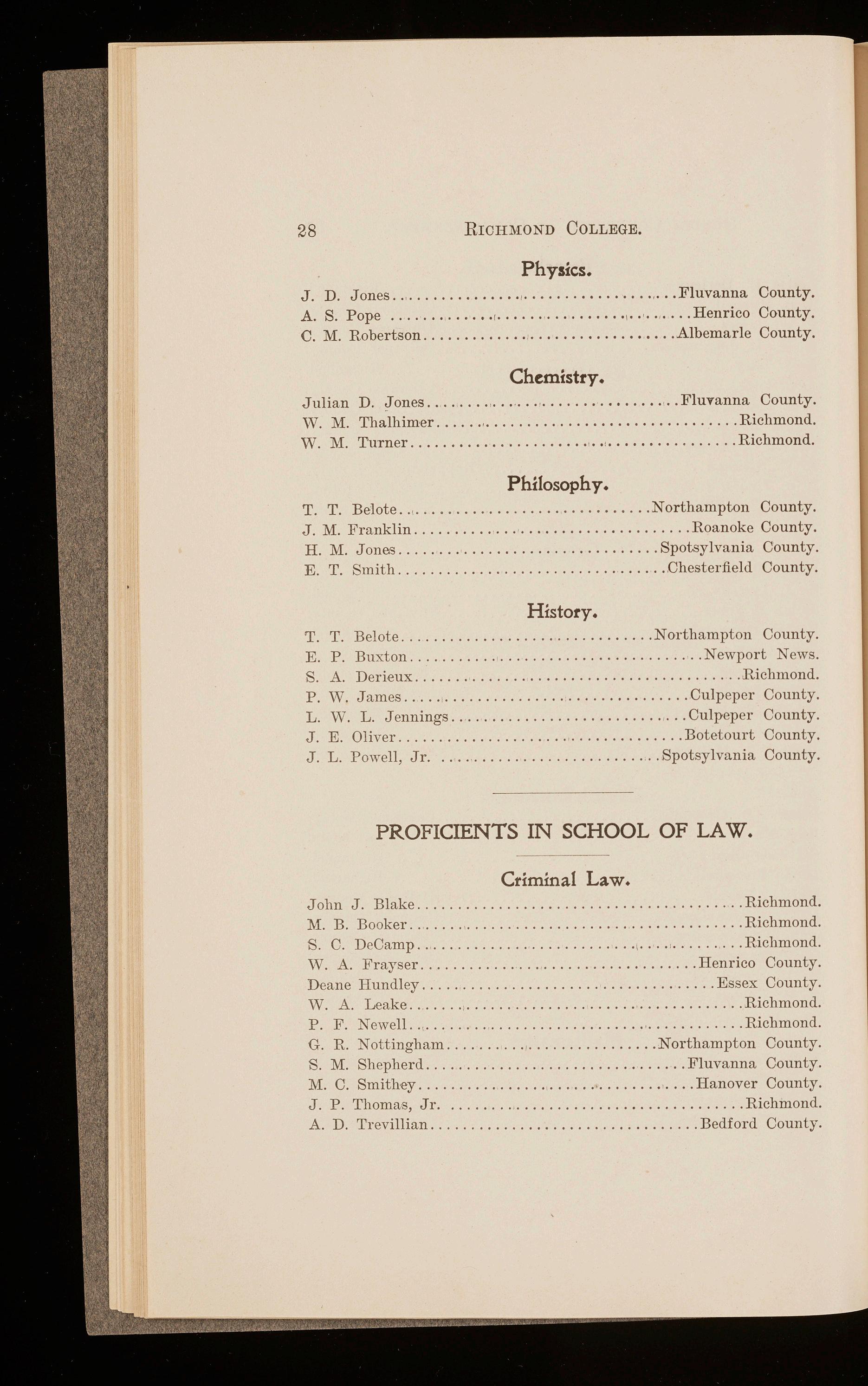
28 RICHMOND COLLEGE.
J. D . Jones ,................ , Fluvanna County. A. S. Pope ..... ... , . ,.. ,.. ,.... Henrico County. C. M Robertson .. .. .. ..... Albemarle County.
Julian D. Jones .......... Fluvanna County. W. M. Thalhimer . .... ......... ..... Richmond
Vv. M. Turner ........ . • ................ Richmond.
T. T. Belote ............................... Northampton Count y. J. M. Fra nklin .................................. Roanoke Coun ty.
H M. Jones ................................ Spotsylvania Count y. E. T . Sm ith ... .. . .. Ch este r field County
History.
T. T. Belote Nort h ampton Count y.
E. P. Buxton .................................... Newport News.
S. A. Derieux ... R ichmond.
P. W. James . ... Culp epe r Coun ty.
L. W. L. Jenning s Culpeper County. J. E. Oliver .. .......... .... Botetourt County. J. L. Powell, Jr. ................. Spotsylvania County.
John J. Blake ..................... , ... Richmond. M. B. Booker Richmond. S. C. DeCamp ........... 1 • • •••••• .R ichmond.
W. A. Frayser Henrico County.
Deane Hundley .................................... Essex County.
W. A Leake .... .. .. . . ...... .... Richmond.
P. F. Newell .. ,.......... , ,............ Richmond.
G. R. Notting ham . .......... Northampton County.
S M. Shepherd ............. ... , Fluvann a County. M. C. Smithey . ... , Hanover Coun ty. J. P. Thomas, Jr. ..... , .. ............ Richmond. A. D Trevillian. , .......... .. , .. Bedford County.

HONORS CONFERRED AT COMMENCEMENT. 29
Constitutional and International Law.
John J. Blake 1•• Richmond, Va.
S C. DeCamp .. , , , . Richmond.
W. A. Frayser ... ...... Henrico County.
Deane Hundley , Essex County.
W. A. Leake ,................. .. Richmond
John B. Lightfoot, Jr ........ , Richmond.
I. B. Marsh Northumberland County.
P. F. Newell , , Richmond.
J. P. Thomas, Jr Richmond.
J. M. Turner North Carolina.
Jo hn J. Blake . . ,.. .. .... ............... ...... , ..... Richmond, Va .
B H. Davis ... 1••••••••••• Bedford County
S. C. DeCamp ...... ...... ....... ....... .. ....... ... .. Richmoml.
W. A. Frayser .. Henrico County.
Dea ne Hundley ... ,...... Essex County.
R. T. Lacy, Jr . - Richmond.
W. A. L ea ke Richmond.
John B. Lightfoot, Jr . . .... .... .. ..... .... .... . .. ..... Richmond.
I B. Marsh Northumberland County.
Joh n Sh\nberger .... ..... ....... . ... . ...... . .. .. . ... . .. Richmond.
J. P. Thomas, Jr ....... Richmond.
John J. Blake .. , ., , Richmond, Va
B . H. Davis ..................................... Bedford County.
S. C. DeCamp . . Richmond
W. A. Frayser .. ..... .... ... ..... ..... .... .. . ... Henrico County.
W. A. Leake .. , , , ,. Richmond.
Jo hn B. Lightfoot, Jr . ..... .. ..... ......... ,. .... . ..... Richmond.
P. F. Newell ., ...... Richmond.
J. P. Thomas, Jr ,. Richmond.
John J. Blake .................. ...... Richmond, Va.
S. C. DeCamp , , Richmond
W. A. Frayser , , Henrico County
K. S. French Giles County.
Deane Hundley , Essex County.
R T. Lacy. Jr Richmond.
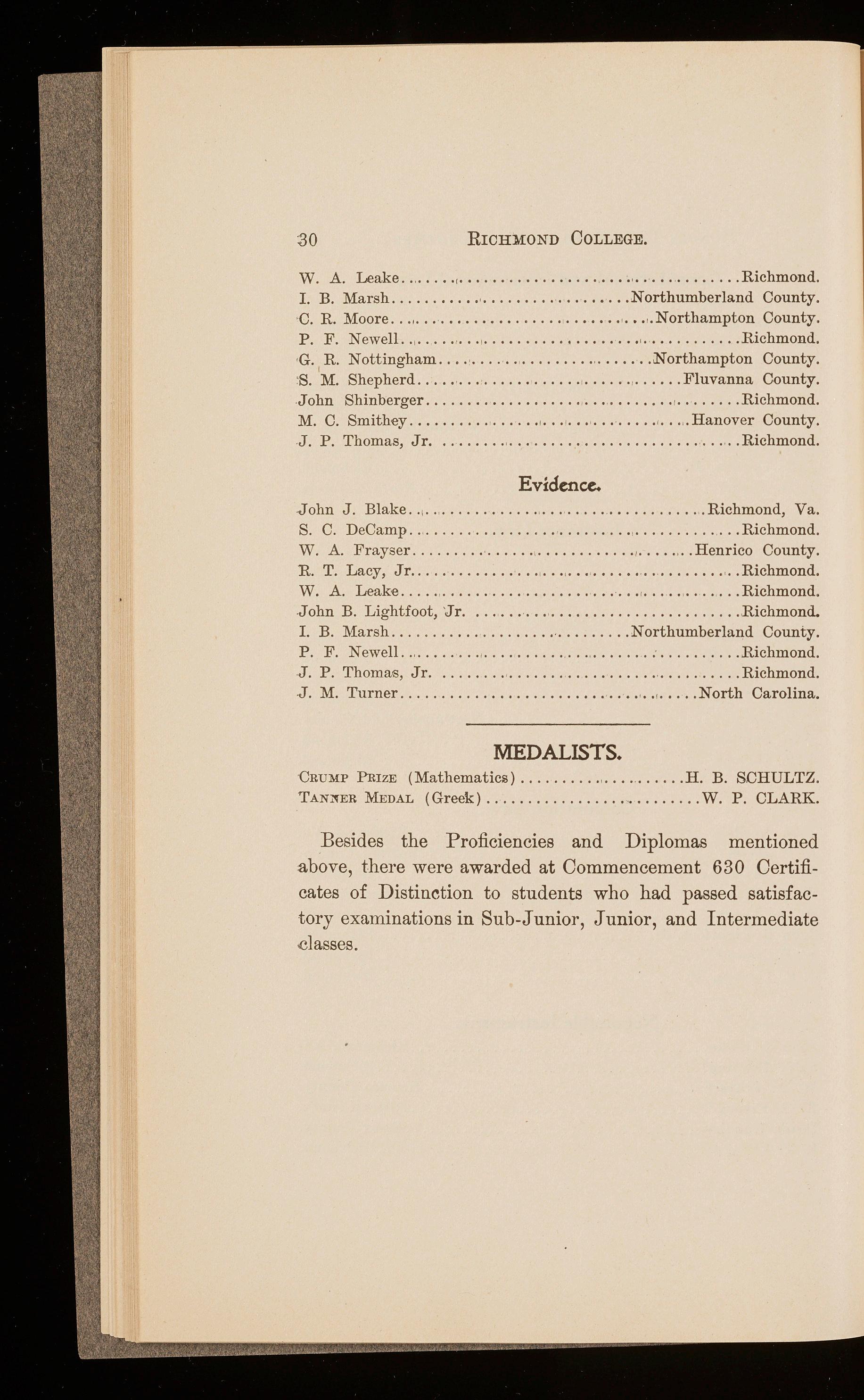
:30 RICHMOND COLLEGE.
W A. Leake , ,..................... , ... Richmond.
I. B. Marsh .. Northumberland County. ,c. R. Moore ... ,.. .. . .. ....... ... . . . .... . ,... ,.Northampton County.
P. F Newell , , , Richmond. •G. R. Nottingham ... .... .. . ......... .,. ..... .Northampton County . :S. 1 M. Shepherd , , Fluvanna County.
John Shinberger ...................... , , Richmond
M C. Smithey , , , , , Hanover County .
J. P. Thomas, Jr . ,. .Richmond.
.John J. Blake , , , Richmond, Va
S. C. DeCamp , , Richmond
W. A. Frayser , , ,. . Henrico County
R. T. Lacy, Jr , ., , Richmond.
W. A. Leake ,. , Richmond.
John B. Lightfoot, Jr , Richmond.
I. B. Marsh ............... .... ........... Northumberland County .
P. F. Newell ,. , , ,. : Richmond
J. P. Thomas, Jr , . Richmond . .J. M. Turner .... ,..... North Carolina.
-<JRUMP PRizE (Mathematics) , .... H. B. SCHULTZ. TANl'l'ERMEDAL (Greek) W. P. CLARK.
Besides the Proficiencies and Diplomas mentioned above, there were awarded at Commencement 630 Certificates of Distinction to students who had passed satisfactory examinations in Sub-Junior, Junior, and Intermediate dasses.
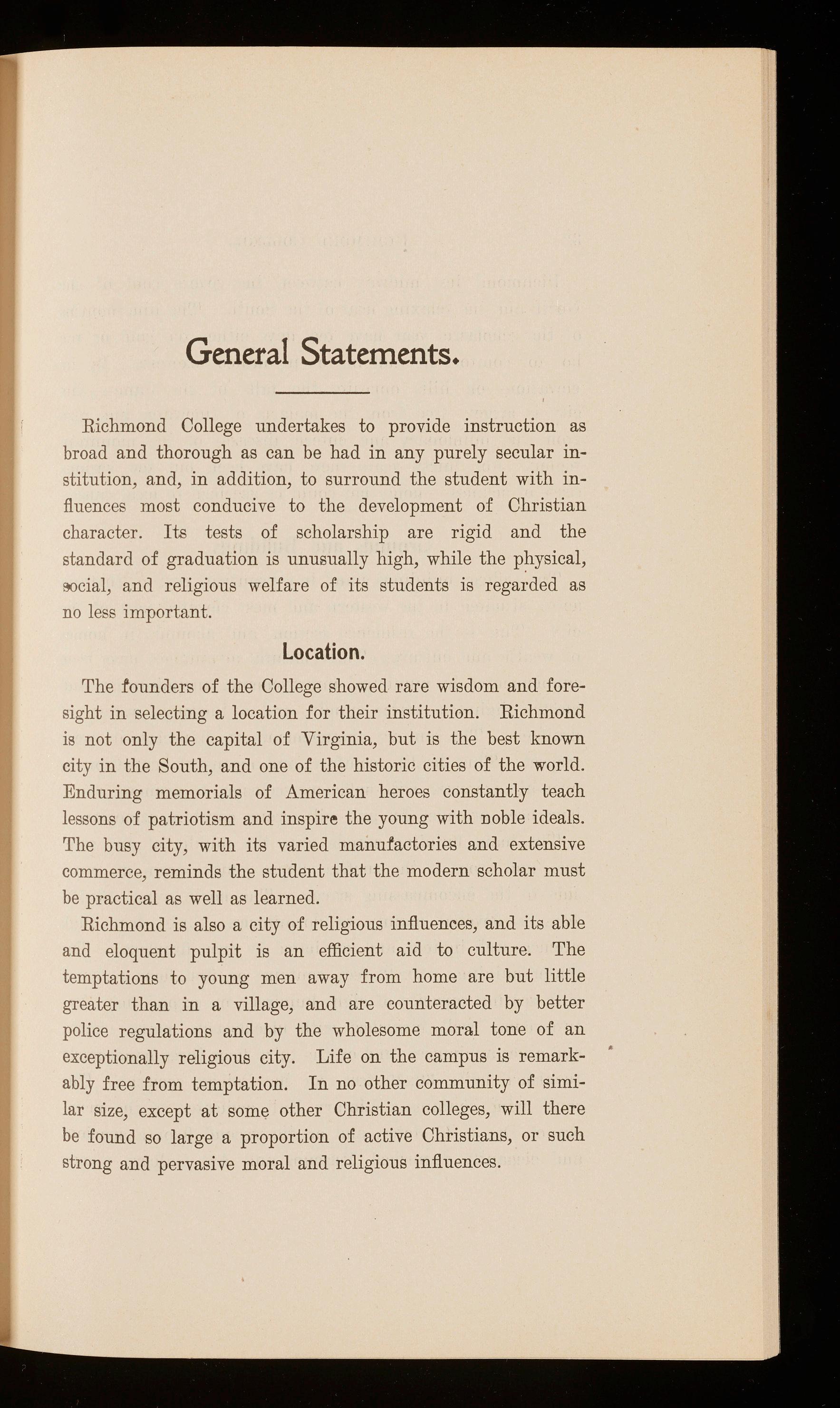
Richmond College undertakes to provide instruction as broad and thorough as can be had in any purely secular institution , and, in addition, to surround the student with influences most conducive to the development of Christian charact er Its tests of scholarship are rigid and the stan dard of graduation is unusually high, while the physical, ~c i al , and religiou s welfare of its students is regarded as no l ess imp ort ant .
T he founders of the College showed rare wisdom and foresight in selecting a location for their institution. Richmond is not only the capital of Virginia, but is the best known city i n the South , and one of the historic cities of the world. End uring memorials of American heroes constantly teach lessons of patriotism and inspire the young with noble ideals. The bu sy city , with its varied manufactories and extensive commer ce, reminds the student that the modern scholar must be pr actical as well as learned.
R ichmond is also a city of religious influences, and its abl e and eloquent pulpit is an efficient aid to culture. The temptations to young men away from home are but little great er than in a village, and are counteracted by better police regulations and by the wholesome moral tone of an exceptionally religious city. Life on the campus is remarkably free from temptation. In no other community of similar si ze, except at somt,J other Christian colleges, will there be found so large a proportion of active Christians, or such strong and pervasive moral and religious influences .
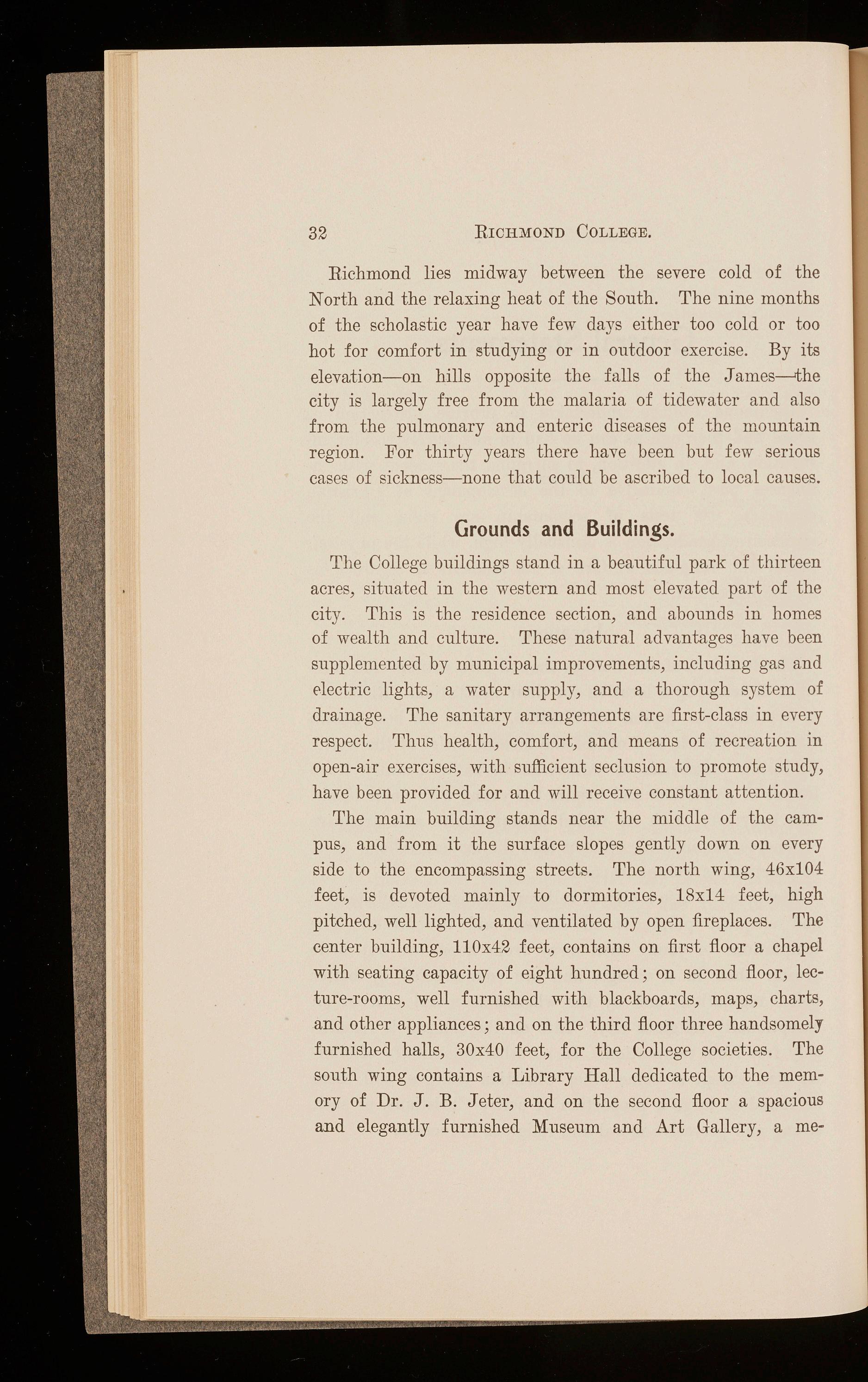
RICHMOND COLLEGE.
Richmond lies midway between the severe cold of the North and the relaxing heat of the South. The nine months of the scholastic year have few days either too cold or too hot for comfort in studying or in outdoor exercise. By its elevation-on hills opposite the falls of the J ames----ithe city is largely free from the malaria of tidewater and also from the pulmonary and enteric diseases of th e mountain region. For thirty years there have been but few serious cases of sickness-none that could be ascribed to local causes.
The College buildings stand in a beautiful park of thirteen acres, situated in the western and most elevated part of the city. This is the residence section, and abounds in homes of wealth and culture. These natural advantages have been supplemented by municipal improvements, including gas and E'lectric lights, a water supply, and a thorough system of drainage. The sanitary arrangements are first-class in every respect . Thus health, comfort, and means of recreation in open-air exercises, with sufficient seclusion to promote study, have been provided for and will receive constant attention.
'l'he main building stands near the middle of the campus, and from it the surface slopes gently down on every side to the encompassing streets. The north wing, 46x104 feet, is devoted mainly to dormitories, 18x14 feet, high pitched, well lighted, and ventilated by open fireplaces. The center building, 110x42 feet, contains on first floor a chapel with seating capacity of eight hundred; on second floor, lecture -rooms, well furnished with blackboards, maps, charts, and other appliances; and on the third floor three handsomely furnished halls, 30x40 feet, for the College societies. The south wing contains a Library Hall dedicated to the memory of Dr. J. B. Jeter, and on the second floor a spacious and elegantly furnished Museum and Art Gallery, a me-

morial to J ames 'l' hom as, Jr. All these public halls are heated by steam
Directly in the rear or the main building is a Dinin g H a ll , with ncecHul conveniences, and a Gymnasium and BathRoom under the same rooL On one side of this, and in the same lin e, making a row parallel to Lombardy street, is a cottage for st ud ents, with rooms arranged in pairs, study, and chamber, each 9xlJ; al~o hro residences o_f professors.
On the other siclc are three such residences. Thus the students arc brought all the time within the personal influence of at least five pro:fcssors and their Camilies, and the social, religious, and literary life of the College is very grcatl:v promoted.
On oYembcr 17, 1899, hro new buildings were opened. 'l'hec;c lrnildings arc known as Science H all and Memorial Hall. The former cost, with equipment, thirty thousaml dollars; the latter twenty thousand dollars. Both are built o_fpressed bri ck, with granite trimmings.
Science Hall measures 120x5 1 feet, and is three stories abore a basement. The well -lighted basement contains boilers for heating three buildin gs with steam, and al so shop s and appa r at u s rooms. The twent y-seven rooms above the bascnwnt arc all devoted to instruction in the natural sciences.
On tlic fir st floor are thre e laboratories for chemistry, a l ecture hall, a librar y-room , a balance-room, profe ssor's office, and two suppl:v rooms for chemicals and apparatus. The firRt year laboratory accommodate s fifty students at one time . The second :vcar laborator y ha s desks for b ·enty-four. The lectur e-room has terraced scats arranged in semi -circles, with places for one lrnndrcd and twcnt y-fil·e :-tuclents.
The arrangements in th e clcpartmcnt of physics are similar to those made for chemistry, each school occupying an

RICIUiOND COLLEGE.
entire floor. Rooms are provided on the third floor for instruction in biology. All lecture-rooms and laboratories are ventilated by the most improved system. '1 1 he entire building is supplied in every part with water, gas, and electricity. No trouble has been spared to make this hall one of the best of modern buildings for the purpose of teaching laboratory sciences.
Memorial Hall was erected to furnish lodgings for students and also to commemorate the li,es and deeds of Virginia Baptists who have worthily contended for the principles of the denomination. Besides rooms named for individuals, both men and women, the Hall contains a spacious fire-proof room with memorial windows, in special remembrance of those heroic preachers who suffered during the struggle for religious liberty in Virginia. The room has been placed in charge of the Virginia Baptist Historical Society.
The building contains lo clgings for seventy students. It is heated by steam and furnished with tub and shower baths.
The College is composed of nine academic schools, or departments, and the professional school of Law. Instruction is also given in Biblical Literature and Physical Culture. The Faculty consists of a president and nine professors, each responsible for the efficient conduct of his own school. The president has general oversight and direction of the discipline of the College, but may refer to the Faculty cases calling for serious penalty.
The system of schools has many advantages. Among them the following deserve attention: The professor feels the full force both of individual duty and personal ambition; the course of instruction can readily be enlarged or altered to adapt it to the progress of science and to the varying wants
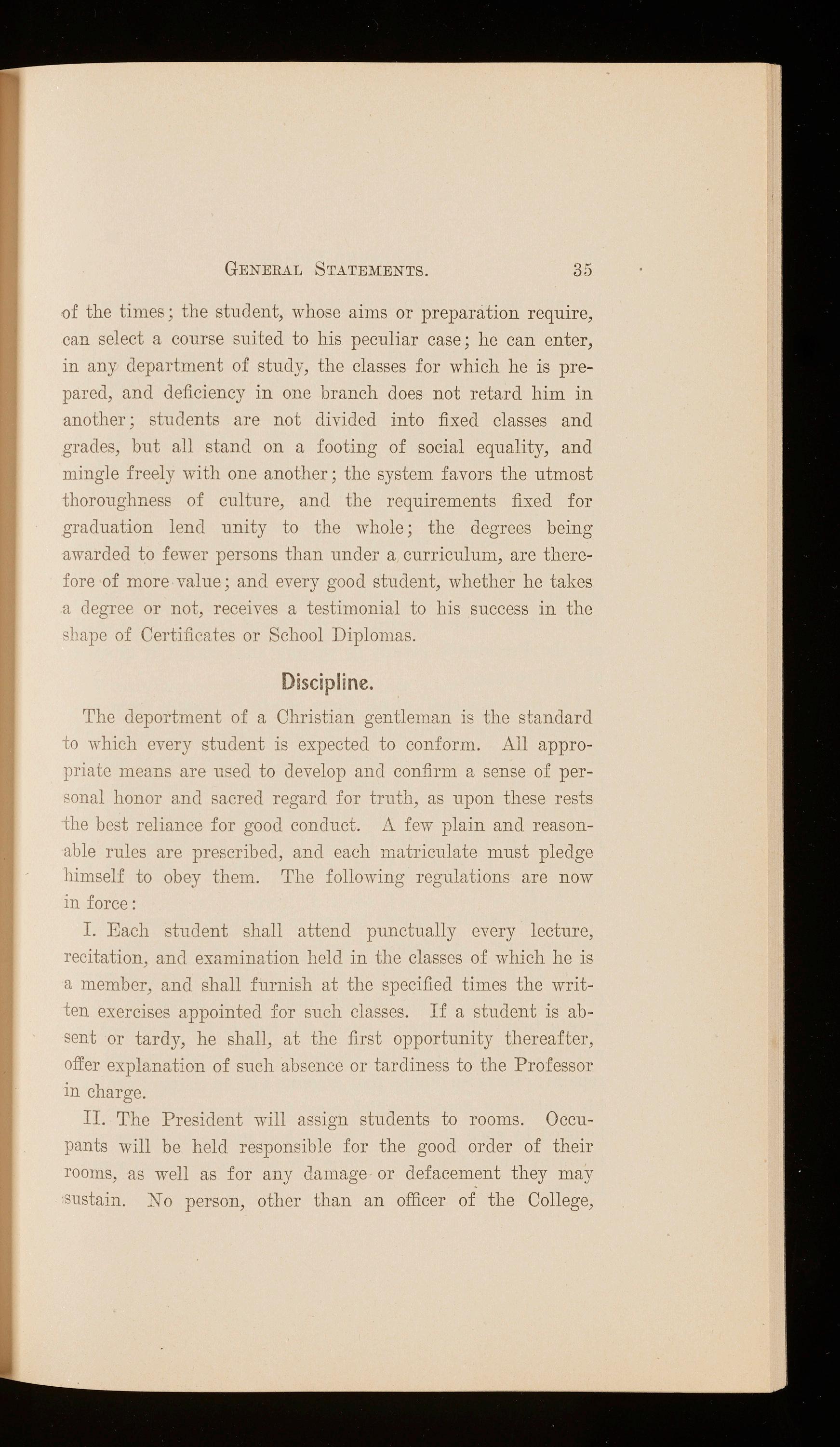
of the times; the student, whose aims or preparation require, can select a course suited to his peculiar case; he can enter, in any department of study, the classes for which he is prepared, and deficiency in one branch does not retard him in another; students are not divided into fixed classes and grades, but all stand on a footing of social equality, and mingle freely with one another; the system favors the utmost thoroughness of culture, and the requirements fixed for graduation lend unity to the whole; the degrees being awarded to fewer persons than under a curriculum, are therefore of more value; and every good student, whether he takes a degree or not, receives a testimonial to his success in the sbape of Certificates or School Diplomas.
The deportment of a Christian gentleman is the standard -to 11·hichevery student is expected to conform. All appropriate means are used to develop and confirm a sense of personal honor and sacred regard for truth, as upon these rests the best reliance for good conduct. A few plain and reasonable rules are prescribed, and each matriculate must pledge himself to obey them. The following regulations are now in force:
I. Each student shall attend punctually every lecture, recitation, and examination held in the classes of which he is a member, and shall furnish at the specified times the written exercises appointed for such classes. If a student is absent or tardy, he shall, at the first opportunity thereafter, offer explanation of sl1ch absence or tardiness to the Professor in charge.
IL The President will assign students to rooms. Occupants will be held responsible for the good order of their rooms, as well as for any damage or defacement they may sustain. No person, other than an officer of the College,
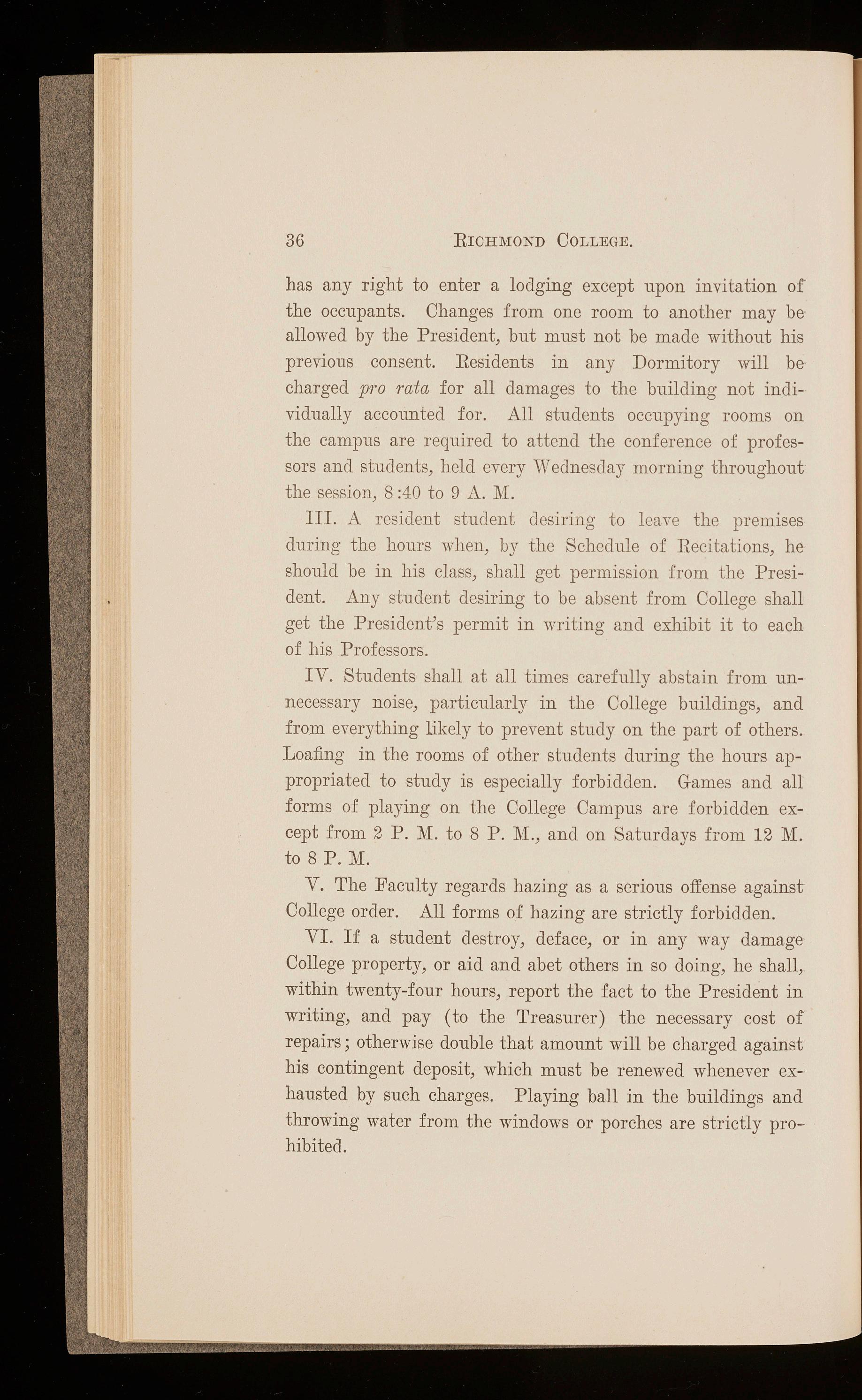
RICHMOND
COLLEGE.
has any right to enter a lodging except upon invitation of the occupants. Changes from one room to another may be allowed by the President, but must not be made without his previous consent. Residents in any Dormitory will be charged pro rata for all damages to the building not individually accounted for. All students occupying rooms on the campus are required to attend the conference of professors and students, held every 1Vednesday morning throughout the session, 8 :40 to 9 A. JU.
III. A resident student desiring to lcaYe the premises during the hours when, by the Schedule of Recitations, he should be in his class, shall get permission from the President. Any student desiring to be absent from College shall get the President's permit in writing and exhibit it to each of his Professors.
IV. Students shall at all times carefully abstain from unnecessary noise, particularly in the College buildings, and from everything likely to prevent study on the part of others. Loafing in the rooms of other students during the hours appropriated to study is especially forbidden. Games and all forms of playing on the College Campus are forbidden except from 2 P. M. to 8 P. III., and on Saturdays from 12 M. to 8 P. lVL
V. The Faculty regards hazing as a serious offense against College order. All forms of hazing are strictly forbidden.
VI. If a student destroy, deface, or in any way damage College property, or aid and abet others in so doing, he shall, within twenty-four hours, report the fact to the President in writing, and pay (to the Treasurer) the necessary cost of repairs; otherwise double that amount will be charged against his contingent deposit, which must be renewed whenever exhausted by such charges. Playing ball in the buildings and throwing water from the windows or porches are strictly prohibited.
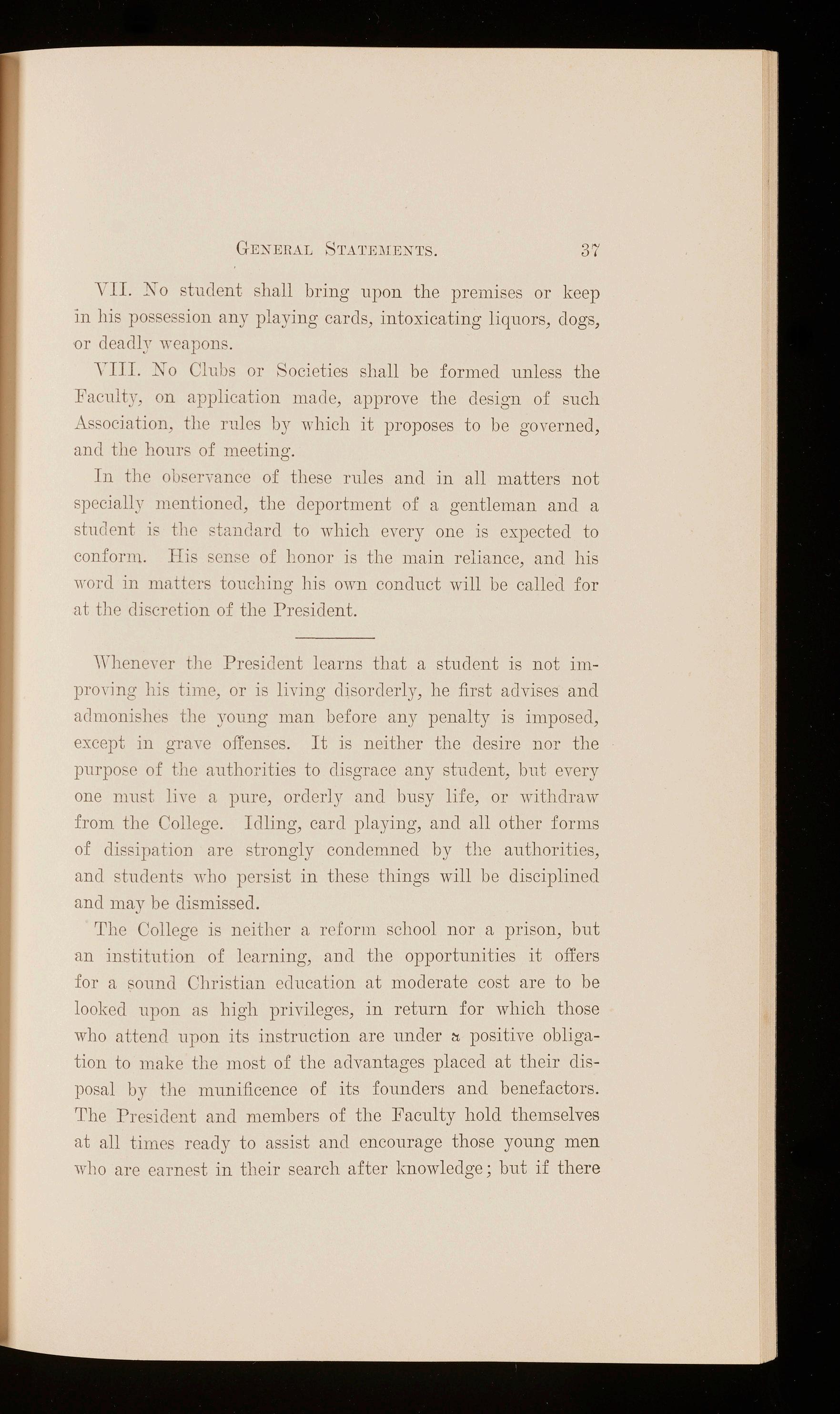
GEXEIUL ST.ITEillEXTS.
YII. X o student shall bring upon the premises or keep in his possession any playing carcls, intoxicating liquors, dogs, or deadly "·capons.
YIJI. X o Clubs or Societies shall be formecl unless the Faculty, on application made, approve the clesign of such Association, the rules by ,rhich it proposes to be governed, and the hours of meeting.
]n the obsc•rrnnce of these rules ancl in all matters not specially mcntionccl, the deportment of a gentleman and a stnclcnt i, the !'tanc:arcl to which eYcry one is expected to conform. His sen~c o[ honor is the main reliance, ancl his ,rorcl in matters touching his own conduct will be callecl for at the discretion of the rresiclent.
\\"henewr the President leams that a student is not impro1ing his time, or is liYing disorclerly, he first a1hises ancl admonishes the young man before any penalty is imposed, except in grai;e o:f1'enses. It is neither the desire nor the purpose of the authorities to disgrace any student, bl1t every one must liYe a pure, orderly ancl busy life, or ,rithdraw from the College. Idling, card playing, and all other forms of dissipation arc strongly conclernncd by the authorities, and students who persist in these things ,rill be disciplincc1 and may be dismissed.
The College is neither a reform school nor a prirnn, but an institution of learning, and the opportunities it offers for a sound Cliristian education at moderate cost are to be looked upon as high privileges, in return for which those who attend upon its instruction are under positive obligation to make the most of the advantages placed at their disposal by the munificence of its founders and benefactors. The President ancl members of the Faculty hold themselves at all times ready to assist and encourage those young men wbo are earnest in their search after knowledge; but if there
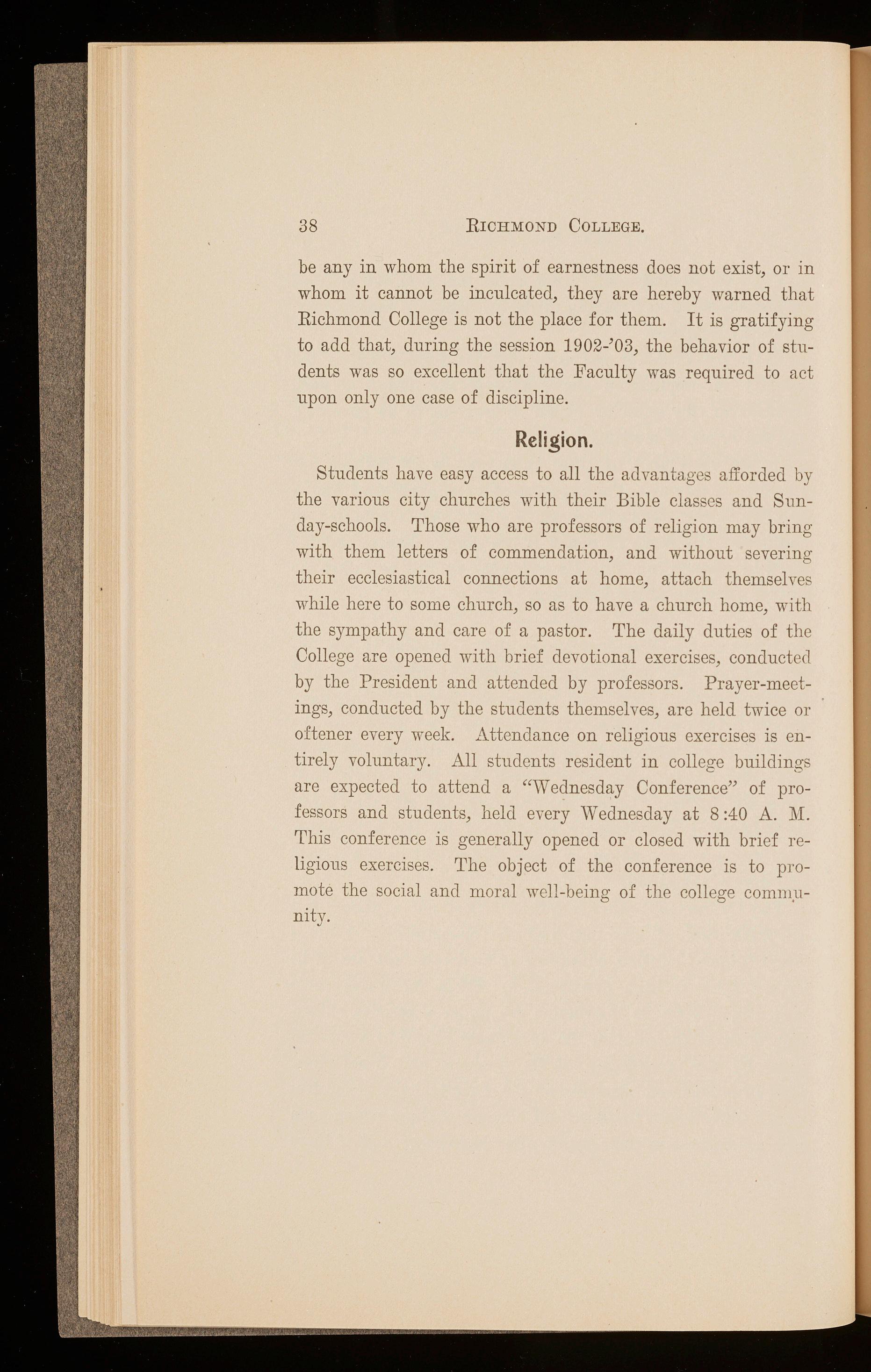
RICHMOND COLLEGE.
be any in whom the spirit of earnestness does not exist, or in whom it cannot be inculcated, they are hereby warned that Richmond College is not the place for them. It is gratifying to add that, during the session 1902-'03, the behavior of students was so excellent that the Faculty was required to act upon only one case of discipline.
Students have easy access to all the advantages afforded by the various city churches with their Bible classes and Sunday-schools. Those who are professors of religion may bring with them letters of commendation, and without severing their ecclesiastical connections at home, attach themselves while here to some church, so as to have a church home, with the sympathy and care of a pastor. The daily duties of the College are opened with brief devotional exercises, conducted by the President and attended by professors. Prayer-meetings, conducted by the students themselves, are held twice or oftener every week. Attendance on religious exercises is entirely voluntary. All students resident in college buildings are expected to attend a "Wednesday Conference" of professors and students, held every Wednesday at S :40 A. l\f. 'l'his conference is generally opened or closed with brief reli gious exercises. 'l'he object of the conference is to promote the social and moral well-being of the college comm.unity.

. Professor Foushee.
Tl1c course o E study, embracing four years, is indicated by the text-books used in the several classes. Students entering the school will be classed according to their preparation. For the lowest class there is requirecl such acquaintance with the clements of Latin grammar as will enable one to begin to translate with profit.
The Sun -J ux101: ancl Jcxrnu Classes are persistently drilled in the form s and the syntax of the language, with due attention i.o quantity. The lXTEmIEDIATE and SENIOR Classes contim 1c to give needful attention to grammatica l principles, while they arc required to attain a good vocabulary and to imbibe the spirit of Latin literature by an extcnsi 1c course of reading, somewhat varied from year to year. In all the classes the student's pTOgress is tested, and his powers of analysis and composition are cultivated by written exercises in rendering English into Latin and Latin inio English. '!'he disciplinary power and cultural value of the study of Latin are equally emphasized.
TEXT·BOOKS.
Snb·J unior.-Second Year in Latin ( Ginn & Co.) ; N epos ( Ameri· can Book Company) ; Bennett's Latin Composition; Bennett's Latin Grammar.
.Junior.-Sa llu st·s Catiline (G inn &, Co.); Cicero's Orations and Letters; Vergil's Aeneid (Ginn & Co.); Hexameter Verse; Collar's Practical Pro-sc Composition; Gilderslcevc's Latin Grammar. Intermediate.-Livy, I., XXL, and XXII.; Horace, Odes, Satires, and Bpi,stles ( Ginn & Co.) ; Meters of Horace; exercis·es in Latin

Prose Composition based on CicPro·,s De Scncctute and De A micitia; GilderskeYe's Latin Grammar; :\Iackail's Lalin Lileralu r C'. Senior.-The Satires of Ju,·enal; The Annals of Tacitus, Plaut u s, l\fenacchmi. TC'rcnce; Cro\\'ell's selections from Luc r etius, Catu ll us, Tibullus, Propcrtiu , Ovi d, rtnd Lucan. Exercises in Latin Composition; Gildersl<'Cve s Lal i n Grammar. For Hcfrrencc: llarper's Lalin Lrxicon; Gin n's Classical s\llas; Gayky's C'laosic ::\[ylhs.
Professor llc11Tis.
The aim of this ~chool is to girn the student an appreciatiYe acquaintance with the best Greek authors and inspire a loYe for Hellenic studies. From the beginning o.f the course exactness will be insisted upon. In all classes reading at sight will be practiced, and English will be put into Greek, either as a set exercise or at dictation . At suitable times there ,rill he conferences on Greek life, mythology, history, literatnrr an<l art. ancl at all times an rfrort 11·ill be made to lead the ~tlHl(•11tinto a keener appreciation of the genius of the Greeks , an<l to Cllltirntc a sense for their literary stanllarcls.
The ,rnrk o.f this school is embraced in the following courses:
I. SuB-Jc:,;ron C1.Ass.-Tbis dasR begins with the alphabet, and is occupiecl in securing a thoro11gh knowledge of forms, a working rncabulary, ancl the fundamental points oE syntax. In the ~pring, the ~'\.naba~i,:;will he taken up, and one or more books will be reacl. Fire hours a 1cccl,;throt1ghov.l the year.
To enter this c011rRea knowleclgc of I,;itin is prerequisite.
TT. .Jcx1011 Cuss.-This cla"s will complete four books o.f the Anahasis arnl then fake up Lysias, or some author to be selected. Especial attrnlion ,rill be paid to forms ancl inflections. 'ireekly exercise:;; in composition; trans lation at sight; grammar. Fire hours a 1ceel.: throughout the year .
1TI. IKTEH:.'lfEDIAT:cCuss.-This comse will be subject to

change as the needs of the students may dictate. The work will center around Plato, the Drama, and Homer. Weekly exercises in composition; brief l ectures on Gr eek philosophy, the Drama, Horner, and their r elatio ns to Greek life. Work will be assigned for prirnte reading, on which the student will be examined.
IV. SE:XIORCu.ss.-Jn tl1is course the work will center around Tlrncyrlidcs and Demosthenes. , York will also be assigned for private rcacli11gin Hcroclotus and t h e Attic Orators. rrhc course will be marlc as general as is consistent with thorol1glrncss. Lectures on literature, grammar and rhetoric.
GREEK TESTX:IIEKT.-IJ' there is sufficient demand, provision will be maclc for a study of the New Testament in Greek. This clns:=;is not gi-ren College crcclit, but finds in it self its own re,rarcl. The ,rork ,rill be made as practical as possible.
TEXT·IlOOKS •
.S11b-Jimior.-1Yhilc's Firnt (h'eek Book; Harper & 1Vallace's or Goodwin's Xenophon's Anabasis; Babbitt's Greek Grammar. Junior .-X enophon's Anabasis and Grammar as above. \Vait's Oral ions of Lysias; Pearson's Greek Prose Composition. Intcr111ccliate.-T01de'·.s Plato's Protagoras; F l agg's Ettripides' Iphigenia; D'Ooge's Sophocl<'s' Lntigone or Humphrey's Aristophanes' Clouds; Sepnour·,s J/o mcr's Iliad or Pcrrin's IIomer's Odyss ey; Seymom.-s llomeric Language ancl l'erse
.Scnior.-l<'rosl's Sicilian £.x:peclition; :!IIerriam'•s ll erodotus; D'Ooge's or Tyler's Demosthenes' De Corona; Jebb's Selections from the Attic Orators; G il dersleeve's Syntax of Classical Greek (Part I.); Jebb's Gi·eek Literature.
Greek 'l'estw,rnnt.-\\'cstcolt & Hort's Greek New Testament.
Tli rough the College library the student has access to all necessary "·orks of reference.
Professor Boativri[!ht.
Instruction in this department is adapted to giYc tlir sturlrnt a knowledge of Yocabulary and grammatical structure suffi-
42
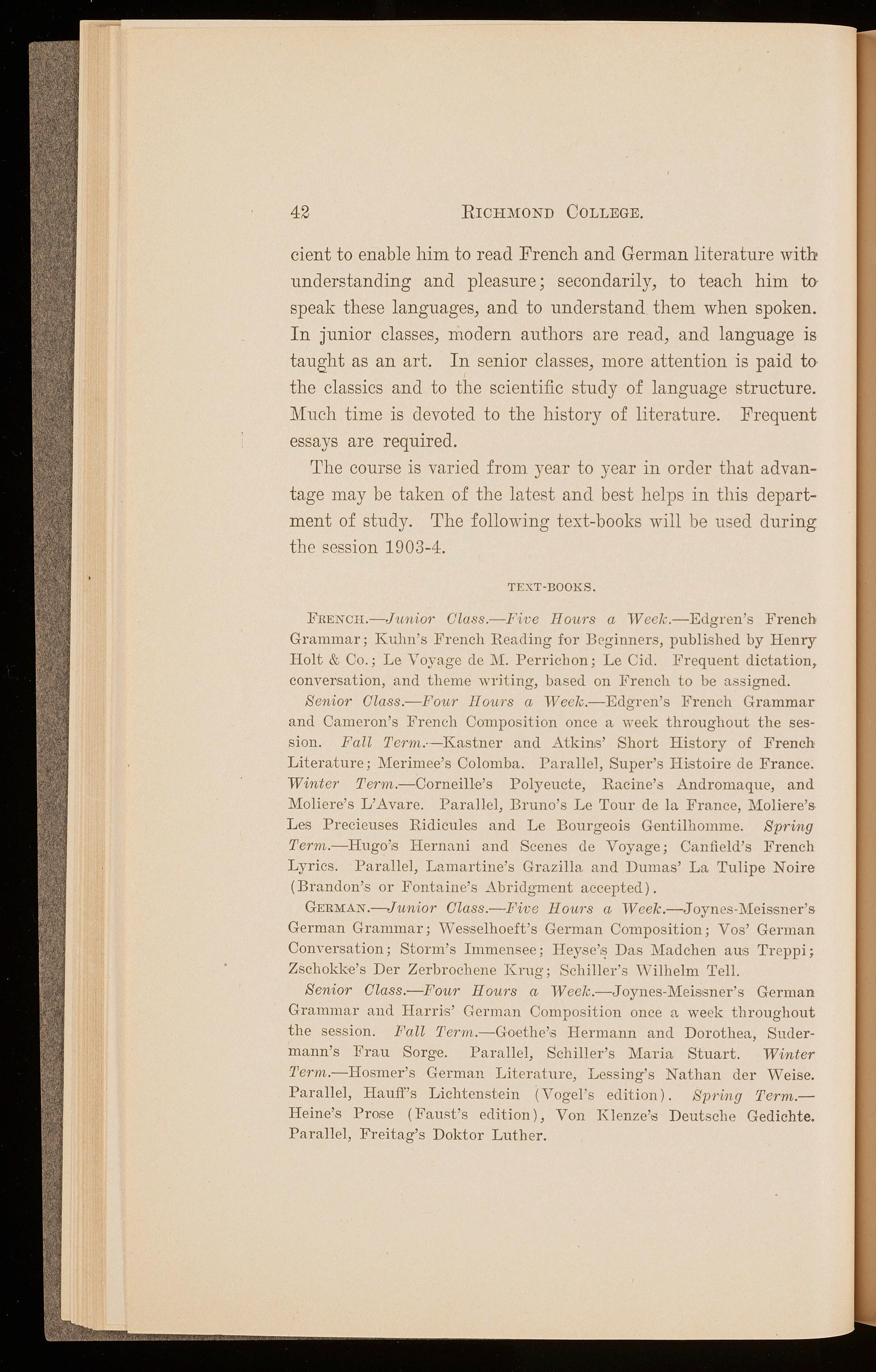
RICHMOND COLLEGE.
cient to enable him to read French and German literature with understanding and pleasure; secondarily, to teach him tospeak these languages, and to understand them when spoken. In junior classes, modern authors are read, and language is taught as an art. In senior classes, more attention is paid to the classics and to the scientific study of language structure. Much time is devoted to the history of literature. Frequent essays are required.
The course is varied from year to year in order that advantage may be taken of the latest and best helps in this department of study. The following text -books will be used during the session 1903-4.
TEXT·IlOOKS.
FRENCII.-Jimior Class.-Five Hoi,rs a lVeek.-Edgren's French Grammar; Kuhn's French Reading for Beginners, published by Henry Holt & Co.; Le Voyage de l\I. Perrichon; Le Cid. Frequent dictation, conversation, and theme writing, based on French to be assigned. Senior Class.-Four ]lours a lVeek.-Edgren's French Grammar and Cameron's French Composition once a ,Yeek throughout the session. Fall Terni.--Kastner and Atkins' Short History of French Liternture; l',forimee's Colomba. Parallel, Super's Histoire de France. Winter Terni.-CorneiHe's Polyeucte, Racine's Andromaque, and Moliere's L'Avare. Parallel, Bruno's Le Tour de la France, Moliere's Les Precieuses Ridicules and Le Bourgeois Gentilhomme. Spring Term.-H ugo',s Hemani and Scenes de Voyage; Canfield's French Lyrics. Parallel, Lamartine's Grazilla and Dumas' La Tulipe Noire (Brandon's or Fontaine's c\briclgmcnt accepted).
GERMAN.--Junior Class -Five Hai.rs a lYeelc.-Joynes-Meissner's German Grammar; Wesselhoeft's German Composition; Vos' German Com·ersation; Storm's Imrncnsee; I-Ieyse',~ Das Mad ch en aus Treppi; Zschokk·e's Der Zerbrochene Krug; Schiller ' s Wilhelm Tell.
Senior Class.-Foi,r Hours a TVeek.-Joynes-Meis,sner's German Grammar and Harri·s' German Composition once a week throughout the session. Pall 'l'erm .-Goethe' ,s Hermann and Dorothea, Sudermann's Frau Sorge. Parallel, Schiller's Mal'ia Stuart. Winter 'l'erm.-Hosmer's German Literature, Lessing's Nathan der iVeise. Parallel, Hauff's Lichtenstein (Vogel"s edition). Spring Term.Heine's Prose ( Faust's edition), Von Klenze'c-3 Deutsche Gedichte. Parallel, Freitag's Doktor Luther.
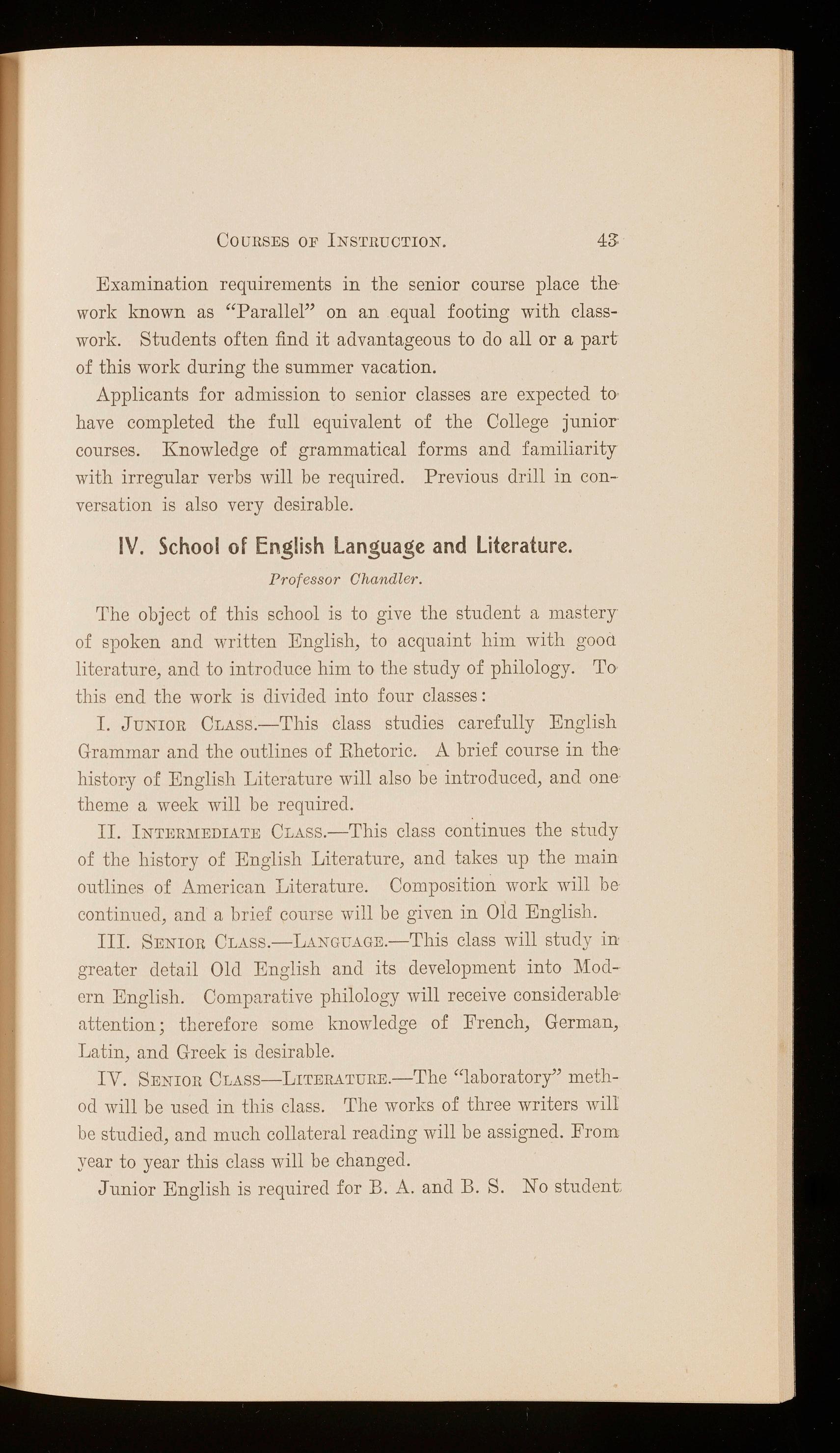
INS'£RUCTION. 4g.
Examination requirements in the senior course place the work known as "Parallel" on an equal footing with classwork. Students often find it advantageous to do all or a part of this work during the summer vacation.
Applicants for admission to senior classes are expected to · have completed the full equivalent of the College junior courses . Knowledge of grammatical forms and familiarity with irregular verbs will be required. Previous drill in conversation is also very desirable.
Professor Chandler.
The object of this school is to give the student a mastery of spoken and written English, to acquaint him with gooct literature, and to introduce him to the study of philology. To this end the work is divided into four classes:
I. JUNIOR CLASs.-This class studies carefully English Grammar and the outlines of Rhetoric. A brief course in the history of English Literature will also be introduced, and one theme a week will be required.
II. INTERMEDIATECu.ss.-This class continues the study of the history of English Literature, and takes up the main outlines of American Literature. Composition ,rnrk will be continued, and a brief course will be given in Old English.
III. SENIOR CLA.Ss.-L~i.NGUAGE.-This class will study in greater detail Old English and its development into Modern English. Comparative philology will receive considerable · attention; therefore some knowledge of French, German, Latin, and Greek is desirable.
IV. SENIORCLASS-LITERATURE.-The "laboratory" method will be used in this class. The works of three writers will be studied, and much collateral reading will be assigned. From year to year this class will be changed.
Junior English is required for B. A. and B. S. No student
-44
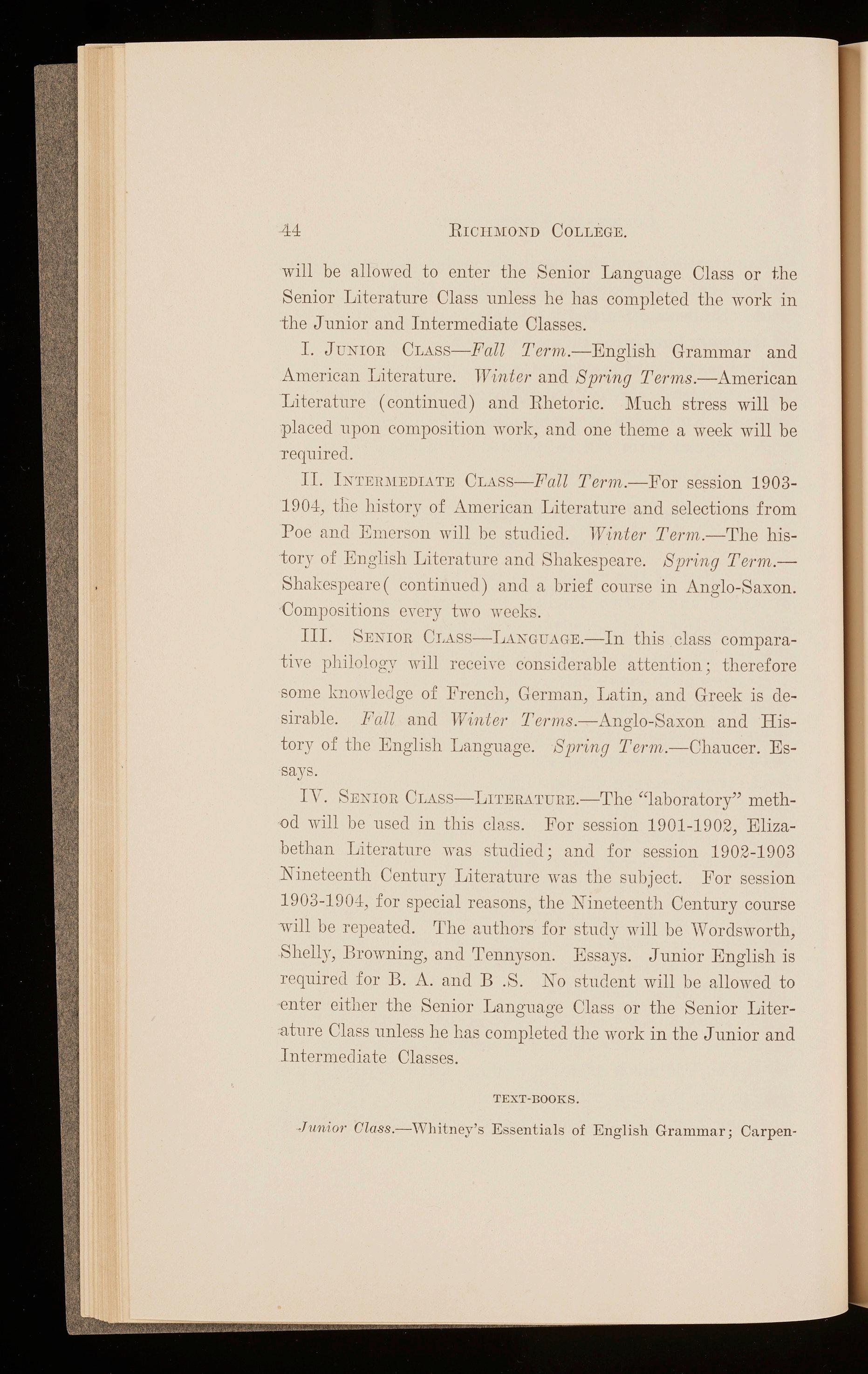
RICILi\IOND COLLEGE.
will be allowed to enter the Senior Language Class or the Senior Literature Class unless he has completed the work in the Junior and Intermediat e Classes.
I. Juxrnu CLASS-Fall Tenn.-English Grammar and American Literature. Winier and Spring Terrns.-American Literature (continued) and Rhetoric. Much stress will be placed upon composition work, nnd one theme a week will be required.
IT. IxTElL\LEDLITECLASS-Fall Term.-For session 1903190-1, the hii:;tory of American Literature and selections from Poe nnd Emerson will be st uclicd. Winter Tenn.-The history of E11glish Litcrahirc nnd Shakespeare . Spring Terrn.Slrnkcspcarc ( contim1ccl) and a brief course in Ang lo-Sa xon. Compositions CYcry two weeks.
III. SEXIOR Cr.Ass-Lxxau ,1aE.-In this class comparati-rc philolog-y will rccci1,c consiclcrnblc attention; therefore some kno,rlc,lgc of French, German, Latin, ancl Greek is desirable. Fall nnd Winter Terms.-Anglo-Saxon and History of the English Language. Spring Term.-Chaucer. Essays.
IY. SExIOn CLASS-LJ'l'ElUTUTIK-Thc "laboratory" method will be 11Scdin this class. For session 1901-1902, Elizabethan Literature was studied; ancl for session 1902-1903 Nineteenth Century Litcratmc ,rn s the subject For session 1903-190-1, for special reasons, the Ninctcc11th Century course will be repeated. The authors for study will be \'i7 ordsworth, Shelly, Browning, and Tennyson. Essays. Junior English is required for B. A. and B .S. No student will be allowed to enter either the Senior Language Class or the Senior Literature Class unless he has completed the work in the Junior and Intermediate Classes.
TEXT-BOOKS .
.Junia,· CZass.-Whilney's Essentials of English Grammar; Carpen-

COURSES OF INSTRU CT ION. -!5,
te r' s Rhetoric , and M:at thew's Introduction to Ame.ric::m Literature .. Collat era l reading from Longfellow, lrTing , and Cooper.
Intermecliate Class.-Pattce's American Literature, Pattec's Foundations of Engli sh Literature; Baskerville, H a rri son, and Hall'·s Ang lo-S axo n Reader; Poe a nd Emerson a nd Shakespeare ( text,s to be s·elected). Coll atera l reading from Franklin, Low ell , Timrod, Lanier,. Ascham, Jonson, Bacon, i\Iil to n , and Shakes p ea r e.
Senior Class -Langiwge.-Basken ill , Jfo ni ,c;on, and l Ja ll 's A n g loSaxo n Reader; Emerson ·•s History of the Englis h Language; Chaucer (texts to be selected) . Coll ateral r ead in g: Hall's Beowulf, Phcenix and Judith, and Mo rri s' a nd 8keat's Spec im ens of E.:uly English, Part IL
Senior Class -Litercitiire .-Saint,slrnr,{s Kinetrcnth Cent ur y Literatm,e; \Yorcl-sworth, S h elby, Browning, and Tennyson ( texts to be selected). Coll atera l r eading from Byron, Keate;;, Col eridge, ~facaulay, Car lyle, Pater, and Newman.
Prnfessor Gaines.
'l'his school offers a course of pure Mathematics extending over four years. The work of the lowest class pre-suppo:,es a thoroug h knowled ge of Arithmetic and of E l ementary _\Jgcbra through simple Equations.
'l'he aim of the course is not so much to make specialists of a few enthusiastic students as to give thorough mental di scipline to the many. It is intended to increase the student's power of independent, earnest, hon est inv estigation; to encourage the habit of stating with clearness and exactness hi.s own convictions, and of giving logically his reason s for th e m. Throughout the entire course numerous exercises and original problems are given to st imulate the st udent's confidence in bi s own reasoning, and to cultivate his power of invention. But while mental development is the chief aim, still it is believed that the student who masters the course given below will have realized something of the power and elegance of the science, and the magnitude of the field that lies before him; and if he should wish to pursue the subject further, will have ·

TIICI-LMONDCOLLEGE.
:acquired sufficient knowledge of Mathematics and mathemati-cal methods to be able to continue his studies in the graduate ,courses offered in the leading universities of America.
SUB-JUNIORCLASS.-Algebra through Quadratic Equations and Plane Geometry. (Five times a week).
TEXT-BOOKS.
Hall and Knight's Elementary Algebra, Beman and Smith's -Geometry.
JUNIOR CLASS.-Solid Geometry, Advanced Algebra, Plane 'Trigonometry. (Five times a week).
TEXT-BOOKS.
Beeman and Smith's Geometry; Fisher and Schwatt'<S Algebra; Wentworth's Trigonometry.
INTERMEDIATECLASS-Fall Term.-Analytic Geometry (three times a week). Winter Term-Elementary Differential Calculus (three times a week). Spring term. Elementary Integral Calculus ( twice a week) and Theory of Equations ( once a week) .
TEXT-BOOKS.
Brigg1s-Bocher's Analytic Geometry; McMahan and Snyder's Differential Calculus; Murray!s Integral Calculus.
SENIORCLASS-Fall Term.-Advanced course in Differential and Integral Calculus (three times a week). During the Winter and Spring Terms there are lecture courses on special topics in mathematics varied from year to year. Two of the following courses will be given each year: (1) An elementary course in Differential Equations. (2) The theory of Infinite Series and Products. (3) The theory of complex quantities with a brief introduction to the theory of Functions. ( 4) The theory of Invariants and Covariants, with applications to geometry. ( 5) Modern methods in geo-

metry. As parallel work the students are required to read a short history of mathematics in order that they may know something of the development of the science and of the mathematicians who have principally contributed to this development .
'l'he subject of Land Surveying is taught in an additional class open to students who h::we finished the junior class. Much of the time devoted to this class is spent in the field, thus giving the students familiarity with the instruments used and considerable practice in doing the field work.
TEXT-BOOK. Gillespie's Land Sun-eying.
Prof essor 1\'inston.
The School of Physics embraces the several subjects usualh grouped under this title, or under the practically equivalent name-X atural Philosophy. These include the General Properties of J\Iattcr; :'.\[cchanics proper, or the cardinal doctrine~ of Force, Equilibrium, JUotion, and Energy, in their various kinds, their relations to the several states of matter, and their practical applications; the phenomena and la,rn of Sound, Light, Heat, :Magnetism, and Electricity, and the applications of these in our daily life.
The method of instruction is by text-books and by lectures, for the most part referring to the text, with daily examinations upon both text and lecture, and written exercises. To these are added full and systematic courses of Laboratory instruction, for which the rooms and outfit of the new "Science Hall" give ample facilities. The Department of Physics occupies eleven excellent rooms in this building. The laboratory equipment is already good, and will be added to from time to time, especially in the Department of Electricity.
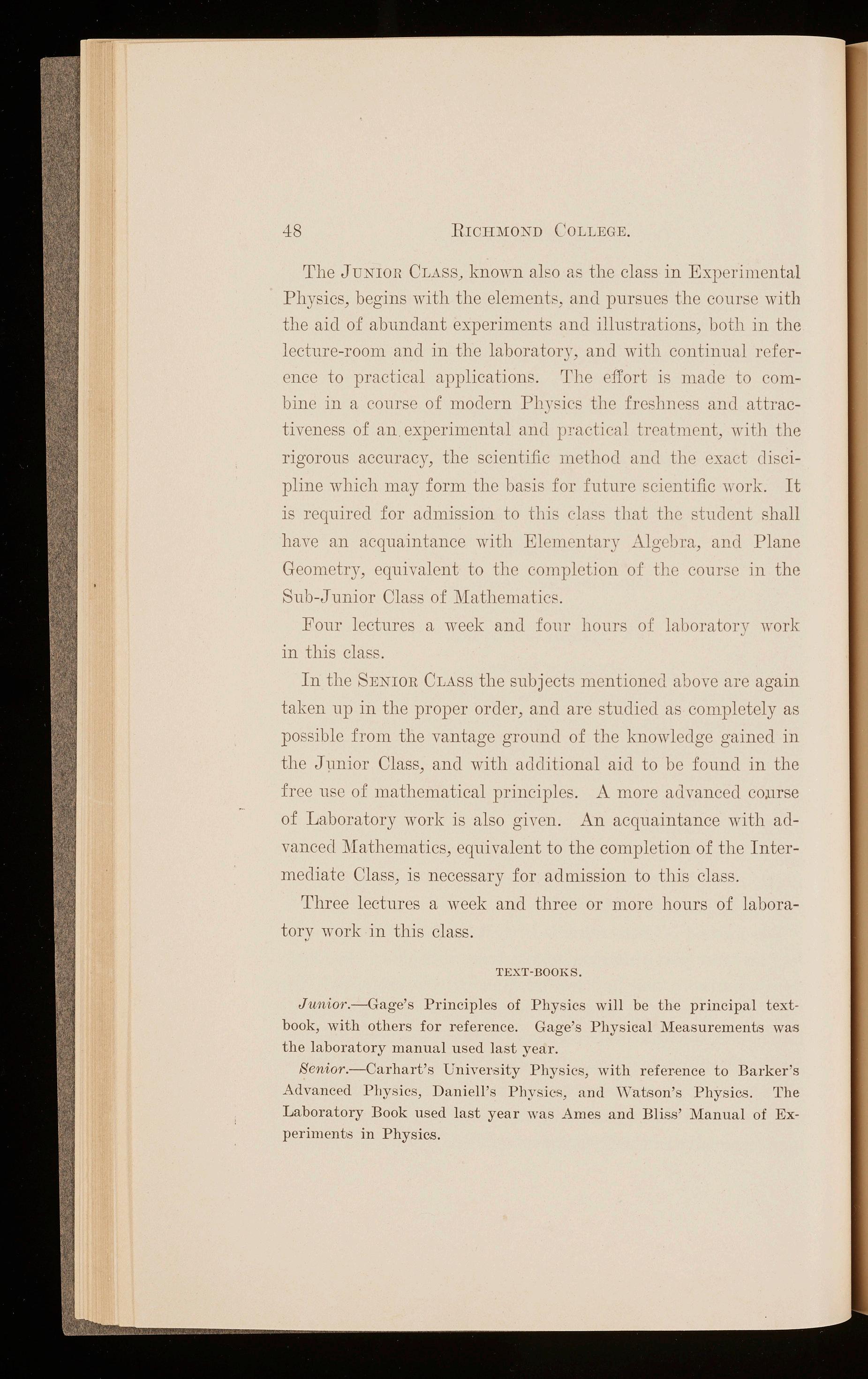
The Jmnon CLASS,known also as the class in Experimental Physics, begins with the clements, anc1pursues tho course with the aid of abundant experiments and illustrations, both in tho lecture-room and in the laboratory, and with continual reference to practical applications. Tho e:ffort is made to combine in a course of modern Physics tho froslrnoss and attractiveness of an experimental ancl practical treatment, with the rigorous accuracy, tho scientific method and tho exact cliscipline which may form the basis for future scientific work. It is required for admission to this class tliat tho stuclent shall have an acquaintance with Elementary Algebra, and Plane Geometry, equivalent to tho completion of the course in the Sub -Ju nior Class of Mathematics.
Four lectures a week and fo11r hom·s of laboratory ,rork in this class
In tho SimroR CLASSthe subjects mentioned above are again taken up in the proper order, and are studied as completely as possible from the vantage ground of the knowledge gained in the Junior Class, and with additional aid to be found in the free use of mathematical principles. A more advanced co;nrse of Laboratory work is also given. An acquaintance with advanced 1\Iathomatics, equivalent to the completion of the Intermediate Class, is necessary for admission to this class.
Three lectures a week and three or more hours of laboratory work in this class.
Junior.-Gage's Principles of Physics will be the principal textbook, with others for reference. Gage's Physical Measurements was the laboratory ma nual used last year.
Senior.-Carhart's Univernity Physics, with reference to Barker's Advanced Pl,ysics, Daniell's Physics, and Yratson's Physics. The Laboratory Book used last year was Ames and Bliss' Manual of Experiments in Physics.

COURSES OJ!' INSTRUCTION.
Heretofore the course in Junior Physics has embraced a brief study of Celestial Physics, or Astronomy. Thi s was studied mainly as affording on the largest scale illustrations and applications of physical principles. The last six or seven weeks of the session were given to it.
The full introduction of Laboratory work consequent upon the occupancy of the new Science building, and the constant enlargement of the courses in Physics proper, have rendered this addition of Astronomy as a part of the course in Physics no longer practicable.
It is designed, however, to continue the teach ing of Astronomy in the College. It will remain in connection with the Department of Physics, but will be made hereafter an independent class. The course will be general and elementary, and will be adapted especially to students having some acquaintance with the el ements of Mathematics and of Physics. One lecture a week throughout the session will be given, with some written exercises, and some Observational and L aborato ry work.
TEXT-BOOK.
Young's Elements of .A.;;tronomy, with Lectur es.
Prof essor Hunt er.
Two distinct but entirely compatible objects are kept in view in the work of this school. The first is to familiarize the stude nt with the more important chemical compounds and the funda mental laws governing their formation and decomposition. The second object is to stimulate the student to critical observation and classification of phenomena, and thus to acquire skill in inductive reasoning.

Rrmnro::rn COLLEGE.
The :first :floor of Science Hall was arranged specifically for the work in this school, and contains laboratories and lecturerooms proYided with the best appointments. The subjects offered arc taught in two classes, each extending through the session of nine months.
JUNIOR CLASS.-During the fall and " ·inter terms the occurrence, preparation and properties of the elements and their chief compounds, togethCT with the fundamental laws of the science are carefully considered. Frequent reference is maclc to important applications of chrnical facts and laws in tl1e industrial arts.
During the spring term, a brief but concise comsc in Geology is given, special emphasis being laicl on the dynamic -agencies no,r acting on the earth as furnishing the key with which to unlock the history of its past. Three lectures and four hours laboratory work per week.
SENIOR CLASs.-During the fall term a wider surrny is taken of chemical phenomena ancl laws than is possible in the Junior Class, special cmphasiR being paid to the more recent developments of physical chemistry.
During the winter term special topics in industrial and agricultural chemistry will be discussed. The study of organic chemistry will be begun, and will continue through the spring term.
Three lectures and at least four hours of laboratory work per week.
TEXT·BOOKS.
Jimior Olass.-Essentials of Chemistry (Hessler and Smith); Tarr's Geology.
Senior Olass.-Inorganic Chemistry (Hollemann-CoopeT); Dennis -and Whittelsey'.;; Qualitative Analysis; Remsen's Organic Chemistry.
Professor Whitsitt.
"Tlie School of Philosophy is designed to supply a suitable

introduction to phi l osophical studies and to awaken in the mind of students such a degree of interest in them as may induce them to undertake and prosecute additiona l researches . It is divided into three classes, the Junior, Intermediate and Senior. The Junior Class is required for the Degrees of B. S. and B. A. Sfodcnts will not be accepted for the Intermediate and Senior Classes who have not completed tl1e work in the Junior ClasR, or its cquiYalent.
The disciplines of the Junior Class are divided into courses as follows:
I. Psycholog_v, in which attention will be given to the stucly of tlic mental life of animals as tbc same is related to ql1estions of human ps:ycl10logy,ancl lectures will be given on the methocls and results of animal psychology. The psychology of the child will next be treated in order to set forth the development of the mental life as it appears in the adult individual. Last l y . the cliscnssion of adult human psychology ,1·ill be undertaken .
II. Ethics, which is treated with reference to its scope and its relations to other sciences. Attention is given to tl1c various theories of the mom] standard, ancl to the moral life in its social and individual aspects, and likewise to the relations between ethics and metaphysics.
The disciplines of tl1c Intermediate Class are arranged as follows:
I. Logic, in which consideration is given to the elements, as terms, propositions and syllogisms. The laws of thought, the rules of the syllogism, its moods and figures are carefully taught, as well as conditional arguments, fallacies, induction and other subjects.
II. The History of Philosophy, which is studied from its origin among the Ionians do,rn to our own age. The rise of the various theories and tendencies and their connection one
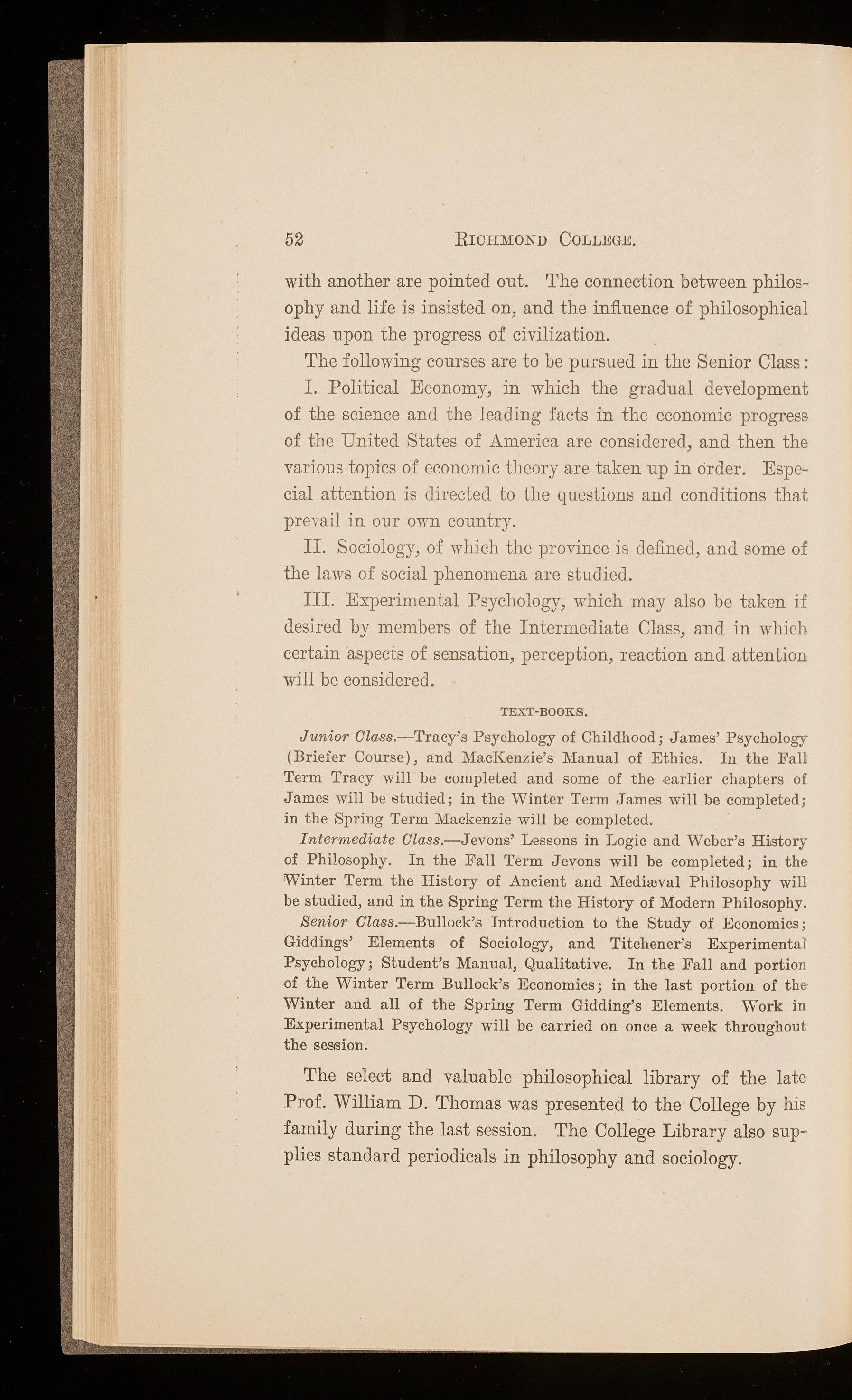
RICHMOND COLLEGE.
with another are pointed out. The connection between philosophy and life is insisted on, and the influence of philosophical ideas upon the progress of civilization.
The following courses are to be pursued in the Senior Class :
I. Political Economy, in which the gradual development of the science and the leading facts in the economic progress of the United States of America are considered, and then the various topics of economic theory are taken up in order. Especial attention is directed to the questions and conditions that pre vail in our own country.
IL Sociology, of which the province is defined, and some of the laws of social phenomena arc studied.
III. Experimental Psychology, which may also be taken if desired by members of the Intermediate Class, and in which certain aspects of sensation, perception, reaction and attention will be considered.
TEXT-BOOKS.
Junior Class.-Tracy's Psychology of Childhood; James' Psychology ( Brief.er Course), and MacKenzie's Manual of Ethics. In the Fall Term Tracy will be completed and some of the earlier chapters of James will be ,;;tudied; in the Winter Term James will be completed; in the Spring Term Mackenzie will be completed.
Intermediate Class.-Jevons' Lessons in Logic and Weber's History of Philosophy. In the Fall Term Jevons will be completed; in the Winter Term the History of Ancient and Medireval Philosophy will be studied, and in the Spring Term the History of Modern Philosophy.
Senior Class.-Bullock's Introduction to the Study of Economics; Giddings' Elements of Sociology, and Titchener's Experimental Psychology; Student's Manual, Qualitative. In the Fall and portion of the Winter Term Bullock's Economics; in the last portion of the Winter and all of the Spring Term Gidding's Elements. Work in Experimental Psychology will be carried on once a week throughout the session.
The select and valuable philosophical library of the late Prof. William D. Thomas was presented to the College by his family during the last session. The College Library also supplies standard periodicals in philosophy and sociology.
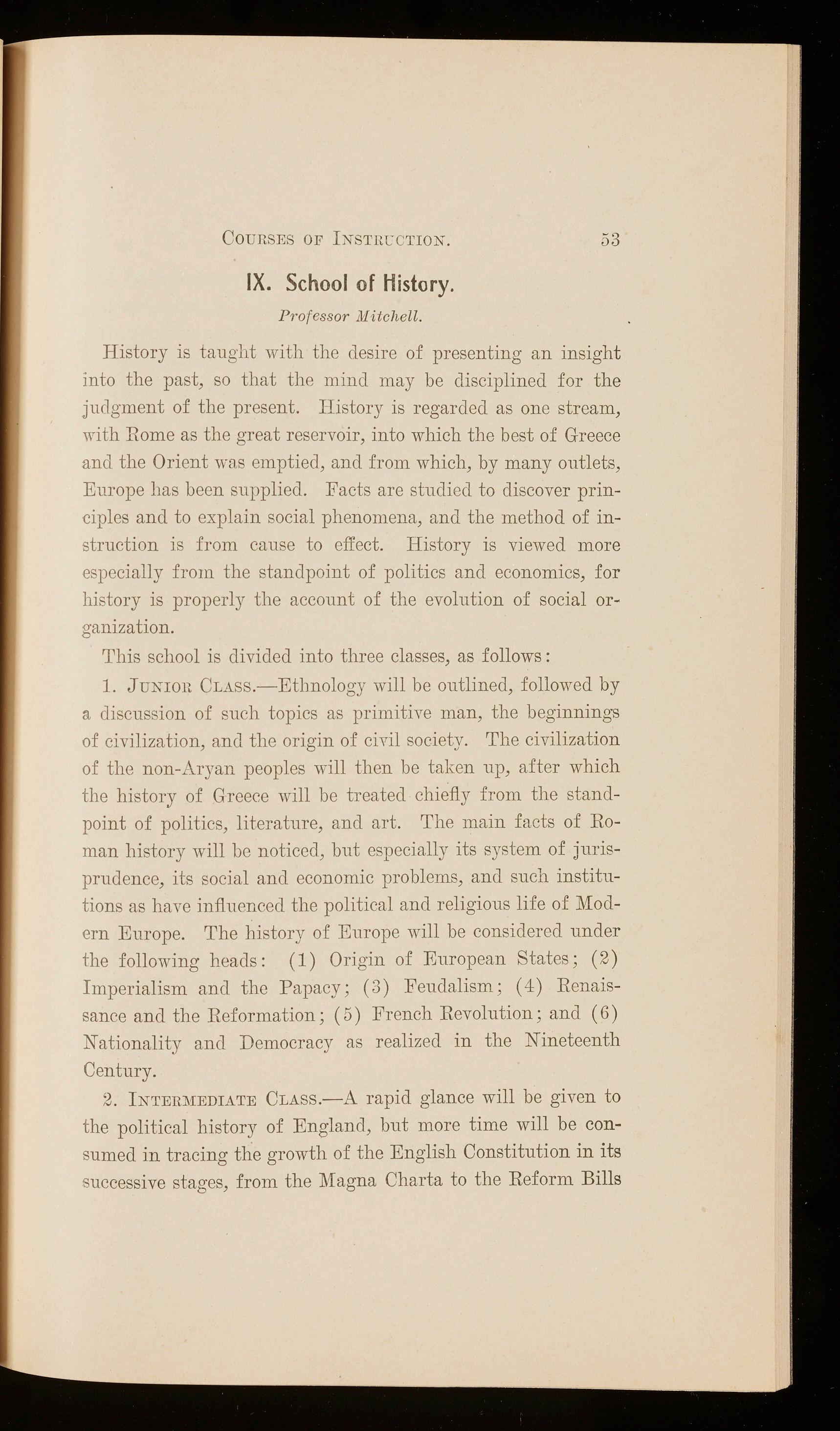
Professor Mitchell.
History is taught with the desire of presenting an insight into the past, so that the rnincl may be disciplined for the jmlgment of the present. History is regarded as one stream, with Rome as the great reservoir, into which the best of Greece and the Orient ,ras emptied, and from which, by many outlets, Europe has been supplied. Facts arc studied to discover principles and to explain social phenomena, and the method of instruction is from cause to effect. History is viewed more especially from the standpoint of politics and economics, for history is properly the account of the evolution of social organization .
'l'his school is divided into three classes, as follows:
1. JuKrou CLASS.-Etlmology will be outlined, followed by a discussion of such topics as primitive man, the beginnings of civilization, and the origin of civil society. The civilization of the non-,\ryan peoples will then be taken up, after which the history of Greece will be treated chiefly from the standpoint of politics, literature, and art. The main facts of Roman history will be noticed, but especially its system of jurisprudence, its social and economic problems, ancl such institutions as have influenc ed the political and religious life of Modern Europe. The history of Europe will be considered under the following heads: ( 1) Origin of European States; ( 2) Imperialism and the Papacy; ( 3) Feudalism; ( 4) Renaissance and the Reformation; ( 5) French Revolution; and ( 6) Nationality and Democracy as realized in the Nineteenth Century
2. INTEIUIEDIATE CLASs.-A rapid glance will be given to the political history of England, but more time will be consumed in tracing the growth of the English Constitution in its successive stages, from the J\'Iagna Charta to the Reform Bills
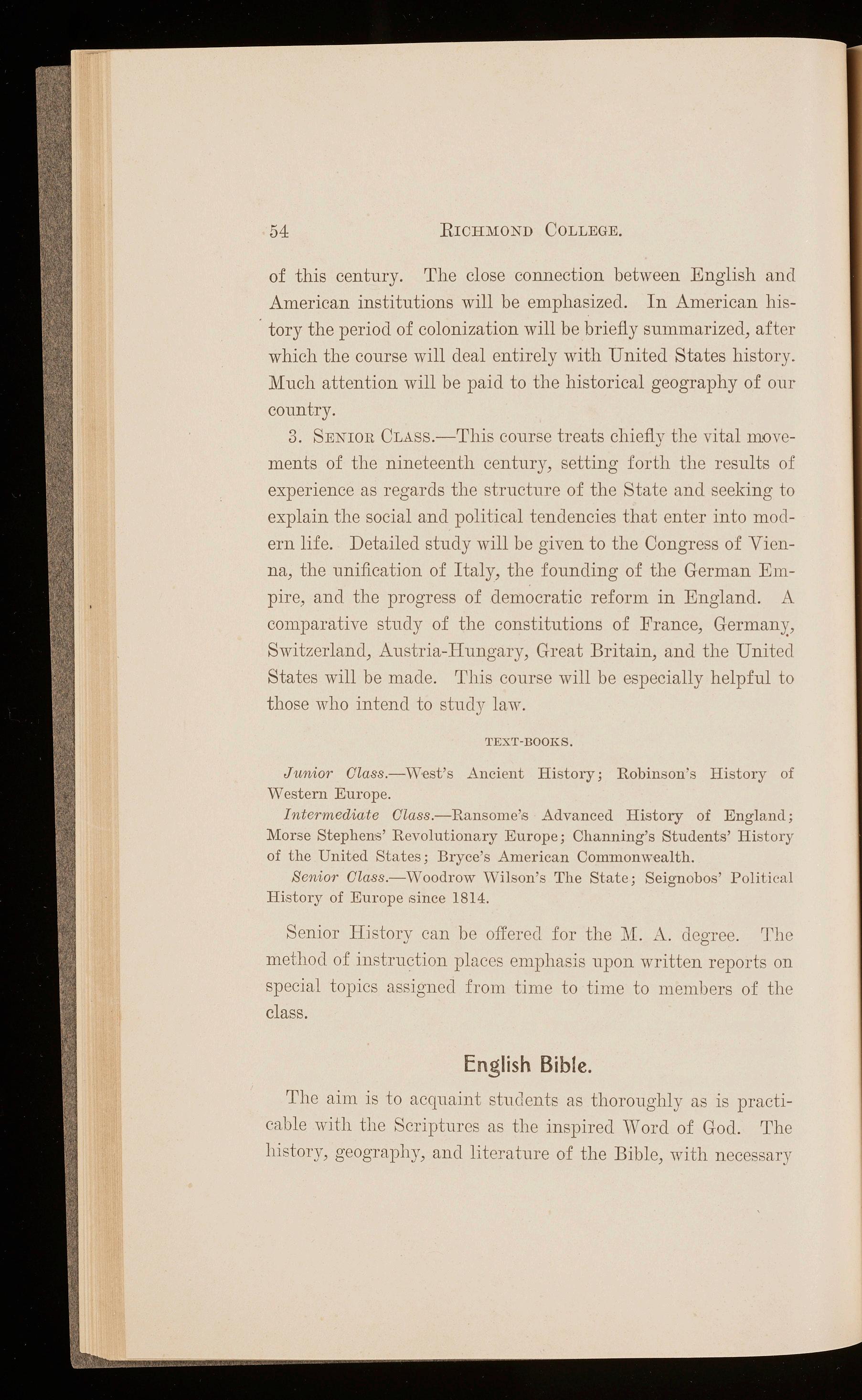
Rrcnj\ro::m COLLEGE.
of this century. The close connection between English and American institutions will be emphasized. In American hi story the period o.f colonization will be briefly summarized, after which the course will deal entirely with United States histor _y. Much attention will be paid to the historical geography of our country.
3. SENIORCLAss.-This course treats chiefly the vital moYements of the nineteenth century, setting forth the results of experience as regards the structure of the State and seeking to explain the social and political tendencies that enter into modern li.fe. Detailed study will be given to the Congress of Vienna, the unification of Italy, the founding o.f the German Empire, and the progress of democratic reform in England. A comparatiYe study of the constitutions of France, German}:, Switzerland, Austria-Hungary, Great Britain, and the United States will be made. This course will be especially helpful to those who intend to study law.
'!'EXT-BOOKS.
Junior Class.-\\"-cst's Ancient History; Robinson's History of \Vestern Europe.
Intermediate Class.-Ransomc' Advanced History of England; Morse Stephens' Revolutionary Europe; Channing's Students' Ilistory of ihe Uni!.€d States; Bryce's American Commonwealth.
Senior Class.-Woodrow \Vil son's The State; Seignobos' Political History of Europe since 1814.
Senior History can be o:fl'cred .for the 1I. ,\.. degree. The method of instruction places emphasis upon written reports on special topics assigned from time to time to members o.f the class.
The aim is to acquaint stuc1ents as thoroughly as is practirablc with the Scriptures as the inspired YiTord o.f God. The history, geography, and literature o.f the Bible, with necessary

exegesis, serve to throw light upon the sacred text and to discover the divine mind ancl spirit in thi s revelation. Intelligent knowledge, by syste matic effort, of th e Maker ancl Ruler of all, is essential to complete education, gi ves unity to the different depart m ent s of hum an learning, and is clue to Him "who liglitcth C\'cry man that cometh into the wor ld. " The courses are af1aptrcl to stm1cnts of all grades, with no r eference to any particular profession in Yic1L They are free to all matriculates of tl ic College There will be three courses of study , onein the Gospels, one in the Acts ancl Epi:=;tles,and one in "Old 'I'e:=;hrnwn t Characters." These c01u:=;es"·ill be cond u cted by Profc•"sors Gainc:-;, "\Yhit:;:ittand Harris in the onlcr named. Each cln,s:-;will rc('ifl' once a ,re ek at an hour to be announced at the organizai ion ol' the class. A credit of one poi n t will be al101,·eil011 each o[ the thTec course;;, proYirlecl, however, that no st u<lcnt sha ll be crctlitc<1 in any year with more than one point. ] J- if' fmthcr proviclecl tlmt a credit on Bible work shall not lie in clmlc cl in ihc fiftcrn reqnirecl poinh of the Eng1i:=;hPhilo:=;ophical grol1p.
Ca1·d1111.1·anangc,l rou r,-es in Physical Cnlhll"e arc offerrr1 free of co;;t to c Yery mnhicl1latc o[ the College. During 19021903 two classes " ·er e giyen daily exercises in the gymnasium ftn<l instn1ctecl in the 1)Tinciplcs of h ygiene. All students are mgcd to join one of the cla:=;ses. Each student, on ent ering a class, is gi,·cn a physical examination, in order that any la ck of rle,·elopment mav be not ed ancl the proper exer cise prescr ilw<l. ~\t the close of the session's work the measurements an• ngn in taken, ancl, on the basis of attenda n ce and physical i111prowmrnt comhinecl, certifica tes arc awanlccl. rr ot all(l col rl hai]1s arc proYic1eclin rooms adjo ining the /l',I 1rnrnFi11m,which arc kept open, ,rithout cha r ge, six clays in the 1rrek. In tl1c rll'cEsinµ·-room arc lockers, which are rented.

HIClDJ O~D COLLEGE.
to students at fifty cents each. The spacious campus affords ample orportunity for rccrcativ-c exercise. Grounds are laid out for foot-ball, base-ball, basket-ball, track athletics, tennis, and croquet. The College recognizes the intdligent care of the boll}' as essential to intellectual po,rcr, and encourages every beneficial form of physical exercise.
For many years series of popular lectures have been delivered in Richmond and elsewhere by professors in the College. In the spring of 1892 was given the first regular Extension course with syllabus, class-work, and guided reading. While the College has no organized department for carrying forward this important work, it will in the future continue to extend higher educational advantages to those unable to attend College classes.
The ThomasLectures.
Tl1csc Lcctmcs arc proridcd for by "The Thomas Museum Lecture Endo11mcnt'· of $10,000, donated by his family in memory of the late Prcsitlcnt of the corporation, James 'l'homas, Jr. 'L'hcy are dcliYcrecl annually by eminent men of our own and foreign countries on Science, Philrn:;ophy, Art, or Literature, and by special provision are open to the public without charge. The following distinguished scholars have delighted large :rnclicnccs and greatly stimulated literary and scientific research:
Charles~\.. Young, Ph. D., of Princeton; II. N cwell Martin, Pb. D., of Johns Hopkins UniYcrsity; William 'l' . Harris, Ll,. D., U. S. Commissioner of Bducation; President D. C. Gilman, of Johns Hopkins; Robert Y. 'I'yrrell, University of Dublin, Ireland; Horace IT. ]i'urncRs, Ph. D., LL. D., of Philadelphia; Profc~sor C'. T. Winchester, A.1\f., of Wesleyan
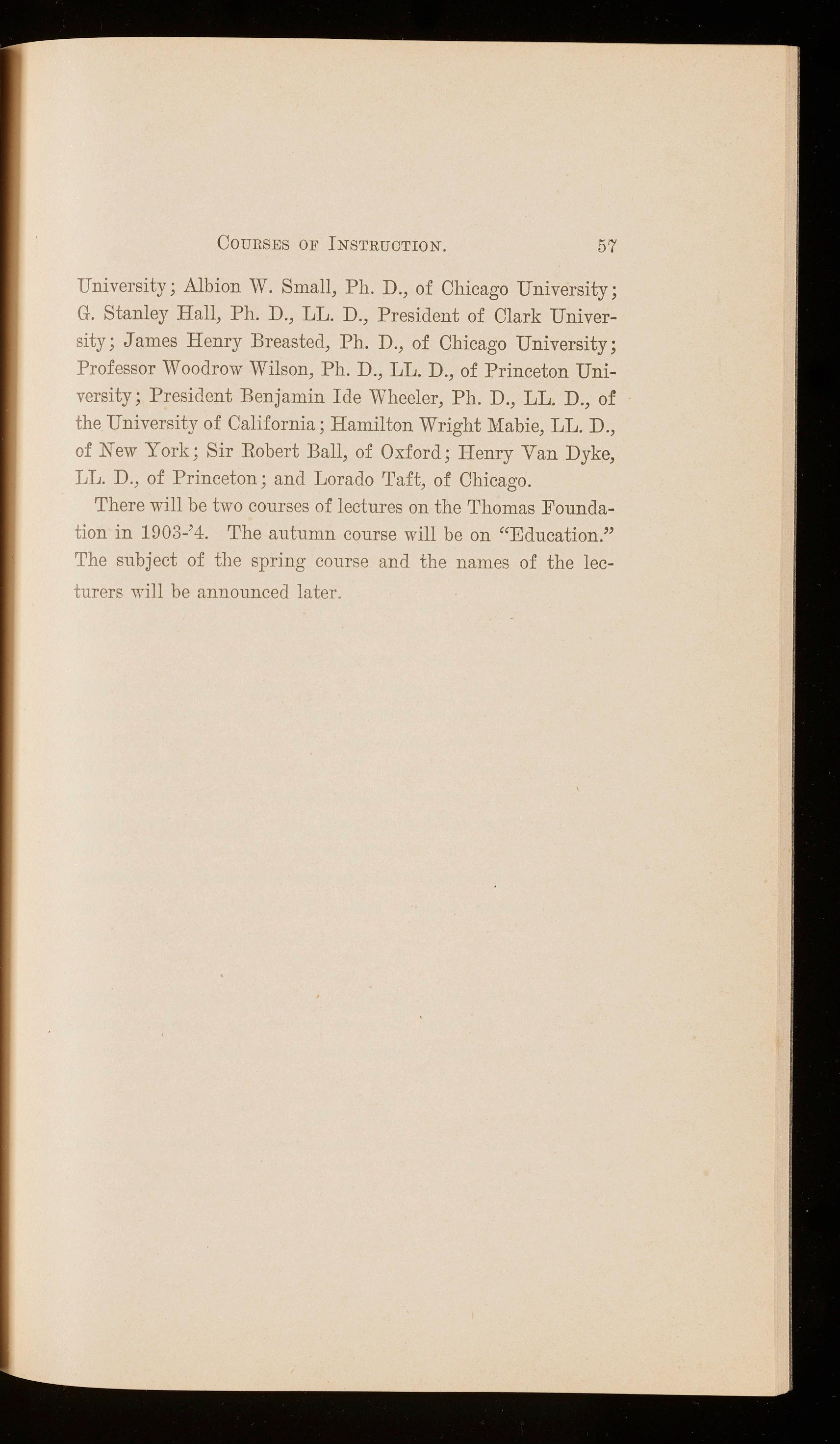
COURSES OF INSTRUCTION.
57 University; Albion W. Small, Ph. D., of Chicago University; G. Stanley Hall, Ph. D., LL. D., President of Clark University ; James Henry Breasted, Ph. D., of Chicago University; Professor Woodrow Wilson, Ph.D., LL. D., of Princeton University; President Benjamin Ide Wheeler, Ph. D., LL. D., of the University of California; Hamilton Wright Mabie, LL. D., of New York; Sir Robert Ball, of Oxford; Henry Van Dyke, LL. D., of Princeton; and Lorado Taft, of Chicago. There will be two courses of lectures on the Thomas Foundation in 1903-'4. The autumn course will be on "Education." The subject of the spring course and the names of the lecturers will be announced later.
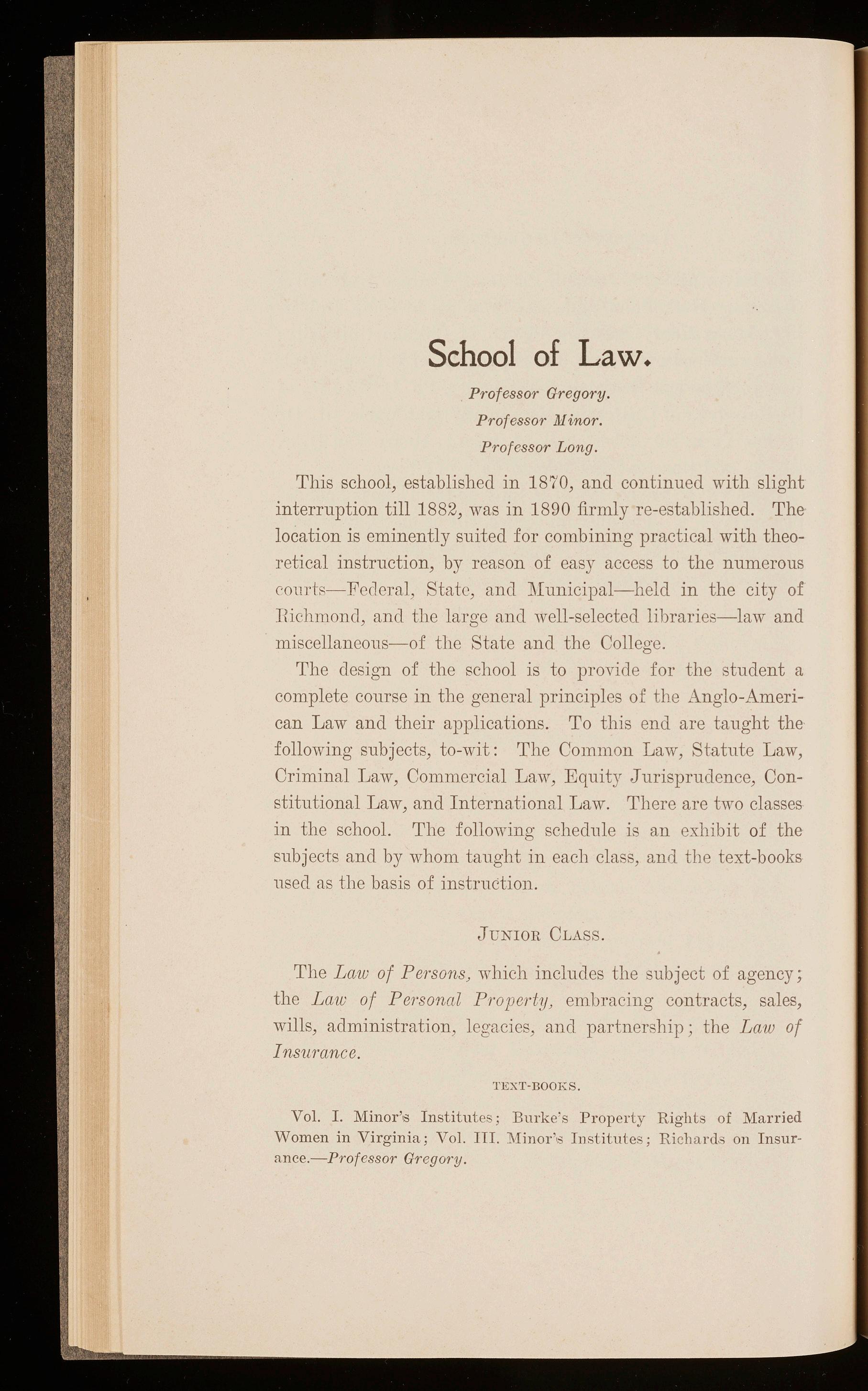
Professor aregory.
Professor Minor.
Professor Long.
This school, established in 1870, and continued with slight interruption till 1882, was in 1890 firmly re -established. The location is eminently suited for combining practical with theoretical instruction, by reason of easy access to the numerous co11rt,-Fcclcral, State, and 1\Iunicipal-held in the city of Hichmoncl, and the large and well -selected libraries-law and miscellaneous-of the State and the College.
The design of the school is to provide for the student a complete course in the general principles of the Anglo -American Law and their applications. To this end are taught the following subjects, to -wit: The Common Law, Statute Law, Criminal Law, Commercial Law, Equity Jurisprudence, Constitutional Law, and International Law. There are two classes in the school. The follo,Ying schedule is an exhibit of the subjects and by whom taught in each class, and the text -books used as the basis of instruction.
JUNIOR CLASS.
The Law of Persons, which includes the subject of agency; the Law of Personal Property, emhracing contracts, sales, wills, adm ini stration, legacies, and partnership; the Law of Insurance.
TE);T·BOOKS.
Vol. I. Minor's Institutes; Burke's Property Rights of Married Women in Virginia; Vol. III. Minor' ,;; Institutes; Ri cha rd.;; on lnsurance.-Professor Gregory.
ScnooL OF LAw.
Criminal Law and Proc edure.
TEXT-BOOK.
Minor's Synopsis of the Law of Crimes and Punishments.-Professor Minor.
Corporations, Constitutional, and International Law.
TEXT-BOOKS.
Vol. I. Minor's Institutes; Elliott on Private Corporations; Cooley's Principles of Constitutional Law; Davis' Outline of International Law.-Professor Long.
SENIOR CLASS.
The Law of Negotiable Instruments.
TEXT-BOOKS.
Selover's Negotiable Instrument Law; Virginia Negotiable Instrument A.ct.-Professor Long.
The Law of Evidence.

TEXT-BOOK.
Greenleaf on Evidence.-Professor Minor.
The Law of Pleading and Practice in Courts of Law in civil cases; the Law of Real Property; Eq1tily Jurispmdence; Pleading and Prctciice in Equity.
TEXT-BOQJ,:S.
Vols. IV. and II. Minor's Institutc,s; Adams' Equity.-Professor Gregory
For Refcr.enee: Blackstone's Commentarie.s; Barton's Law Practice; Barton's Chancery Practice; Lomax Digest of Real Property; Sands' Suit in Equity; Sams on Attachment; Va. Law Register; Graves' Title to Personal Property; Virginia Reports; Code of Virginia and Pollard's Supplement.
It is expected that text-books "\\·illbe taken up in the order-

RICHMOND COLLEGE.
· named above, but the Faculty reserve the right to rearrange subjects between classes, and to change text-books as may be -deemed beneficial to the school.
The instructJon is thorough and is given through textbooks and lectures, with daily oral examinations. The course is arranged for two sessions, and the student is advised to devote that time to it. But one, earnest and diligent, who has, ·before entering the school, become somewhat acquainted with the nomenclature of the law, may, by devoting the entire session of nine months to the study of the subjects embraced in the course, achieve the degree of Bachelor of Law in one session.
The Junior Class meets 4 :30 to 5 :30 P. M., and the Senior Class 5 :30 to 7 P. M. The hours for meeting the classes are -chosen with a view of enabling the student (who desires it) to attend all the lectures in the course; also, to give an opportunity to law students wishing to take classes in the Academic Department of the College and ( vice versa) to do so; ltnd, also, -to suit the convenience of young men in business who can only give a part of the day to the study of law.
Certificates of Proficiency are conferred upon those who attain a s11fficientknowledge of Criminal Law, Evidence, Negotiable Instruments, Corporation Law, Insurance Law, or of Constitutional and International Law (the two last being required for one certificate) to entitle them thereto; and, when conferred, dispense with further study of those subjects to take the degree of Bachelor of Law. The lectures upon all ,other subjects than those for which Certificates of Proficiency have been conferred and must be attended, and the examinations ( oral and written) thereon stood during the session the degree of B. L. is applied for.
To acquaint the student with the details of practice in the -drawing of deeds, wills, and other instruments; the institution and maturing of suits at law and in equity; the prepara-
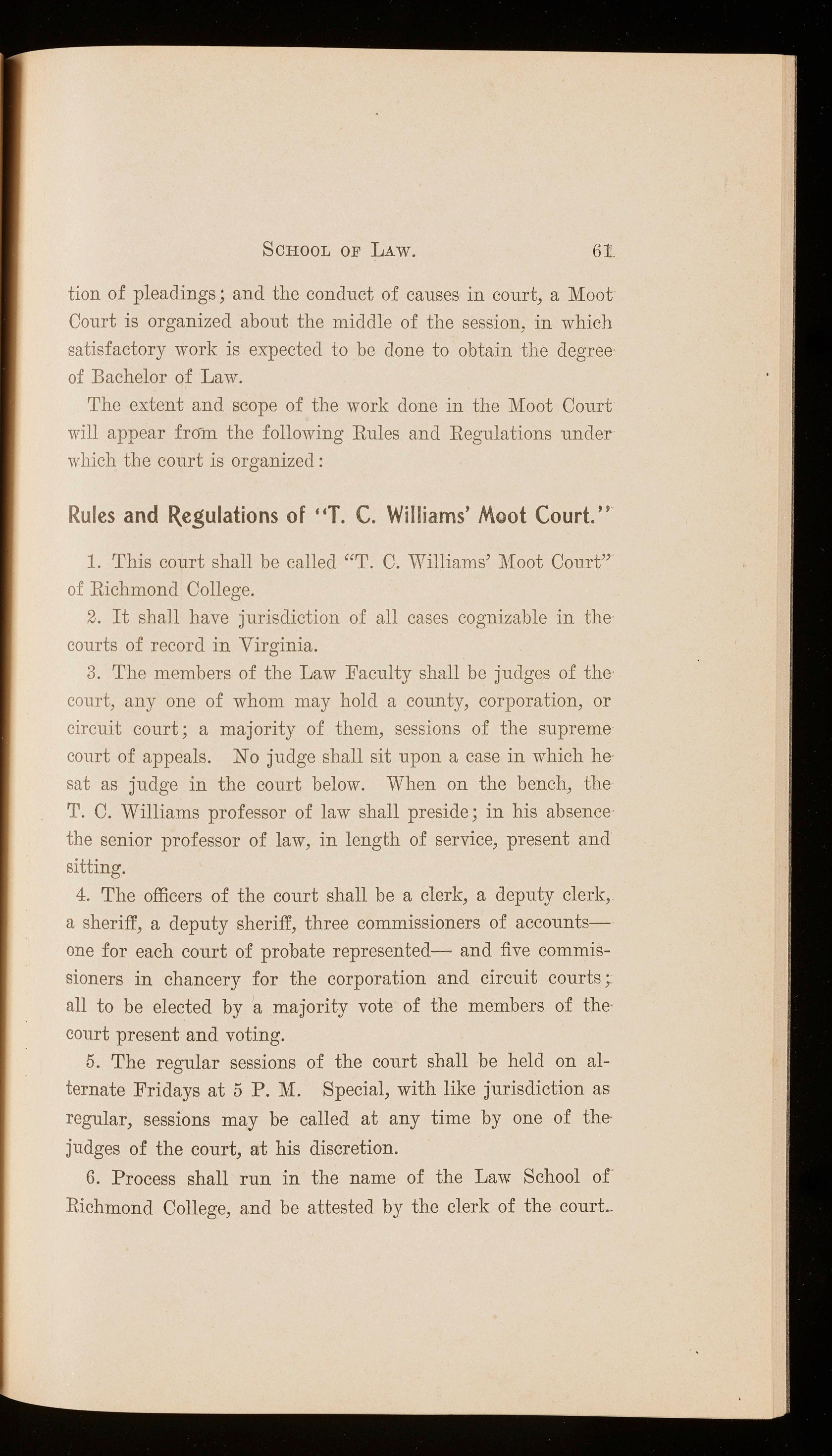
SCHOOL OF LAW. 61.
tion of pleadings; and the conduct of causes in court, a Moot Court is organized about the middle of the session, in which satisfac tory work is expected to be done to obtain the degree · of Bachelor of Law.
The extent and scope of the work clone in the Moot Court will appear from the following Rules and Regulations under which the court is organized:
1. This court shall be called "T. C. Williams' Moot Court" of Richmond College.
2. It sha ll have jurisdic tion of all cases cognizable in the courts of record in Virginia.
3. The members of the Law Faculty shall be judges of the court, any one of whom may hold a county, corporation, or circuit court; a majority of them, sessions of the supreme court of appeals. No judge shall sit upon a case in which he sat as judge in the court below. When on the bench, the T. C. Williams professor of law shall preside; in his absence the senior professor of law, in length of service, present and sitti ng.
.
4. The officers of the court shall be a clerk, a deputy clerk, a sheriff, a deputy sheriff, three commissioners of accountsone for each court of probate represented- and five commissioners in chancery for the corporation and circuit courts; all to be elected by a majority vote of the members of the · court present and voting.
5. The regular sessions of the court shall be held on alternate Fridays at 5 P. M. Special, with like jurisdiction as regular, sessions may be called at any time by one of the· judges of the court, at his discretion.
6. Process shall run in the name of the Law School of Richmond College, and be attested by the clerk of the court

RICIL\-IOND COLLEGE.
Service may be upon defendant's attorney, but return shall state it was made upon the defendant himself.
7. EYcry Thursday, from 4 P. JU. to 5 P. M., shall be rule-day. All pleadings must be filed in duplicate, the original to remain in the files of the court, the duplicate to be banded to the attorney of adverse party, on his request.
8. J uclgments, except those in the clerk's office, to be put in form, orders, and decrees drawn by counsel, ancl, whrn directed to be entered, filed with the clerk.
9. The proceedings of this court, except so far as modified by its rules, will conform to those of the several comts it may represent, and to the statutes of Virginia in relati on -thereto.
10. In counting time for this court, in re spect to service of notice and confirmation of accounts, one day shall be considered a week, and a week a month.
11. Tl1e proceeding s of every court shall be entered in a book and read in open court by tl1c clerk. After being corrcctccl, where it is necessary, the record shall be signed b? the presiaing juclge.
12. The roll of members shall be called by the clerk immcdiatcl~- after the opening of each session of tl1c court: the names of absentees noted, and a fine of 25 cents entered by the clerk against each absentee.
13. For good cause, the presiding juclgc may remit a fine: if neither paid nor remitted in two weeks, it may be recoYered, by motion, in this court on two clays' notice-the proceedings to be in the name of the Law School of Richmon rl College. Moneys collected from fines to be applied to expenses of this court.
14. Without leave of court, no motion for judgment shall be made under Section 3211 of Code of 1887, as amended by chapter 110 of Acts of 1895-'96; nor shall any suit be dismissed without like leave.
SCHOOL 0~' LAW. G., 0
15. Each session of the court sha ll be opened by the sheriff with the following proclamation:
''O'Y ez ! O'Y cz l O'Y ez !
"Sile nce is comma nd ed, on pain of fine, while the 'T. C. Williams' J'lfoot Court' is in session. All persons h avi ng motions to make , pleas to enter, suits to prosecute, or other bu siness before this eonrt, will come forward ancl they sh all be heard.
"l\fay all persons present, during the session of the court, deport themselves in a decorous and gentlemanly manner."
Fees in School of Law.
Matriculation

$2 0 00
Tuition in Junior Class ....... : . . 40 00
Tu ition in Senior Class . .
Tuition in both cla ,sscs, when taken together .. Refundable cont ingent
00
75 00 2 50
The matriculation fee and haH of the tuition fee arc payable at entrance . The second half of tuition fee is payabl e in Febnrnr~· at beginning of spring term. No honors are annolmccd until all fees arc paid in full.
Students who have won as man y as four Certificates in the Junior Class pay the fees of the Senior Cla ss only. All others who wish to take the Senior Class must pay sevcntyfiye cJollars tuition.
Most students enter for the Junior Class. Their fees for the ent ire session, therefore, amount to $G2.50, o.Ewhich $2.50 is refundable July 1st . The matriculation fee admits a student to all College privileges, such as use of library, gymnasium, bath, etc. If law students desire to reside on the College grounds, they may engage rooms and table board on equal terms with academic students. Rates are fully stated further on in this cata logue und er the head of "Expenses ."
The cost of all text -books needed for the en tire Law course is about $75. (

RICHMOND COLLEGE
For excellent work in the Law Schoo l valuable prizes, consisting of sets of law books, were awarded in J u ne , 1903, as follows:
Senior Class.-First Prize-J. C. Daniel, Richmond.
Second Prize-S . H . Sutherland, Dickenson county . Third Prize-Isadore Schapiro, Richmond.
Junior Class.-First Prize-W. A. Leake, Richmond.
Second Prize-S. C. DeCamp, Richmond. Third Prize-J. J. Blake, Richmond.
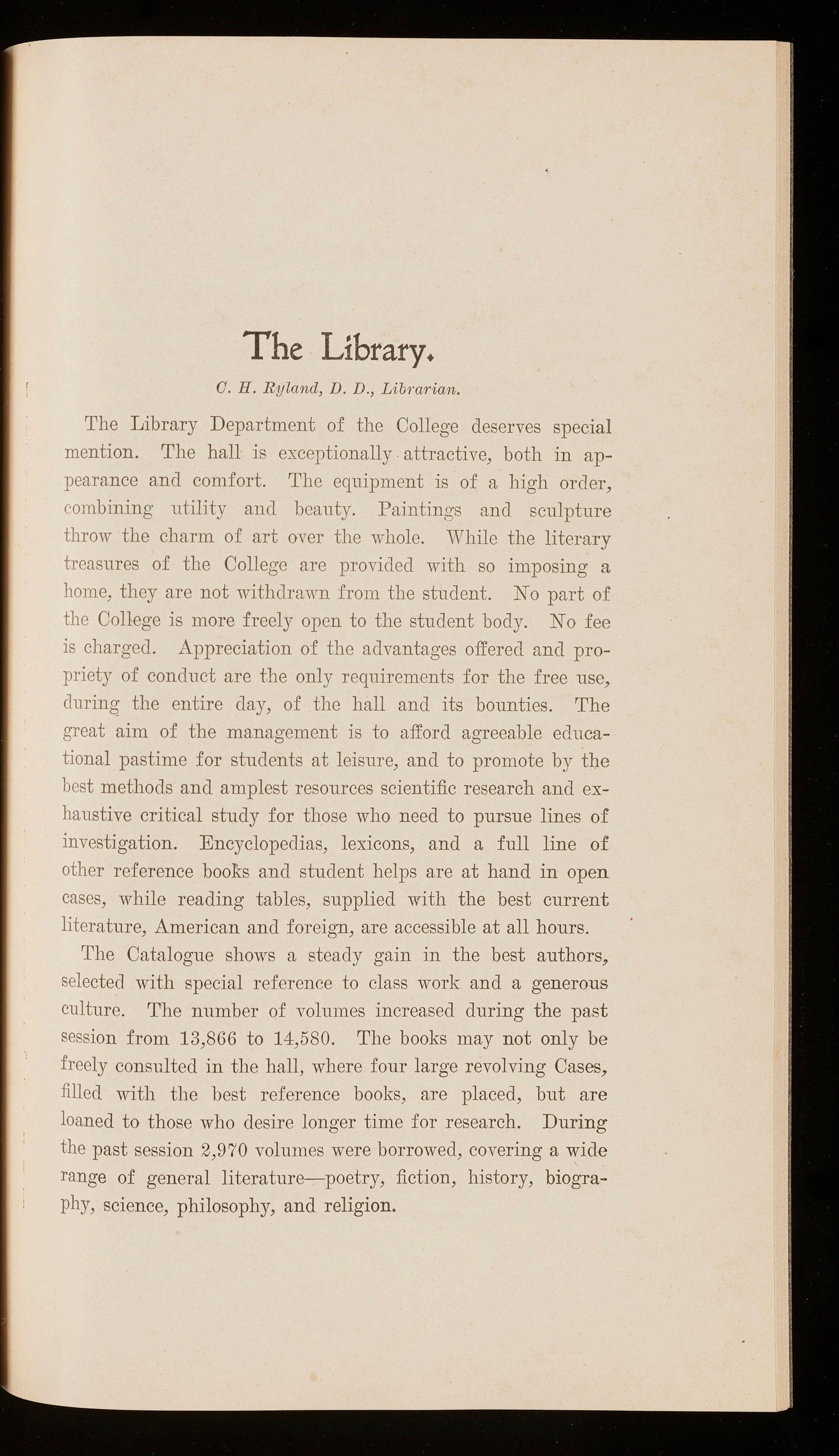
C. H. Ryland, D. D., Librarian.
The Library Departm ent of the College deserves special mention. The hall is exceptionally attractive, both in appearance and comfort . The equipment is of a high order, combining utility ancl beauty. Paintings ancl sculpture throw the charm of art over the whole. 'iVhilc the literary treasures of the College are provided with so imposing a home, they arc not withdrawn from the student. No part of the College is more freely open to the student body. No fee is charged. Appreciation of the advantages offered and propriety of conduct are the only requirements for the free use, during the entire day, of the hall and its bounties. The great aim of the management is to afford agreeable educationa l pastime for students at leisure, and to promote by the best methods and amplest resources scientific research and exhaustive critical study for those who need to pursue lines of investigation. Encyclopedias, lexicons, and a full line of other reference books and st udent helps are at hand in open cases, while reading tables, supplied with the best current literature, American and foreign, are accessible at all hours.
The Catalogue shows a steady gain in the best authors, selected with special reference to class work and a generous cultu re. The number of volumes increased during the past session from 13,866 to 14,580. The books may not only be freely consulted in the hall, where four large revolving Cases, filled with the best reference books, are placed, but are loaned to those who desire longer time for research. During the past session 2,970 volumes were borrowed, covering a wide range of general literature-poetry, fiction, history, biography, science, philosophy, and religion.

RICHMOND COLLEGE.
The largest individual gift of books during the past year <;ame from Mrs. William D. Thomas, of Richmond, in mem,ory of her husband, the· late Professor of the School of Philosophy, who added 100 volumes on Philosophical subjects.
A special feature in the hall is the alcove devoted to The Heaton Law Library, founded by the late Mrs. Harriet M. Purcell, at a cost of $3,000, in honor of h er deceased brother, Ron. Henry Heaton, of Loucloun county. On this foundation of the most approved and valuable works on l aw, the College is building by year ly accessions of valuab l e Reports from the General and State Governments, and all necessary Current Magazines. The students in the Law Department are given access to this Law Library, and u se it very freely.
A special Reading-Room for the Young J\Ien's Christian Association has been fitted up. Here is the :Missionar y Library-the religious periodicals and appliances for the thor•ough study of the Sunday-school lesson . On Sunday afternoon this special reading-room may be the gathering place of all students who can be induced to read, for ple asure or profit, the current religious literature of the country.
Bible study finds many accessories in the Librar y . A long l ine of the best commentaries on the Holy Scriptures are within reach, and the critical and experimental study of God's Word is constantly encouraged.
The beautiful James Thomas, Jr , Museum and Art Hall has been dedicated to its specific use. Into it have already been gathered casts of celebrated statuary, paintings, and many valuable curios and objects of ethnographical int erest

67 from all lands. Recently there were added, by gifts from the family, the life -size busts in white marble of Mr. James Thomas, after whom the Hall is named, and of Hon. ,J. L. M. Curry, so long Professor and Trustee and the great patron of education. There are also life-size casts of Venus de Milo, Apollo Belvedere, and the Borghese \Varrior; also busts of Homer, Vergil, Dante, Milton, Shakespeare, Tennyson, Napoleon, Luther, Columbus, Julius Cmsar, Sophocles, Sappho, and Clytie. Other additions have been the Greek relief of "V em1s Persuading Helen to follow Paris," Thorwaldsen's "Apollo and the l\Iuses," and a large oil painting, "Paul and Virginia," by Mrs. Emilie Lasar, of Portland, Me. By a su itable arrangement of cases, there is an attractive display of rare curios~ties from our own and foreign lands, the gifts of tnistees, alumni, and generous friends. Rev. Hugh P. McCormick, of Porto Rico, and Mrs. 'iV. E. Hatcher, of Richmond, have filled cases that are of exceptional value. A valuable collection has also been received from Rev. R. E. Chambers , of China, and from Rev. W. McS. Buchanan, of Japa n. Gifts of statuary, paintjngs, photographs, and objects of artistic or historical interest are gladly received. The Librarian is curator, and contributions should be forwar ded to him.

Two literary societies, known as the Mu SIGMA.RHO and PHILOLOGI.A.N,are maintained by the students, and are recognized as agencies of great value in scholastic training. They are provided with elegant halls, where they hold weekly meetings for declamation, debate, and other literary exercises. Besides the joint oratorical contest held in the spring, each society arranges for at least one public debate during the session. The two societies unite in publishing the Messenger, a monthly magazine of about seventy-five pages. A generous rivalry is maintained between the two organizations by the joint offer of an orator's medal and a writer's medal, and among the individual members by the offer in each society of a medal for improvement in debate and for the best debater. The medalists for 190.2-l!J03 were as follows:
Joint Orator's.-W. P. Powell, Philologian.
Joint Writer's.-E P. Buxton, Mu Sigma Rho. Mu SIGMA RHo.
Improvement-D. S. Freeman.
Best Debater's.-J. B. Lightfoot, Jr.
PHILOLOGIA.N.
Improvement.-0. D. Wade.
Best Debater's.-J. L. Powell, Jr.
The literary societies hold membership in the Virginia State Intercollegiate Oratorical Association, which is composed of the societies of the leading colleges and universities of Virginia . Representatives from the two Societies won from the

literary societies of ,Vake Forest College la st Thanksgiving the silver cup offered by the Raleigh Cham ber of Commerce for excellence in debate.
During the session of 1895-'96 the Richmond College Law Association was organized by students of the School of Law for the discussion of literary and legal questions. Meetings are held once a week.
The students maintain an actiYo Young I\Ien's Christia n Association, whoso object is to promote the spiritual and mora l welfare of the College and to do religious work in the city. The Association has charge of all prayer -meetings in College, ancl its members conduct services or teach Bible classes at the Cit_vHospital, tho Confederate Soldiers' Horne, the Locomotive Works, tho Home for Incurables, and at several mission stations in the suburbs. A pleasant feature of the work in College is the arrangement made for meeting new students upon their arriYal, and showing them many needful courtesies. Connected with the Association is a flourishing 1I rssroNARY SocrnTY, which meets twice a week for study of the habits, customs, prevailing religions, and geography of foreign countries. The Society owns an independent library.
Outdoor sports are fostered and encouraged at Ri chmond College. Details of management are entrusted to the Athletic Association, composed of students and professors, but the Pres• ident and Faculty exercise general control. The annual FieldDay contests are admirable incentives to physical culture. The following regulati ons governing Athletics have been adopted by the Facult y :
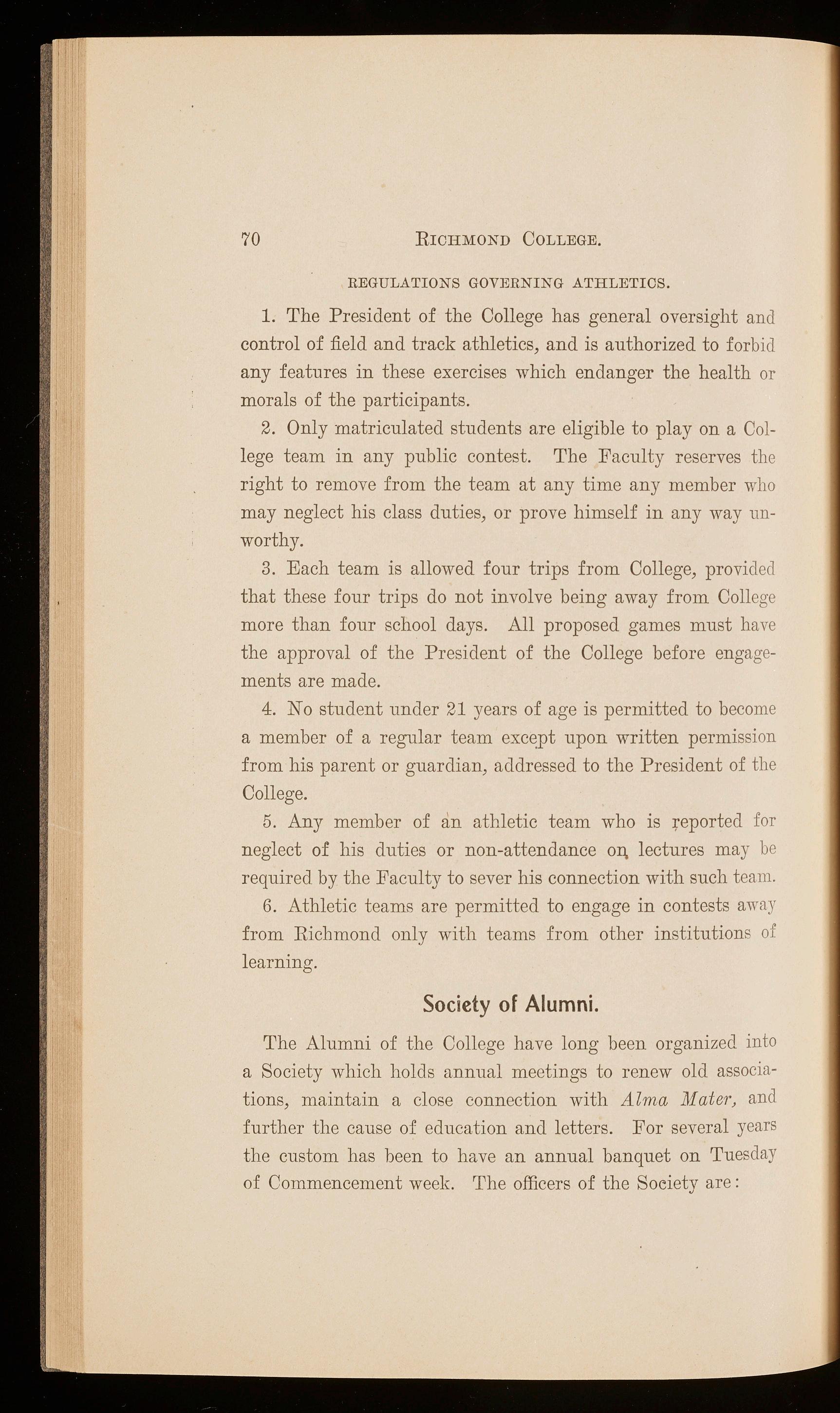
RICHMOND COLLEGE.
1. The President of the College has general oversight and control of field and track athletics, and is authorized to forb id any features in these exercises which endanger the health or morals of the participants.
2. Only matriculated students are eligible to play on a College team in any public contest. The Faculty reserves t he right to remove from the team at any time any member who may neglect his class duties, or prove himself in any way unworthy.
3. Each team is allowed four trips from College, pro vi ded that these four trips do not involve being away from College more than four school days. All proposed games must h ave the approval of the Pre sident of the College before engagements are made.
4. No student under 21 years of age is permitted to become a member of a regular team exc~pt upon written permi ssion from his parent or guardian, addressed to the President of the College.
5. Any member of an athletic team who is :reported for neglect of his duties or non-attendance on, lectures ma y be required by the Faculty to sever his connection with such t eam.
6. Athletic teams are permitted to engage in contests away from Richmond only with teams from other institution s of learning.
The Alumni of the College have long been organized int o a Society which holds annual meetings to renew old associations, maintain a close connection with Alma Mater , and further the cause of education and letters For several years the custom has been to have an annual banquet on Tuesd ay of Commencement week. The officers of the Society are :

J. TAYLORELLYSON, Esq., Richmond, Va ................ President.
REV. D. K. W ALTIIALL,Ph.D., Chestnut Hill, Va., First Vice-President.
REV. JA]l[ES H. FRANKLIN, Cripple Creek, Col., Second Vice-President.
REV A. J. RAMSEY, Berkley, Va ............... Third Vice-President.
PROF W. A. HARRIS, Ph. D., Richmond, Va Secretary.
MR. C. 1\1. GRAVES,Richmond, Va .. ............ . . .. . .... Treasurer.
Degree men are members of the Society without election, and all former students are eligible for election. The initiation fee of $3 has been abolisl1cd, and an annual fee of $1 substitu ted therefor.
In 1\Iay, 1898, there was organized in Louisville a Chaptel:'" of the General 8ocicty of Alumni, which is known as the "Kentucky Association of Richmond College Alumni." The Kentncky Association hold s annual meetings in May. The present officers are: Dr. S. E. Woody, Louisville, president; . Professor \V. 0. Carver,. Louisville, secreta Ty and treasurer.
In February, 1899, the alumni resident in Norfolk, Va., and Yicinity organized a "Norfolk Chapter of Richmond CollegeAlumni." The chapter holds annual meetings in February. 'l'hc present officers arc: Rev. J. J. Ta ylor, D. D., Norfolk, president; C. "\Y. Coleman, Esq., Churc hland, secretary and treasu rer.
In April, 1908 , th ere was organized in Newport News, Va., a "Peni nsular Chapter of Richmoncl College Alumni." The Chapte r will hold anmrnl meetings. 'l'he officers are George A. Schmelz, E sq., N cwport News, president; Professor E. S. Ligon, Newport N cws, secretary and treasurer.
'I'hc Pre sident of the College will be glad to correspond ,rith Alumni who desire to form local a~sociations.

Instruction is conveyed by the use o.f approved text -books, supplemented by oral explanations and addit ion s, in some cases by more formal lectures, ancl in most of the classes by exercises to be written and carcfoly corrected. In cycry class the student is questioned on the assigned portion of the text or the previous lecture. An account of the value of these recitations and exercises is kept by the Professor, and the average standing for each month is calculated and cntcrcd of record for reference in determining his right to any of the honors of the institution.
To the parent or guardian is sent, monthly, a transcript of this rccorrl of class-standing, ,rith a statement of the absences of the student from his classes, and such other informati on as may be clecmcc1important. By the prompt and. judicious attention of those to whom they arc acldresRecl,these reports may be made of great Yahie in promoting imp r ovement and snstaining a jl1st discipline.
Besides the daily qncstjoning, t licrc are held in every class three general examinations conducted in writing. These examinations a r e held at the close of the fall, winter and spring terms. All examinatjons are limited. to three hours. Recitations arc suspended during the examination period.
The answers furnished by each student to the examination questions are carefully valued, and this valuation is equitably combined with the average of his class standing. If the mark
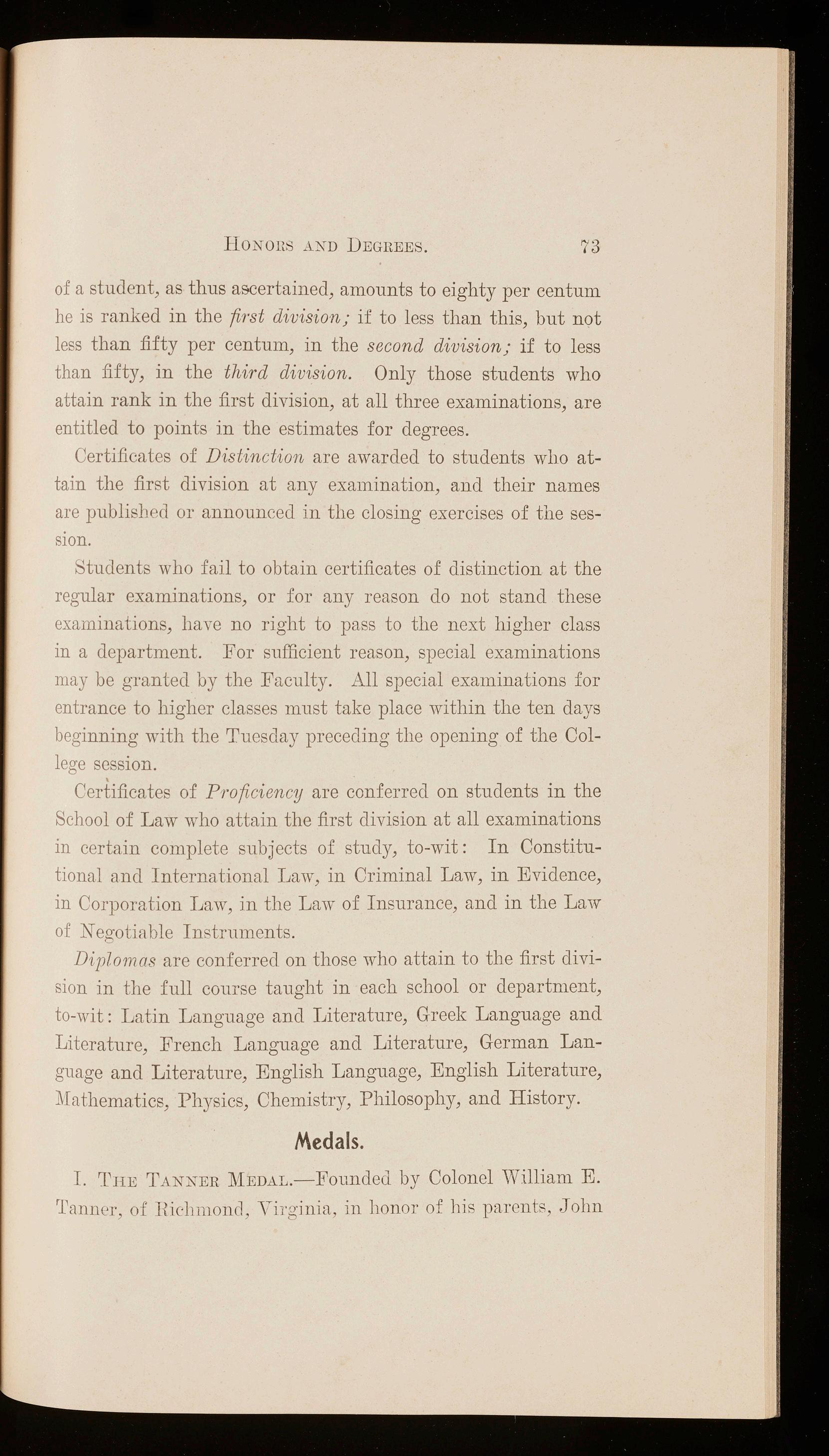
IloKon:3 _,xn DEG1mEs. 73
of a student, as thus aocertained, amounts to eighty per centum he is ranked in the first division; if to less than this, but not less than fifty per centum, in the second division; if to less than fifty, in the third division. Only those students who attain rank in the first division, at all three examinations, are entitled to points in the estimates for degrees.
Certificates of Distinction are awarded to students who attain the first division at any examination, and their names are published or announced in the closing exercises of the session.
Students who fail to obtain certificates 0£ distinction at the regular examinations, or for any reason do not stand these examinations, haYC no right to pass to the next higher class in a department For sufficient reason, special examinations may be granted by the Faculty. All special examinations for entrance to higher classes must take place within the ten days beginning with the Tuesday preceding the opening of the College session .
Certificates of Proficiency are conferred on students in the School of Law who attain the first division at all examinations in certain complete subjects 0£ study, to-wit: In Constitutional and International Law, in Criminal Law, in Evidence, in Corporation Law, in the La"- of Insurance, and in the Law of Negotiable Inf'truments.
Diplomas are conferred on those who attain to the first division in the full course taught in each school or department, to-wit: Latin Language and Literature, Greek Language and Literature, French Language and Literature, German Language and Literature, English Language, English Literature, Jfathematics, Physics, Chemistry, Philosophy, and History. Medals.
I. 'l'irn TANKERMEDAL.-Founclctl by Colonel William E. 'l'annl'r, of Hic-hmoml, Yirginia, in honor of his parent,:, .John

RICHMONDCOLLEGE.
F and Harriet L. Tanner - is given to the rnost proficient graduate in the School of Greek.
II. THE JAMESD. CRUMPPRIZE.-Founded by the gentleman whose name it bears-is a prize of twenty dollars, in gold, given for excellence in the Intermediate Class of Mathematic s. It is awarded in part on the regular class work and in part on extra work.
The Professional Degree of Bachelor of Law (B. L.), and the Academic Degrees of Bachelor of Science ( B. S.), Bachelor of Arts (B. A.), and UaRter of Arts (M:. A.), arc confcncd b:r the TnIRtccs on recommendation from the Faculty. They cannot be given either in course or as honorary degrees. FoR BACIJF.LOROF LAW is required graduation on all the subjects incluclcd in the Law , chool, with some profiriency in general echication.
All subjects taught in the Academic Schools of the College are now classified under three groups, viz. : (I.), a Foreign Language Group; (II.), a Scientific Group; and (III.), an Rnglish-Philosophical Group. Students who attain the first division (i. e., make eighty per cent.) on the examinations in any claFs, are entitled to the points set after that class in the groups printed below:
HONORS
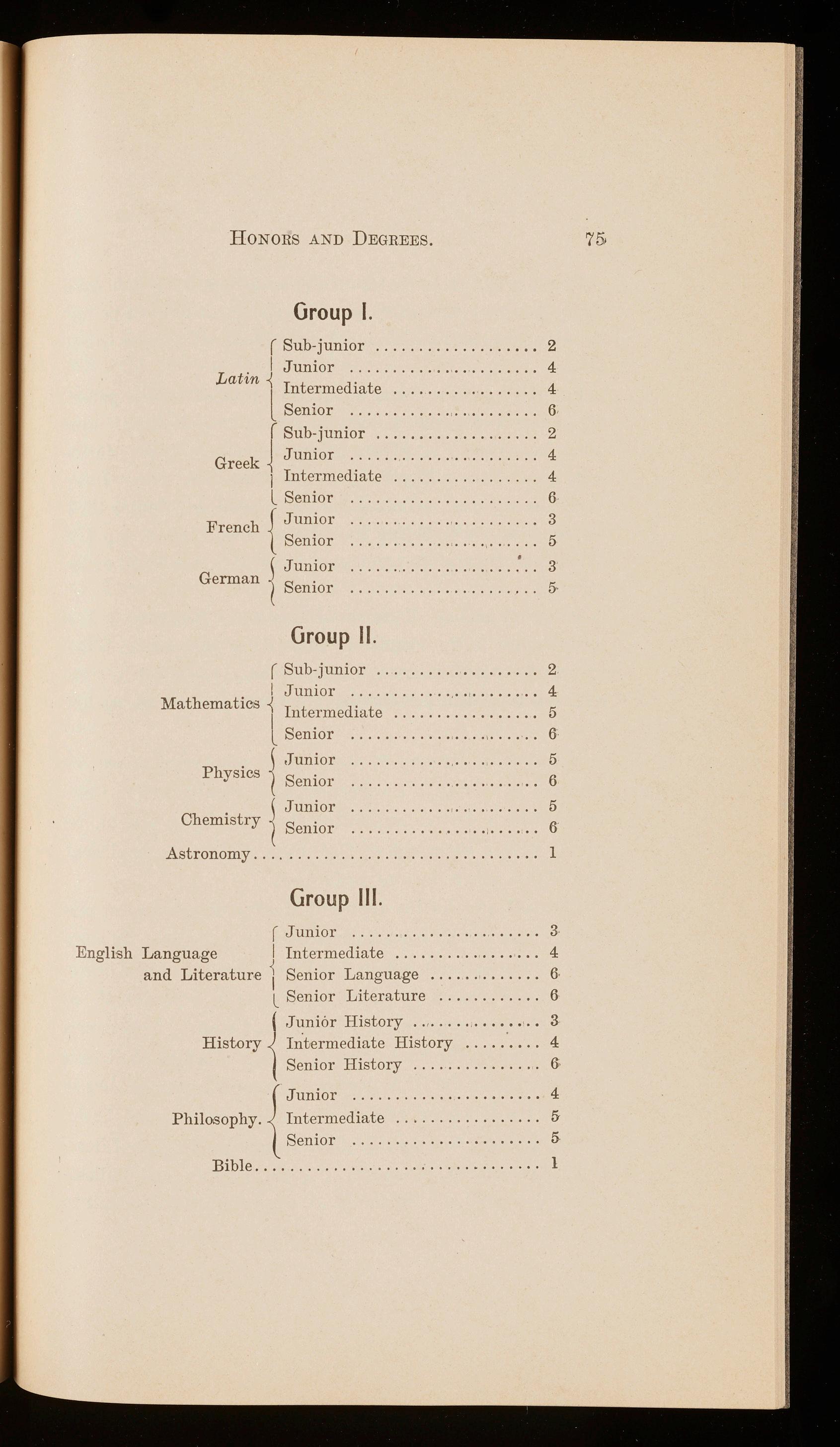
Eng lish
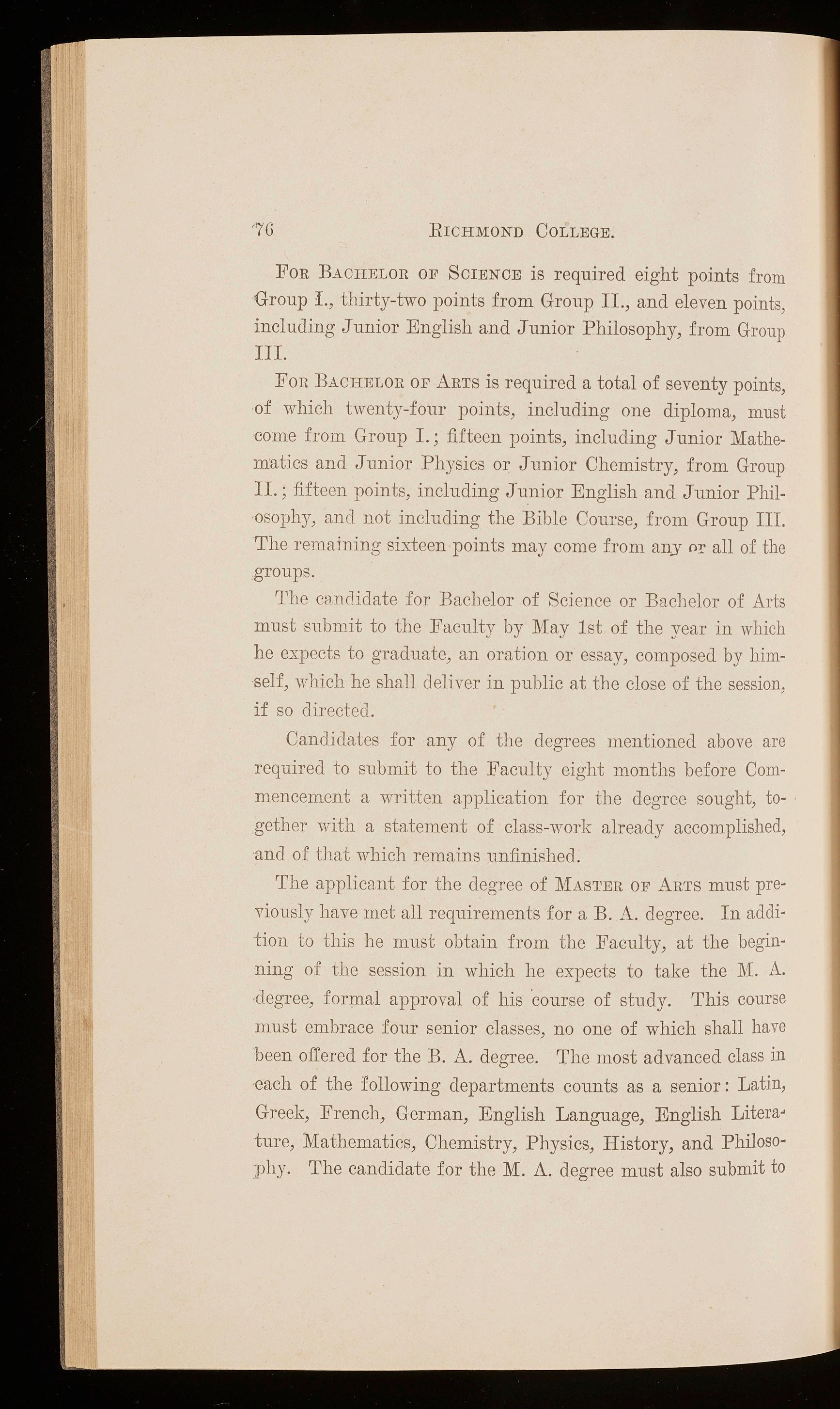
'7G HICHlliONDCOLLEGE.
FoR BACHELOROF SCIENCEis required eight points from Group I., thirty-two points from Group II., and eleven points, including Junior English and Junior Philosophy, from Group III.
Fon BACHELOROFARTSis required a total of seventy points, of which twenty-four points, including one diploma, must come from Group I.; fifteen points, including Junior Mathematics and Junior Physics or Junior Chemistry, from Group II.; fifteen points, including Junior English and Junior Philosophy, ancl not including the Bible Course, from Group III. The remaining sixteen points may come from any n:r all of the groups.
The r:rnrlidatc for Bachelor of Science or Bachelor of Arts must s11bmit to the Facult:v by JHay 1st of the year in which he expects to graduate, an oration or essay, composed by himself, which he shall deliver in public at the close of the session, if so aircctccl.
Cancliclatcs for any of the degrees mentioned above are required to submit to the Faculty eight months before Commencement a written application for the degree sought, together with a statement of class-work already accomplished, and of that which remains unfinished.
'l'he applicant for the degree of UASTEROF ARTSmust previously hm-e met all requirements for a B. A. degree. In addition to this he must obtain from the Faculty, at the beginning of the session in which he expects to take the :i\I. A. degree, formal approval of his ·course of study. This course must embrace four senior classes, no one of which shall have been offered for the B. A. degree. The most advanced class in each of the following departments counts as a senior: Latin, Greek, French, German, English Language, English Litera• turc, Mathematics, Chemistry, Physics, History, and Philosophy. The candidate for the M. A. degree must also submit to
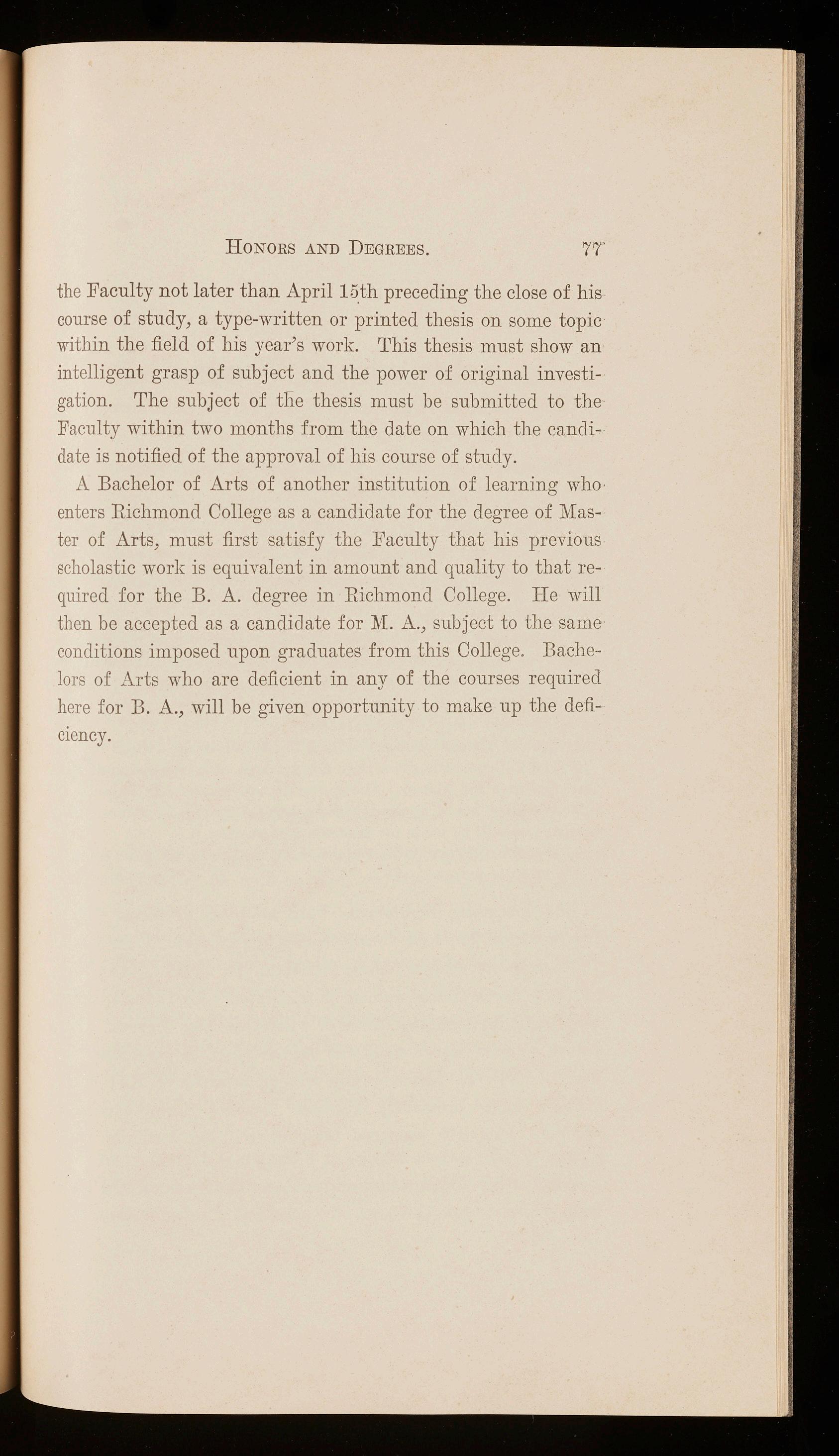
HONORS AND DEGREES.
the Faculty not l ater than April 15_th preceding the close 0£ his course 0£ study, a type-written or printed thesis on some topic within the :field 0£ his year's work. 'l'his the sis must show an intelligent grasp 0£ subject and the power 0£ original investigation. The subject 0£ the thesis must be submitted to the Faculty within two months from the date on which the candidate is notified 0£ the approval 0£ his course 0£ study .
A Bachelor 0£ Arts 0£ another in stitution 0£ learning who enters Richmond College as a candidate £or the degree 0£ Master 0£ Arts, must first satisfy the Faculty that his previous scholastic work is equivalent in amount and quality to that required for the B. A . degree in Richmond College. He will then be accepted as a candidate for :M. A., subject to the same conditions imposed upon graduates from this College. Bachelors 0£ ~i.rts who are deficient in any 0£ the courses requir ed here for B. A., will be given opportunity to make up the deficiency.

The advantages of Richmond College are open to women on the conditions named below:
1. In order to be admitted to matriculation, f.emale students must have attained the age of eighteen years.
2. They must show by examination or otherwise, to the satisfaction of the President, that they are prepared io enter with profit at least three of the following classes, viz. : Intermediate Latin, Intermediate Greek, Intermediate Mathematics, Senior English, Senior German, Senior French, Junior Philosophy, Junior Chemistry, Junior Physics, and Literature.
3 . Those who fulfill these conditions may elect any of the courses offered in the academic departments of the College, and will be eligible to all distinctions and diplomas, and to the degrees of Bachelor of Science, Bachelor of Arts, and Master of Arts on the same conditions that apply to male students
4. Female students will be required to pay the usual College fee.s.
5. The College authorities have not yet been able to provide dormi· tory facilities for women. Those who do not reside with parents or relatives must board at some place approved by the President. Ar· rangements will be made for ,students who request it.
6. A comfortable study hall i.s provided, for use of which an annual fee of $2.50 is charged.
The foregoing regulations were adopted in June, 1898. During 1898-'99, four young women matriculated. In 18991900, there were seyen female students In 1900-'1, and again in 1901-'2, six young women matriculated In 1902-'3, there were eight matriculates, three of whom received degrees. One young woman has received the degree of B. S. and four the degree of B. A. Most young women who enter Richmond College have previously received degrees from excellent schools. Properly prepared students will be cordially wel· corned
For further information address the President of the Col· lege.
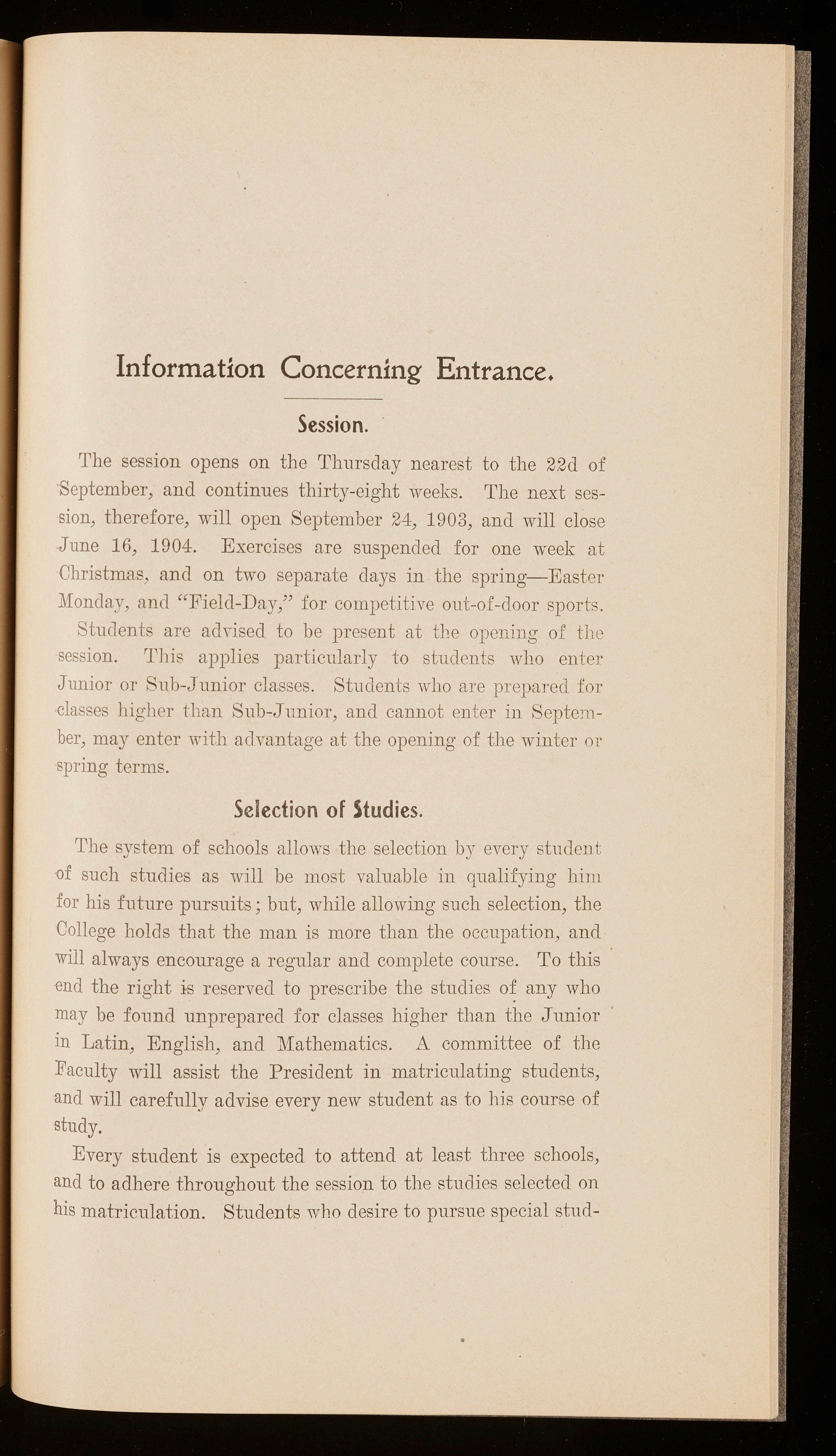
The session opens on the Thursday nearest to the 22d oJ' September, and continues thirty-eight weeks. The next session, therefore, will open September 24, 1903, and will close June 16, 1904. Exercises are suspended for one week at Chr istmas. and on two separate days in the spring-Easte1· llfonclay, and "Field-Day," for compctitiYe out-of--door sports. Stuclcnts arc achiscd to be pre sent at the opening of t hl, session. This applies particularly to stuclcnis who enter J unior or Sub-Junior classes. Student s ,d10 arc prepared for classes h igh<'r than Sub-Junior, and cannot en t er in Septe mber, may enter with advantage at the opening of the winter or spring terms.
The system oJ' schools allmrs the selection by every slndcn of such studies as will be most valuable in qualifying him for his future pursuits; but, while allowing such selection, the College holds that the man is more than the occupation, ancl will always encourage a regular and complete course. To this · encl the right i,s reserved to prescribe the studies o~ any who may be found unprepared for classes higher than the JunioT in Latin, English, and :Mathematics. A committee of the Faculty will assist the President in matriculating students, and will carefully advise every new student as to his course of study.
Every student is expected to attend at least three schools, and to adhere throughout the session to the studies selected on his matriculation. Students who desire to pursue special sh1cl-

ies in one or more schools shoul cl commu ni cate with the PrQsident.
Students are assigned to the severa l classes in a school according to their apparent attainments; but the Professor in charge of a department will, at any time, transfer a student to a higher or lower class in that department when, in his judgment, such a ch ange is desirable.
Every applicant for admission, upon arriving at the College, must report promptly to the Presiclent. If he has been a student at any other college, he should present satisfactory evidence of general good conduct while there. If he comes from an acaclemy or high school, it i s desirable that he shoulcl bring a testimonial from the principal showing what st udies he has pursued and what progress he has made.
In case of reasonable doubt whether the applic ant is prepared by his previous training to undertake collegiate work, the question will be decided by en tranc e examinations in any two that he may elect, or in all of the three Schools of English, Mathematics, and Latin. For ent eri ng the School of English the r equirem ents are "a knowl edge of Element ary English Grammar and. ability to write with grammatical correctness"; for Mathematics, "a goocl lrnowledge of Arithmetic and Element ary Algebra through Simple Equations"; for Latin, "s uch acquaintance with Latin Grammar and Vocabulary as will enable one to translate simple prose." If found well prepared in all these the applicant may enter either these schools or others; i1 prepared on two of them, but not on the third, he will be allowed to matriculate, and will be aided in securing competent instruction, if desired, in the branch on which he is deficient.
When the question of preparation for College ha s been settled ailirmativel y, and the applicant has duly subscribed to

the regulations, he will receive a permit to matriculat e, and, upon presentation of this to the Tr easurer of the College and payment of the required fees, hi s name will be placed on the rolls
For statement concerning the matriculation of women, see special announcement on "Admission of Women."
J\IATRICULATION FEE.-Includin g entrance fee, use of public rooms, attendance, and all college privileges, $20.00. Thi s fee must be paid at entrance, is not subj ect to deduction, nor in any case refunded. Students entering after the fall term pay three fourths of this fee. Those who enter for the spring term pay only half of the fee.
TUITION.-In academic schools, $70.00. Tuition has been fixed at $70.00, regardless of the mnnbci; of classes or schools taken by the student. Whenever, for special reasons, a student is permitted to take one class only, the tuition fee will be $25. The tuition fee is payable one-half on entrance, the balance first of February, subject to deduction for time lost by late entrance or by sickness, if the time so lost be two consecutive mont hs or more, but not subject to deduction for other cause or for less time.
FUEL, LIGHTS,ANDLAUNDRYcost from $2 to $2.50 a month.
BOARD.-Excellent table board is furnished at the College Refectory at a cost not exceeding $11 a month. The average cost last session was $9.50 a month. Students pay only the actual cost, estimated month by month. The Refectory is a handsome brick building, located on the campus, and is in charge of an experienced matron, appointed by the President. The seating capacity of the hall is seventy-five. Prompt payment of bills is required.
Near the College are three or four boarding houses which furnish good table board at from $10 to $12 a month, and still

RICI-IMOND COLLEGE.
others in which students can get furnished rooms, with fuel and light, for $18 to $20 a, month.
At the request of the President, severa l families have consented to receive one or more students as boarders. Charges will be from $20 to $25 a month for furnished room with 'board and servant's attendance. Names and addresses of persons willing to receive boarders will be furnished on application.
Three dormitories on the College grounds furnish lodgin gs for two hundred students. Named in order of their erection, these buildings are Robert Ryland Hall, DeLand Cottage, and Memorial Hall. All three are substantially built of brick, and were carefully designed for their present uses. Each buildin g has its own toilet-rooms and sanitary arrangements of the most improved pattern.
In order that life at College may be as home-like as possible, the occupants of each dormitory are organized at the beginning of the session into a Club, which has general oversight of affairs in the building occupied by its members. It is the business of the officers of the Club to repress loafing, boisterousness of all kinds, and in every way to promote the social well-being of its members. The Club as a whole is held responsible for the building it occupies, and damages not ind ividually accounted for are charged against members pro rata. Meetings are held whenever necessary. Students who prove themselves objectionable to their fellow-residents in any dormitory will be removed from the building upon recommend ation of the officers of the Club. There are no club fees.
Each dormitory is in charge of an experienced janitor, who puts all lodging-rooms in order once a day. He also brings water and kindles fires. This service is paid for out of matri culation fees of students . Every effort is put forth by the Col-
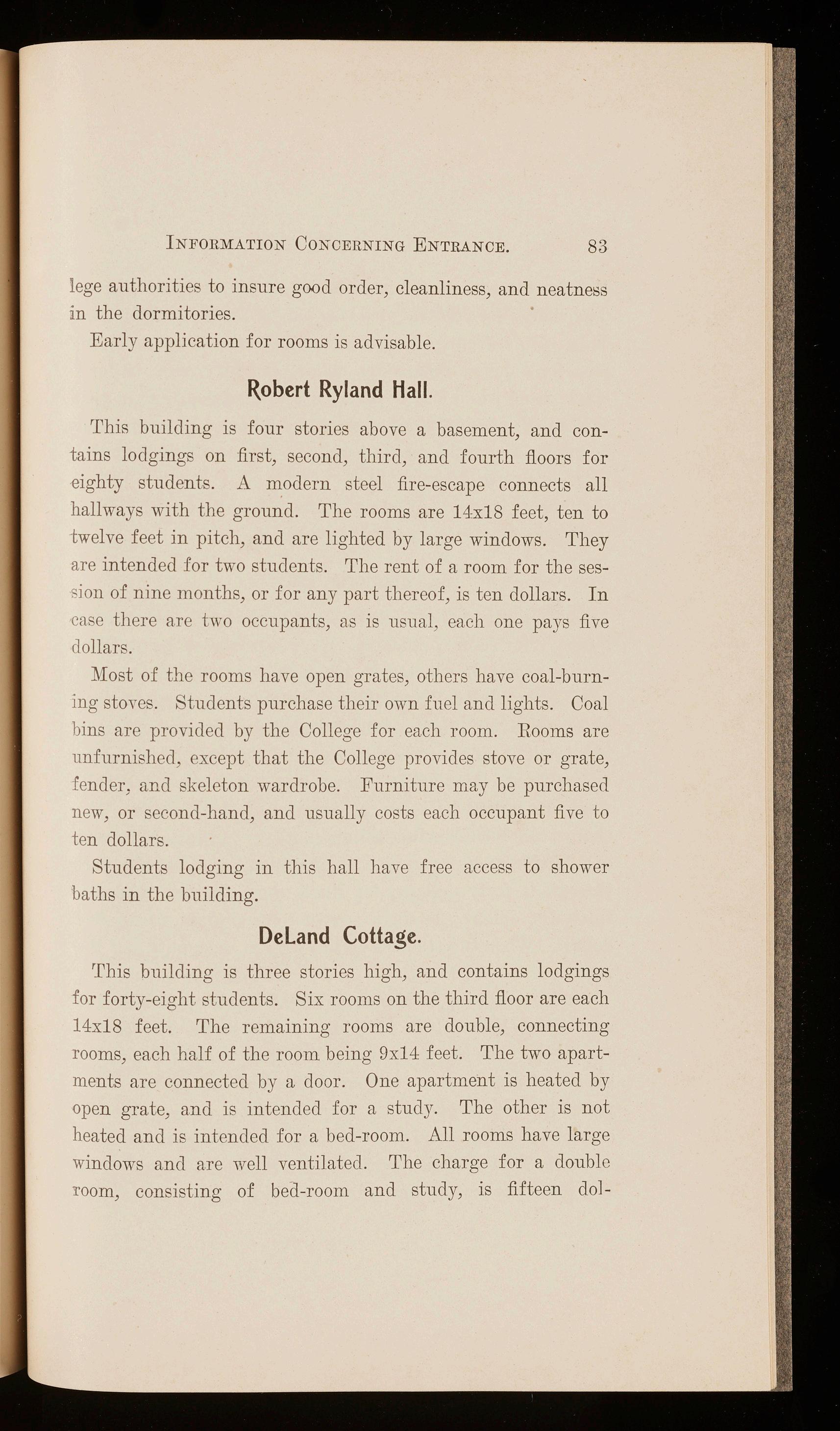
lege authorities to insure good order, cleanliness, and neatness in the dormitories.
Early application for rooms is advisable.
'l'his building is four stories above a basement, and contains lodgings on first, second, third, and fourth floors for eighty students. A modern steel fire-escape connects all hallways with the ground. The rooms are 14x18 feet, ten to -twelve feet in pitch, and are lighted by large windows. They are intended for two students. The rent of a room for the session of nine months, or for any part thereof, is ten dollars. In case there are two occupants, as is usual , each one pays five dollar s.
Most of the rooms have open grates, others have coal-burning stoYes Students purchase their own fuel and lights. Coal bins are provided by the College for each room. Rooms are unfu rnish ed, except that the College provides stove or grate, fen der, and skeleton wardrobe. Furniture may be purchased new, or second-hand, and usually costs each occupant five to te n dollars.
Students lodging in this hall have free access to shower bat hs in the building.
'l'his building is three stories high, and contains lodgings for forty-eight students. Six rooms on the third floor are each 14x18 feet. The remaining rooms are double, connecting rooms, each half of the room being 9x14 feet. The two apartments are connected by a door. One apartment is heated by open grate, and is intended for a study. The other is not heated and is intended for a bed-room. All rooms have large windows and are well ventilated. The charge for a double room, consisting of bea-room and study, is fifteen dol-
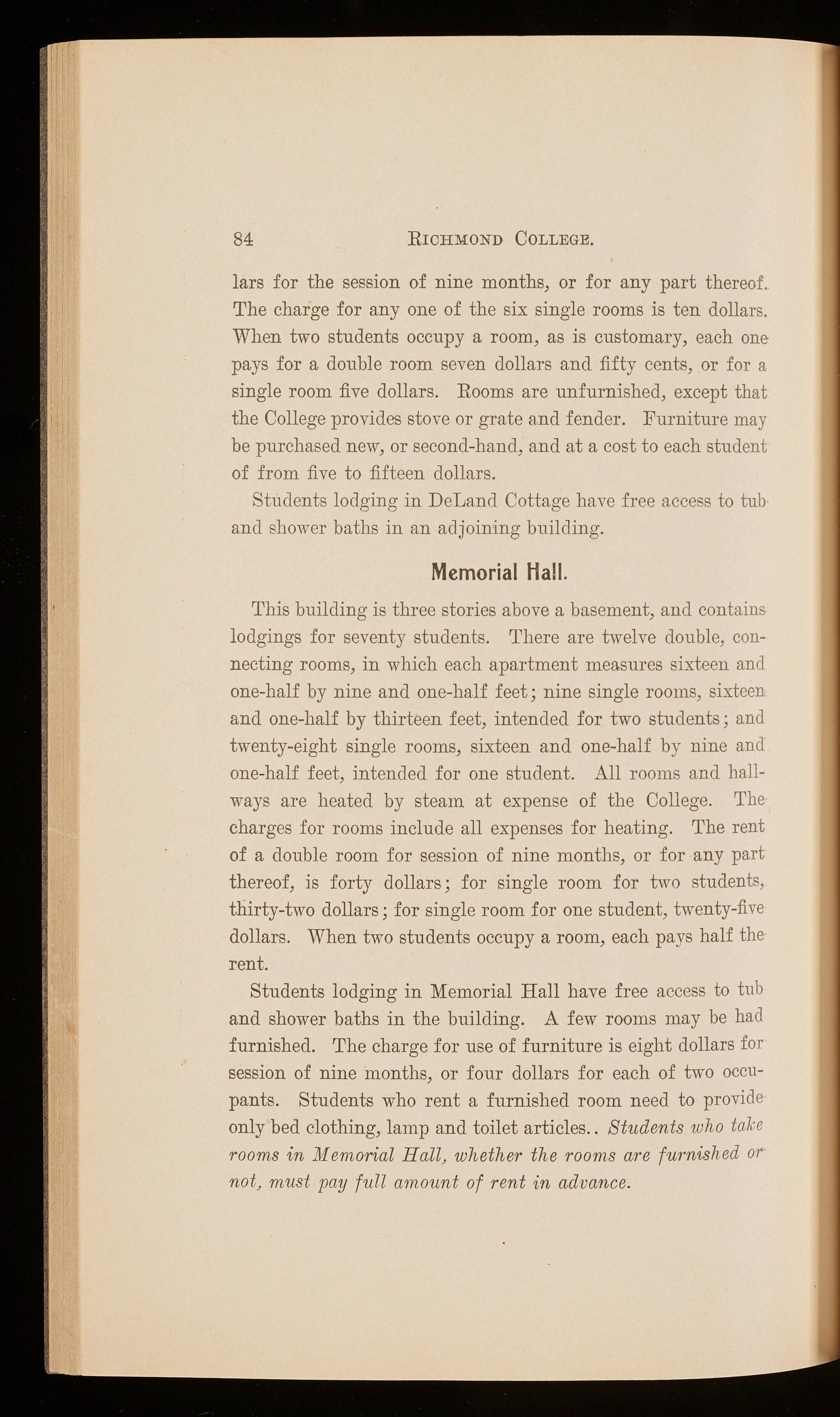
RICHMOND COLLEGE.
lars for the session of nine months, or for any part thereo f. The charge for any one of the six single rooms is ten dollars. When two students occupy a room, as is customary, each one pays for a double room seven dollars and fifty cents, or for a single room five dollars. Rooms are unfurnished, except that the College provides stoYe or grate and fender. Furniture may be purchased new, or second-hand, and at a cost to each student of from five to fifteen dollars.
Students lodging in DeLand Cottage have free access to tub and shower baths in an adjoining building.
This building is three stories above a basement, and contains lodgings for seventy students. There are twelve double, connecting rooms, in which each apartment measures sixteen and one-half by nine and one-half feet; nine single rooms, sixteen and one-half by thirteen feet, intended for two students; and twenty-eight single rooms, sixteen and one-half by nine and one-half feet, intended for one student. All rooms and hallways are heated by steam at expense of the College. The charges for rooms include all expenses for heating. The rent of a double room for session of nine months, or for any part thereof, is forty dollars; for single room for two students, thirty-two dollars; for single room for one student, twenty-five dollars. When two students occupy a room, each pays half the rent.
Students lodging in Memorial Hall have free access to tub and shower baths in the building. A few rooms may be ha d furnished. The charge for use of furniture is eight dollars for session of nine months, or four dollars for each of two occupants. Students who rent a furnished room need to provide only bed clothing, lamp and toilet articles .. Students who take rooms in Memorial Hall, whether the rooms are furnished ornot, must pay full amount of rent in advance.
Economical Estimate.
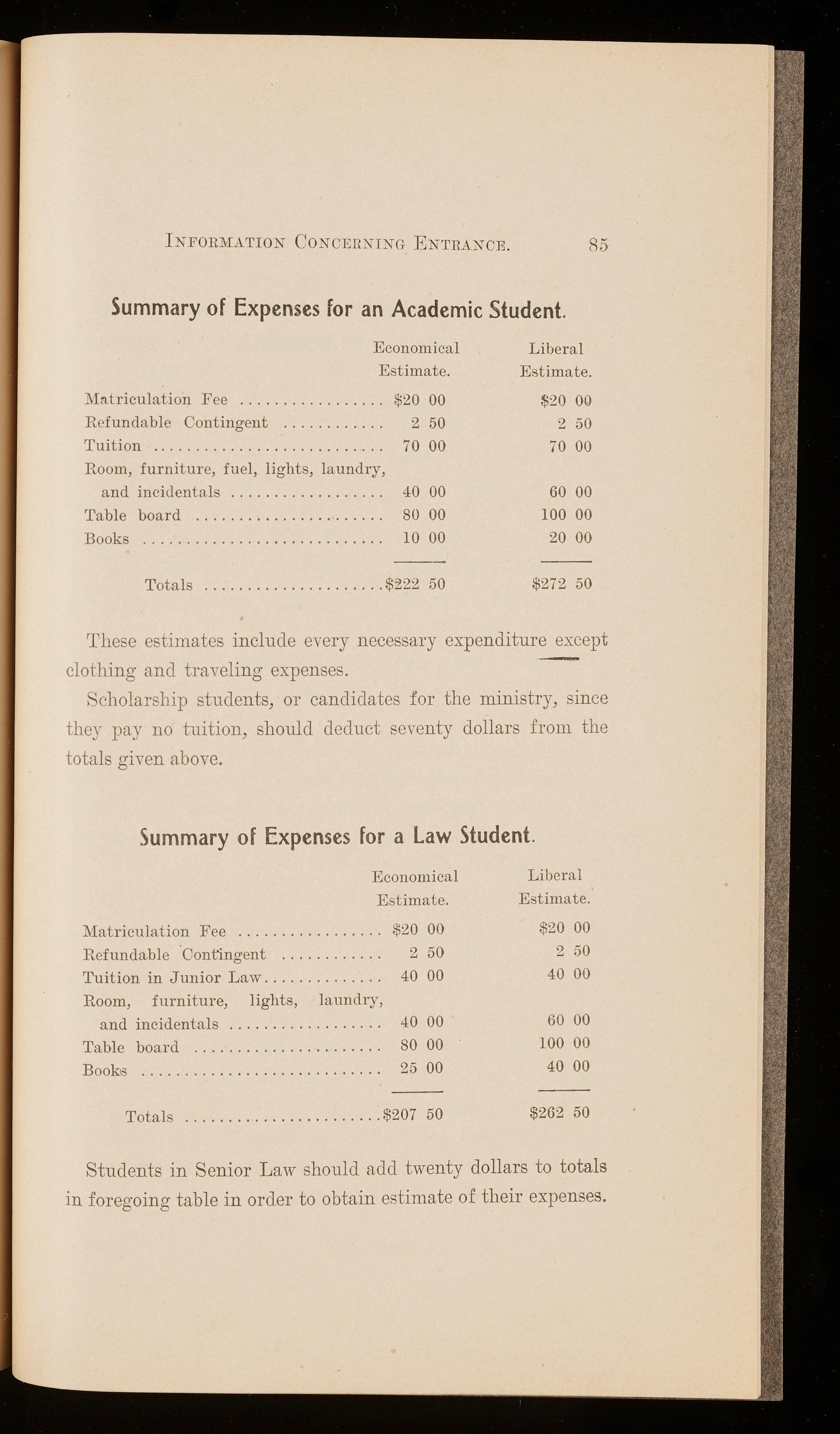
Mntriculation Fee Refundable Contingent
These estimates include eyery necessary expenditure except clothing and traYeling expenses.
Scholarship students, or candidates for the ministry, since they pay no tuition, should deduct seventy dollars from the totals gi,en above.
Economical Estimate.
Matriculation Fee
Refundable Contingent
Students in Senior Law should add twenty dollars to totals in foregoing table in order to obtain estimate of their expenses.
RICHMOND COLLEGE.
Summaryof Expensesfor an AcademicStudentwho Residesin Richmond.

00
THE MATRICULATIONFEE, THE REFUNDABLECONTINGEXT , ROOMRENT,ANDONE-HALF OF TUITIONARE PAYABLEJAT DATE OF ENTRANCE.. 'rHE SECONDHALF OF 'rUITION IS PAYABLE FEBRUARY1ST.
DIPLOMA FEES.-For every Certificate of School Diploma awarded the charge is $1. Diploma, $5.
Proficiency or For a Degr ee
Students who desire to have made out for them such Proficiencies and School Diplomas as they may win, must deposit the necessary fees with the Treasurer one week before Commencement . Students who take degrees are required to pay for their Degree Diplomas.
·LABORATORYFEES.- Students who take Chemistry or Physics are required to pay a fee of $5 for laboratory expenses in each class in either school.
REFUNDABLEDRPOSIT.-Students are required to deposit with the Treasurer $2.50 as contingent fee, to cover any damage to College property, or Library fines. This money, or such portion as the depositor may be entitled to, is returned Jul y 1st, following close of the session .
Students need not keep money about their persons or in their rooms, but may, without expense, deposit it for safe-keeping with an offker of the College .

Ministers of the Gospel, of all denominations, and young men duly approved by their churches as candidates :for the ministry, arc admitted :free o:f charge for tuition. They pay matriculation fee, and for fuel, lights, board, etc , the same with other students.
Tho Education Board of the Virginia Baptist General Association will render further assistance to worthy young men recommended by churches which contribute to the Board, and accepted after examination. For information on this matter address Hon. J. T. Ellyrnn, Corresponding Secretary, Richmond, Va.

The 'Trustees hold invested funds, the income from which is deYotcd to the aRsi8tancc of y01.mgmen who have proved themselves worthy, or who may be properly recommended, but who are not financially able to pay all College charges.
The Trustees are anxious to increase these very helpful funds, and gifts are earnestly invited.
The funcls are clivicled into Scholarships ancl Donations; the Scholarships pay tuition; the Donations pay board. They are designated as follows: Scholarships.
Tbe two Jlemorial Scholarships, $1,000 each, founded by the BaptiRt8 of Yirginia.
The Srholarsliip of the First Bapi·ist Church, Richmond, $1,000.
Tbc J osepli E. Erown Scholarship, $1,000, founded by Senator Brmrn, of Georgia .
The Brnnet Sclwlarship, $1,000, given bv Mrs. Sarah A. Brunet, Norfolk, Ya.
The Dav-idson Scholarship, $1,000, founclccl by lHrs. M. E. Davidson, Millboro Springs, Va.
The two 1Vest Scholarships, $2,500, by George B. West, Newport News, Ya.
The Fannie J,ea Ilalf Scholarship, $500, by Mr. and Mrs. Lea, of North Carolina.
rrhe A. JI Poindexter Jlalf Scholarship, $500, founded by the Dan River Baptist Association .
The Elizabeth Stetson Aid Fund, $5,000, given by John B. Stetson, or Philaclelpbia, in honor of bis wife .
Tl1e Ella Williams 8£-udrnts', t-icl Fwid,$5.000, given b:vtbe
STUDENT Arn FuNDs.
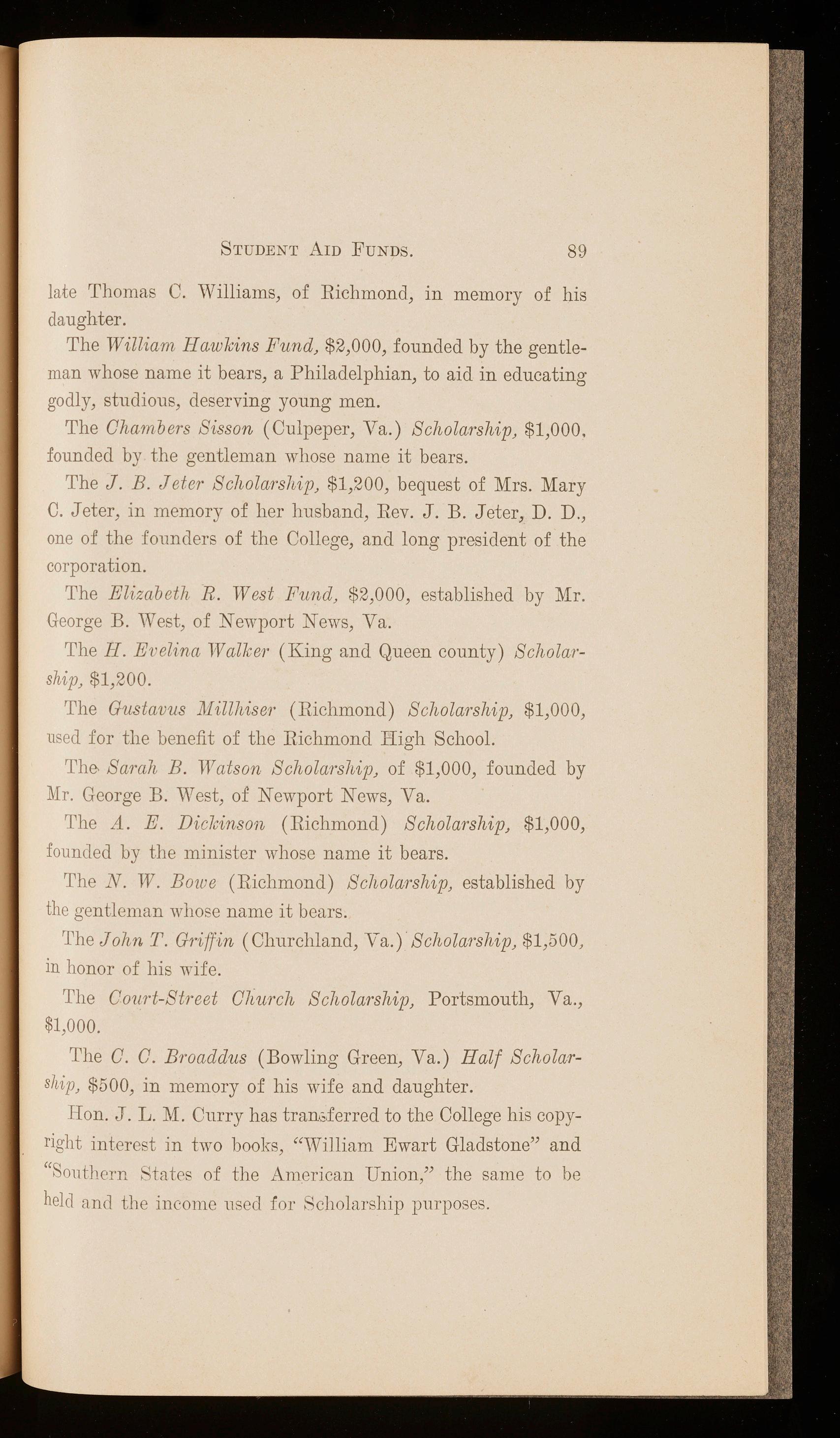
89
late Thomas C. Williams, of Richmond, m memory of his daughter .
The William Hawkins Fund, $2,000, founded by the gentleman whose name it bears, a Philadelphian, to aid in educating godly, studious, deserving young men.
The Clia111bersSisson (Culpeper, Va.) Scholarship, $1,000. founded by the gentleman whose name it bears.
The J. B. J efer Scholarship, $1,200, bequest of Mrs. Mary C. Jeter, in memory of her lrnsband, Rev. J. B. Jeter, D. D., one of the .founders of the College, and long president of the corporation .
The Elizabeth R. West Fund, $2,000, established by Mr. George B. West, of Newport News, Va.
The II. Erelina Walker (King and Queen county) Scholarship, $1,200.
'I'he Gustavus Millhiser (Richmond) Scholarship, $1,000, uscclfor the benefit of the Richmond High School.
The- Sarah B. Watson Scholarship, of $1,000, founded by Mr. George B. West, of Newport News, Va.
'l'he A. E. Dickinson (Richmond) Scholarship, $1,000, founded by the minister "·hose name it bears.
The N. 1V. Bowe (Richmond) Scholarship, established by the gentleman whose name it bears.
'I'he John T. Griffin (Churchland, Ya.) Scholarship, $1,500, in honor of his "\\·iie.
'l'he 0o11rt-Street 0liurch Scholarship, Portsmouth, Va., $1,000.
The 0. 0. Broaddus (Bowling Green, Va.) Half Scholarship, $500, in memory of his wife and daughter.
!Ton. J. L. M. Curry has trnn~ierred to the College hi s copyright interest in two books, "William Ewart Gladstone" and "SonthC'rn , tatr,: of the American Union," the same to be held and ihe inc-ome used for Scholar,;hip pmposes.
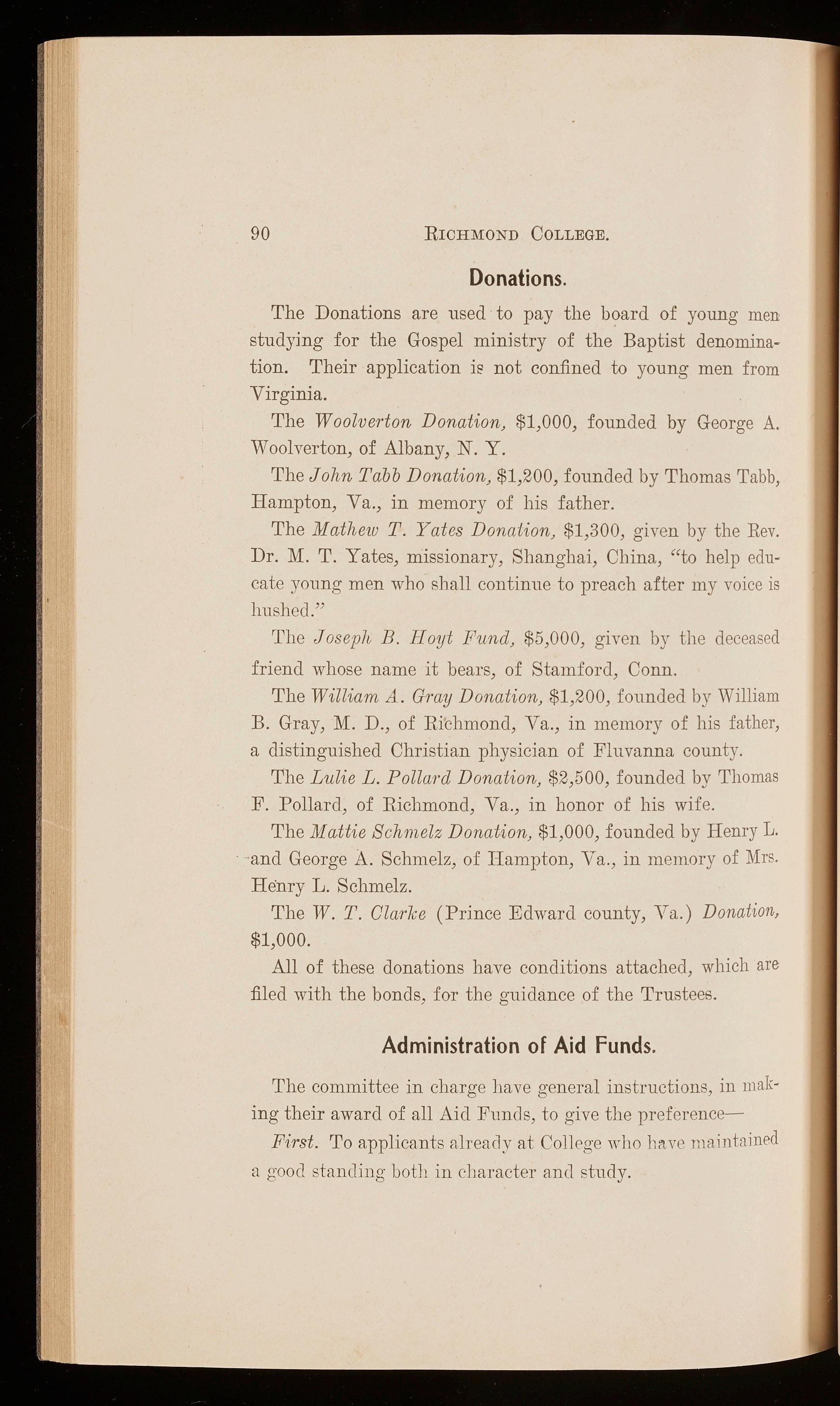
RICHMOND COLLEGE.
The Donations are used to pay the board of young men studying for the Gospel ministry of the Baptist denomination. Their application i~ not confined to young men from Virginia.
The Woolverton Donation, $1,000, founded by George A. Woolverton, of Albany, N. Y.
The John Tabb Donation, $1,200, founded by Thomas Tabb, Hampton, Va., in memory of his father.
The Mathew T. Yates Donation, $1,300, given by the Rev. Dr. M. T. Yates, missionary, Shanghai, China, "to help educate yolmg men who shall continue to preach after my voice is hushed."
The Joseph B. Hoyt Fund, $5,000, given by the deceased friend whose name it bears, of Stamford, Conn.
The William A. Gray Donation, $1,200, founded by William B. Gray, M. D., of Richmond, Va., in memory of his father, a distinguished Christian physician of Fluvanna county.
The Lulie L. Pollard Donation, $2,500, founded by Thomas F. Pollard, of Richmond, Va., in honor of his wife.
The Mattie Schmelz Donation, $1,000, founded by Henry L. and George A. Schmelz, of Hampton, Va., in memory of Mrs. Henry L. Schmelz.
The W. T. Olarlce (Prince Edward county, Va.) Donation, $1,000.
All of these donations have conditions attached, which are filed with the bonds, for the guidance of the Trustees.
The committee in charge have general instructions, in making their award of all Aid Funcls, to give the preferenceFirst. To applicants nheacl_v::i.tCollege "·ho hnvc maintained a good standing both in character and st udy.

Secondly To other applicants who shall present satisfactory testimonia ls from the school last attended, or from other persons who have had opportunity to judge, certifying to their health, attainments, habits of study, and moral character.
Thirdly. To those of either class who give reasonable as$urance that they will complete a course of study leading to one of the degrees of the College.
The recipients of aid are expected to prove, as students, not only above censure in all respects, but actively helpful to the College by example and by earnest work.
The awards will be at· all times subject to revision by the Trustees, who reserve tlie right to withdraw the privilege at any time on account of neglect of duty, serious misconduct, or failure to maintain an average standing of at least eighty per cent. in three schools.
These Aid Funds are awarded annually by a committee of the Trustees, which meets the first week in July. Applications for aid should be made to the President of the College, who will send blank forms to be filled up and returned.
1:10 2:00 --Latin, Jun. German, Jun. 1, ngl1sl1, Sen. Latin, Jun. German, Jun.Literature. Latin, Jun. German, Jun. English, sen. Latin, Jun. German, Jun. Literature. Latin. Jun. German, Jun . English, sen. Literature. ti1 IIl z z '5
Math., Subj. English, Jun. I Greek, Subj. Latin, Subj. I
Phil., Hen. French, Jun. Greek, Jun. Greek, sen. Phys., Jun. Latin, Int. History, Jun. llistory, Sen. Cllem., Jun. Pllil., Jun. History, Int. English, Int. -Phys., Sen. Math., Jun. Math., Subj. English, Jun. Greek, Subj. Latin. Subj. I Pl1ys., Jun. Gree!<, Int. Frencn, Jun. nreek, Jun. I Phil., Jot. J:-hil., Jun. German, 8en. History, Jun. Latin, Sen. Math., lot. I French, Sen History, Int. chent. sen. -Math., Sen I Math., Jun. I Math., Subj. English, Jun. Greek, Snbj. Latin, t--Ub., Phil., Sen. Phil., Jun. Latin, Int. French, Jun. Greek, Jun. I Greek, Sen. Frencl1, Sen. German, Sen. History, Jun. History, sen. Chem., Jun. Astronomy. History, Int. English, Int . IPhys., Sen.
THURSDAY. j::: 0 IIl-A FRIDAY.. I I ISATURDAY CLASS SCHEDULE, SESSION t903-t904. !J:00 !):50 10:40 11 :30 12:20MaU1., Sen. Math., ,Tun
8:40-MONDAY .. I TUESDAY. • I cri Ill (/J ------u IIl
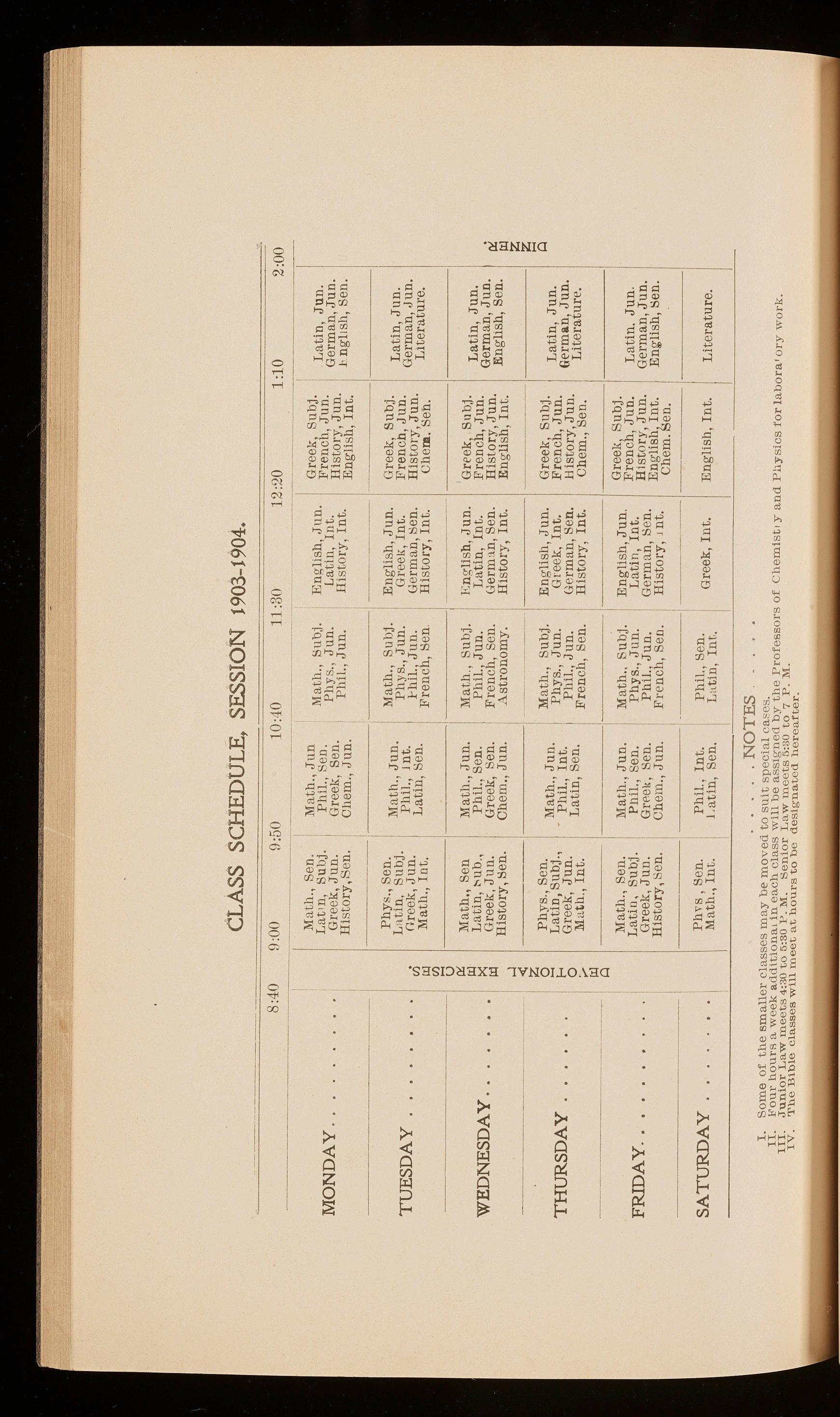
Math., Subj. English, Jun. Greek, Subj. Math., Jun. I Latin, Subj.,Pili!., Int. Pllys., Jun. I G1eek, Int. French, Jun. Greek, Jun. Latin, Sen. Pllil., Jun. German, Sen. History, Jun. Muth., Int. French, sen. History, Int. Chem., Sen. i Math., Sen. Matll., Jun. Math., Subj. English, Jun. Gree!<, Subj. Latin, Subj. Pllil., Sen. Phys., Jun. Latin, Int. French, Jun. G reek, Jun. Gr8ek, Sen. Pili!., Jun. German, Sen. Histor.v, Jun. History, sen. Chem., Jun. French, Sen. History, , nt. E<fif~~'.'i,~~~I --Pllvs, Sen. Phil., Int. Phil., Sen. Greek, Int. English, Int. Math., Int. Latin, Sen. Latin, Int ,. . . . . .
WEDNESDAY .. :><: IIl ,-l ----<z 0
I. Some of tlle smaller classes may be moved to suit special ca~es . II. lfour hours a week a.ddltiona1 in eacll class will be assign eel by the Professors of Cllemtst, y and Pl1.ysics for labora 1 o ry work.
III. Junior Law meets 4:30 to 5:30 P. M. Senior Law meets 5:30 to 7 P. M. IV. rrhe Bible classes will meet at hours to be designated here a fter.
Admission of Women
Admission, Terms of Aid Funds.
Alun ,'li, Society of Astro• 1om.,,, . Athletic Association
Bequest, Form of .. Boarding Arrangements
Calendar
Charte r ........
Chem ist ry, Schoo l of. Commence ment. Committees, Trustees .. ('ou rscs of Instruction Degrees Diplomas and Certificates . Discipline Donations
Endow ment.
Englis h , School of Examinations
Expenses Faculty, Li st of. French Geology
German ..
Greek, Sch ool of Grounds and Buildings History ..... Instructors
Latin, Schoo l of. L,w Association
Law, Schoo l of Law Prizes .. .
Lect ur ers ... .
Lectu res, Thomas . .
Lecture•, University Extension. Library .....
Literary Societies
Literat ur e
Location .....
Mathema tics, School of Matric ul at ion
Medals .......•....
Medalists, Society
Ministe rs and Candidates
Moot Cou rt

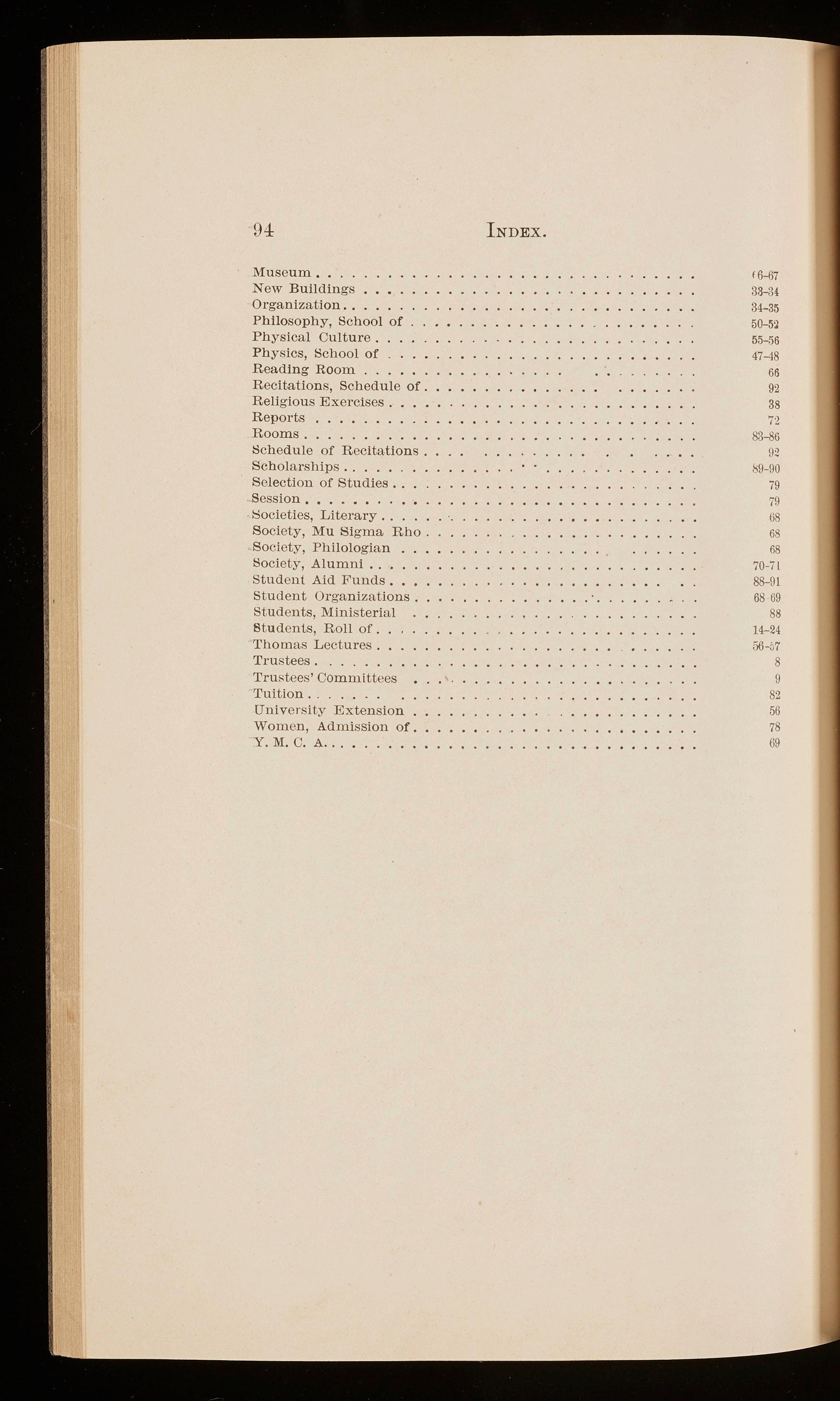
Museum New Buildings Organization . . Philosophy, School of Physical Culture. Physics, School of Reading Room . . Recitations, Schedule of. Religious Exercises Reports . Rooms
Schedule of Recitations . Scholarships ..... Selection of Studies Session ••..• , l:;ocieties, Literary ..
Soci ety, Mu Sigma Rbo. Soci ety, Philologian Society, Alumni ..... Student Aid Funds .. , Student Organizations . Students, Ministerial Students, Roll of. Thoma s Lectures ... Tru stees Trustees' Committees Tuition .. University Extension Wom en, Admission of, Y.M.C. A ........ .
